Famous people on Worldwide's street names
back
reverse
filter
Saint Joseph
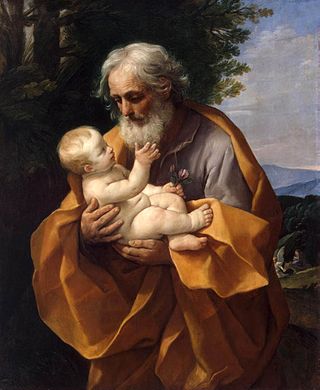 31
Joseph was a 1st-century Jewish man of Nazareth who, according to the canonical Gospels, was married to Mary, the mother of Jesus, and was the legal father of Jesus.
31
Joseph was a 1st-century Jewish man of Nazareth who, according to the canonical Gospels, was married to Mary, the mother of Jesus, and was the legal father of Jesus.
Saint George
 30
Saint George, also George of Lydda, was an early Christian martyr who is venerated as a saint in Christianity. According to tradition, he was a soldier in the Roman army. Of Cappadocian Greek origin, he became a member of the Praetorian Guard for Roman emperor Diocletian, but was sentenced to death for refusing to recant his Christian faith. He became one of the most venerated saints, heroes and megalomartyrs in Christianity, and he has been especially venerated as a military saint since the Crusades. He is respected by Christians, Druze, as well as some Muslims as a martyr of monotheistic faith.
30
Saint George, also George of Lydda, was an early Christian martyr who is venerated as a saint in Christianity. According to tradition, he was a soldier in the Roman army. Of Cappadocian Greek origin, he became a member of the Praetorian Guard for Roman emperor Diocletian, but was sentenced to death for refusing to recant his Christian faith. He became one of the most venerated saints, heroes and megalomartyrs in Christianity, and he has been especially venerated as a military saint since the Crusades. He is respected by Christians, Druze, as well as some Muslims as a martyr of monotheistic faith.
Michael (archangel)
 28
Michael, also called Saint Michael the Archangel, Archangel Michael and Saint Michael the Taxiarch is an archangel in Judaism, Christianity, Islam, and the Baha'i faith. The earliest surviving mentions of his name are in third- and second-century-BC Jewish works, often but not always apocalyptic, where he is the chief of the angels and archangels, and he is the guardian prince of Israel and is responsible for the care of Israel. Christianity conserved nearly all the Jewish traditions concerning him, and he is mentioned explicitly in Revelation 12:7–12, where he does battle with Satan, and in the Epistle of Jude, where the author denounces heretics by contrasting them with Michael.
28
Michael, also called Saint Michael the Archangel, Archangel Michael and Saint Michael the Taxiarch is an archangel in Judaism, Christianity, Islam, and the Baha'i faith. The earliest surviving mentions of his name are in third- and second-century-BC Jewish works, often but not always apocalyptic, where he is the chief of the angels and archangels, and he is the guardian prince of Israel and is responsible for the care of Israel. Christianity conserved nearly all the Jewish traditions concerning him, and he is mentioned explicitly in Revelation 12:7–12, where he does battle with Satan, and in the Epistle of Jude, where the author denounces heretics by contrasting them with Michael.
Francis of Assisi
 28
Giovanni di Pietro di Bernardone, known as Francis of Assisi, was an Italian mystic, poet and Catholic friar who founded the religious order of the Franciscans. He was inspired to lead a Christian life of poverty as a beggar and itinerant preacher. One of the most venerated figures in Christianity, Francis was canonized by Pope Gregory IX on 16 July 1228. He is commonly portrayed wearing a brown habit with a rope tied around his waist, featuring three knots that symbolize the three Franciscan vows of poverty, chastity, and obedience.
28
Giovanni di Pietro di Bernardone, known as Francis of Assisi, was an Italian mystic, poet and Catholic friar who founded the religious order of the Franciscans. He was inspired to lead a Christian life of poverty as a beggar and itinerant preacher. One of the most venerated figures in Christianity, Francis was canonized by Pope Gregory IX on 16 July 1228. He is commonly portrayed wearing a brown habit with a rope tied around his waist, featuring three knots that symbolize the three Franciscan vows of poverty, chastity, and obedience.
Anthony of Padua
 27
Anthony of Padua, OFM or Anthony of Lisbon was a Portuguese Catholic priest and friar of the Franciscan Order.
27
Anthony of Padua, OFM or Anthony of Lisbon was a Portuguese Catholic priest and friar of the Franciscan Order.
Saint Anne
 26
According to apocrypha, as well as Christian and Islamic tradition, Saint Anne was the mother of Mary, the wife of Joachim and the maternal grandmother of Jesus. Mary's mother is not named in the Bible's canonical gospels. In writing, Anne's name and that of her husband Joachim come only from New Testament apocrypha, of which the Gospel of James seems to be the earliest that mentions them.
The mother of Mary is mentioned but not named in the Quran.
26
According to apocrypha, as well as Christian and Islamic tradition, Saint Anne was the mother of Mary, the wife of Joachim and the maternal grandmother of Jesus. Mary's mother is not named in the Bible's canonical gospels. In writing, Anne's name and that of her husband Joachim come only from New Testament apocrypha, of which the Gospel of James seems to be the earliest that mentions them.
The mother of Mary is mentioned but not named in the Quran.
Saint Peter
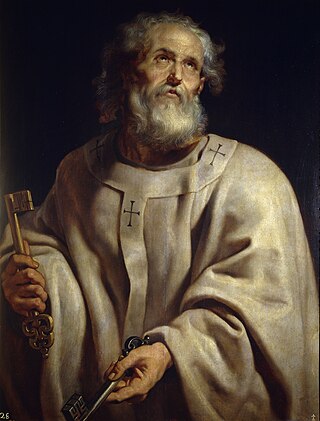 26
Saint Peter, also known as Peter the Apostle, Simon Peter, Simeon, Simon, or Cephas, was one of the Twelve Apostles of Jesus Christ and one of the first leaders of the early Christian Church. He appears repeatedly and prominently in all four New Testament gospels as well as the Acts of the Apostles. Catholic tradition accredits Peter as the first bishop of Rome—or pope—and also as the first bishop of Antioch.
26
Saint Peter, also known as Peter the Apostle, Simon Peter, Simeon, Simon, or Cephas, was one of the Twelve Apostles of Jesus Christ and one of the first leaders of the early Christian Church. He appears repeatedly and prominently in all four New Testament gospels as well as the Acts of the Apostles. Catholic tradition accredits Peter as the first bishop of Rome—or pope—and also as the first bishop of Antioch.
John the Baptist
 26
John the Baptist was a Jewish preacher active in the area of the Jordan River in the early 1st century AD. He is also known as Saint John the Forerunner in Eastern Orthodoxy, John the Immerser in some Baptist Christian traditions, Saint John by certain Catholic churches, and Prophet Yahya in Islam. He is sometimes alternatively referred to as John the Baptiser.
26
John the Baptist was a Jewish preacher active in the area of the Jordan River in the early 1st century AD. He is also known as Saint John the Forerunner in Eastern Orthodoxy, John the Immerser in some Baptist Christian traditions, Saint John by certain Catholic churches, and Prophet Yahya in Islam. He is sometimes alternatively referred to as John the Baptiser.
Saint Nicholas
 25
Saint Nicholas of Myra, also known as Nicholas of Bari, was an early Christian bishop of Greek descent from the maritime city of Patara in Anatolia during the time of the Roman Empire. Because of the many miracles attributed to his intercession, he is also known as Nicholas the Wonderworker. Saint Nicholas is the patron saint of sailors, merchants, archers, repentant thieves, children, brewers, pawnbrokers, toymakers, unmarried people, and students in various cities and countries around Europe. His reputation evolved among the pious, as was common for early Christian saints, and his legendary habit of secret gift-giving gave rise to the traditional model of Santa Claus through Sinterklaas.
25
Saint Nicholas of Myra, also known as Nicholas of Bari, was an early Christian bishop of Greek descent from the maritime city of Patara in Anatolia during the time of the Roman Empire. Because of the many miracles attributed to his intercession, he is also known as Nicholas the Wonderworker. Saint Nicholas is the patron saint of sailors, merchants, archers, repentant thieves, children, brewers, pawnbrokers, toymakers, unmarried people, and students in various cities and countries around Europe. His reputation evolved among the pious, as was common for early Christian saints, and his legendary habit of secret gift-giving gave rise to the traditional model of Santa Claus through Sinterklaas.
Mary, mother of Jesus
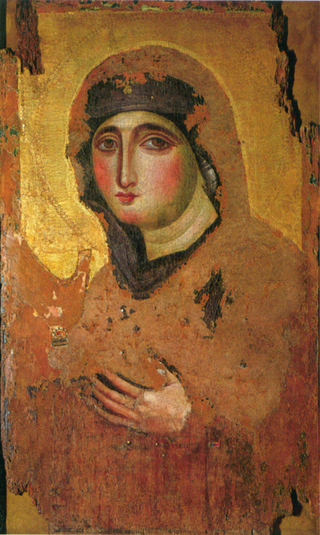 25
Mary was a first-century Jewish woman of Nazareth, the wife of Joseph and the mother of Jesus. She is a central figure of Christianity, venerated under various titles such as virgin or queen, many of them mentioned in the Litany of Loreto. The Eastern and Oriental Orthodox, Church of the East, Catholic, Anglican, and Lutheran churches believe that Mary, as mother of Jesus, is the Mother of God. Other Protestant views on Mary vary, with some holding her to have lesser status.
25
Mary was a first-century Jewish woman of Nazareth, the wife of Joseph and the mother of Jesus. She is a central figure of Christianity, venerated under various titles such as virgin or queen, many of them mentioned in the Litany of Loreto. The Eastern and Oriental Orthodox, Church of the East, Catholic, Anglican, and Lutheran churches believe that Mary, as mother of Jesus, is the Mother of God. Other Protestant views on Mary vary, with some holding her to have lesser status.
Christopher Columbus
 24
Christopher Columbus was an Italian explorer and navigator from the Republic of Genoa who completed four Spanish-based voyages across the Atlantic Ocean sponsored by the Catholic Monarchs, opening the way for the widespread European exploration and European colonization of the Americas. His expeditions were the first known European contact with the Caribbean and Central and South America.
24
Christopher Columbus was an Italian explorer and navigator from the Republic of Genoa who completed four Spanish-based voyages across the Atlantic Ocean sponsored by the Catholic Monarchs, opening the way for the widespread European exploration and European colonization of the Americas. His expeditions were the first known European contact with the Caribbean and Central and South America.
John F. Kennedy
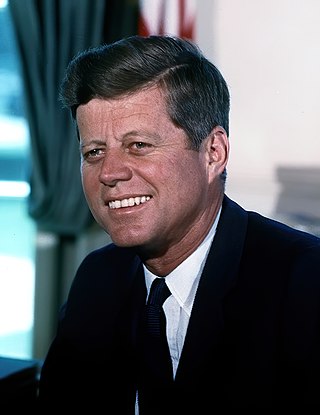 23
John Fitzgerald Kennedy, often referred to as JFK, was an American politician who served as the 35th president of the United States from 1961 until his assassination in 1963. He was the youngest person elected president. Kennedy served at the height of the Cold War, and the majority of his foreign policy concerned relations with the Soviet Union and Cuba. A Democrat, Kennedy represented Massachusetts in both houses of the United States Congress prior to his presidency.
23
John Fitzgerald Kennedy, often referred to as JFK, was an American politician who served as the 35th president of the United States from 1961 until his assassination in 1963. He was the youngest person elected president. Kennedy served at the height of the Cold War, and the majority of his foreign policy concerned relations with the Soviet Union and Cuba. A Democrat, Kennedy represented Massachusetts in both houses of the United States Congress prior to his presidency.
Louis Pasteur
 23
Louis Pasteur was a French chemist, pharmacist, and microbiologist renowned for his discoveries of the principles of vaccination, microbial fermentation, and pasteurization, the last of which was named after him. His research in chemistry led to remarkable breakthroughs in the understanding of the causes and preventions of diseases, which laid down the foundations of hygiene, public health and much of modern medicine. Pasteur's works are credited with saving millions of lives through the developments of vaccines for rabies and anthrax. He is regarded as one of the founders of modern bacteriology and has been honored as the "father of bacteriology" and the "father of microbiology".
23
Louis Pasteur was a French chemist, pharmacist, and microbiologist renowned for his discoveries of the principles of vaccination, microbial fermentation, and pasteurization, the last of which was named after him. His research in chemistry led to remarkable breakthroughs in the understanding of the causes and preventions of diseases, which laid down the foundations of hygiene, public health and much of modern medicine. Pasteur's works are credited with saving millions of lives through the developments of vaccines for rabies and anthrax. He is regarded as one of the founders of modern bacteriology and has been honored as the "father of bacteriology" and the "father of microbiology".
Andrew the Apostle
 22
Andrew the Apostle, also called Saint Andrew, was an apostle of Jesus. According to the New Testament, he was a fisherman and one of the Twelve Apostles chosen by Jesus. The title First-Called stems from the Gospel of John, where Andrew, initially a disciple of John the Baptist, follows Jesus and, recognizing him as the Messiah, introduces his brother Simon Peter to him.
22
Andrew the Apostle, also called Saint Andrew, was an apostle of Jesus. According to the New Testament, he was a fisherman and one of the Twelve Apostles chosen by Jesus. The title First-Called stems from the Gospel of John, where Andrew, initially a disciple of John the Baptist, follows Jesus and, recognizing him as the Messiah, introduces his brother Simon Peter to him.
Yuri Gagarin
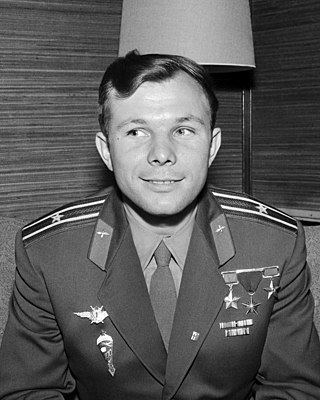 21
Yuri Alekseyevich Gagarin was a Soviet pilot and cosmonaut who, aboard the first successful crewed spaceflight, became the first human to journey into outer space. Travelling on Vostok 1, Gagarin completed one orbit of Earth on 12 April 1961, with his flight taking 108 minutes. By achieving this major milestone for the Soviet Union amidst the Space Race, he became an international celebrity and was awarded many medals and titles, including the nation's highest distinction: Hero of the Soviet Union.
21
Yuri Alekseyevich Gagarin was a Soviet pilot and cosmonaut who, aboard the first successful crewed spaceflight, became the first human to journey into outer space. Travelling on Vostok 1, Gagarin completed one orbit of Earth on 12 April 1961, with his flight taking 108 minutes. By achieving this major milestone for the Soviet Union amidst the Space Race, he became an international celebrity and was awarded many medals and titles, including the nation's highest distinction: Hero of the Soviet Union.
Simón Bolívar
 20
Simón José Antonio de la Santísima Trinidad Bolívar Palacios Ponte y Blanco was a Venezuelan military and political leader who led what are currently the countries of Colombia, Venezuela, Ecuador, Peru, Panama, and Bolivia to independence from the Spanish Empire. He is known colloquially as El Libertador, or the Liberator of America.
20
Simón José Antonio de la Santísima Trinidad Bolívar Palacios Ponte y Blanco was a Venezuelan military and political leader who led what are currently the countries of Colombia, Venezuela, Ecuador, Peru, Panama, and Bolivia to independence from the Spanish Empire. He is known colloquially as El Libertador, or the Liberator of America.
Saint Lawrence
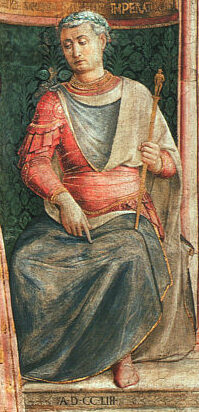 20
Saint Lawrence or Laurence was one of the seven deacons of the city of Rome under Pope Sixtus II who were martyred in the persecution of the Christians that the Roman Emperor Valerian ordered in 258.
20
Saint Lawrence or Laurence was one of the seven deacons of the city of Rome under Pope Sixtus II who were martyred in the persecution of the Christians that the Roman Emperor Valerian ordered in 258.
Franklin D. Roosevelt
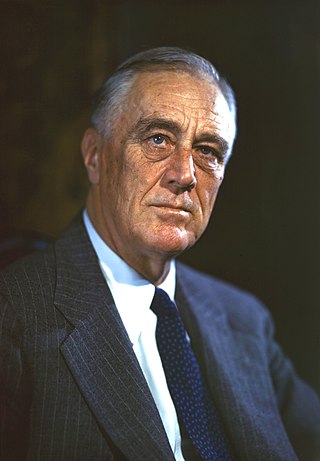 19
Franklin Delano Roosevelt, commonly known by his initials FDR, was an American statesman and politician who served as the 32nd president of the United States from 1933 until his death in 1945. He was a member of the Democratic Party and is the only U.S. president to have served more than two terms. His initial two terms were centered on combating the Great Depression, while his third and fourth saw him shift his focus to America's involvement in World War II.
19
Franklin Delano Roosevelt, commonly known by his initials FDR, was an American statesman and politician who served as the 32nd president of the United States from 1933 until his death in 1945. He was a member of the Democratic Party and is the only U.S. president to have served more than two terms. His initial two terms were centered on combating the Great Depression, while his third and fourth saw him shift his focus to America's involvement in World War II.
Thomas Edison
 19
Thomas Alva Edison was an American inventor and businessman. He developed many devices in fields such as electric power generation, mass communication, sound recording, and motion pictures. These inventions, which include the phonograph, the motion picture camera, and early versions of the electric light bulb, have had a widespread impact on the modern industrialized world. He was one of the first inventors to apply the principles of organized science and teamwork to the process of invention, working with many researchers and employees. He established the first industrial research laboratory.
19
Thomas Alva Edison was an American inventor and businessman. He developed many devices in fields such as electric power generation, mass communication, sound recording, and motion pictures. These inventions, which include the phonograph, the motion picture camera, and early versions of the electric light bulb, have had a widespread impact on the modern industrialized world. He was one of the first inventors to apply the principles of organized science and teamwork to the process of invention, working with many researchers and employees. He established the first industrial research laboratory.
George Washington
 18
George Washington was an American Founding Father, military officer, and politician who served as the first president of the United States from 1789 to 1797. Appointed by the Second Continental Congress as commander of the Continental Army in 1775, Washington led Patriot forces to victory in the American Revolutionary War and then served as president of the Constitutional Convention in 1787, which drafted and ratified the Constitution of the United States and established the U.S. federal government. Washington has thus become commonly known as the "Father of his Country".
18
George Washington was an American Founding Father, military officer, and politician who served as the first president of the United States from 1789 to 1797. Appointed by the Second Continental Congress as commander of the Continental Army in 1775, Washington led Patriot forces to victory in the American Revolutionary War and then served as president of the Constitutional Convention in 1787, which drafted and ratified the Constitution of the United States and established the U.S. federal government. Washington has thus become commonly known as the "Father of his Country".
Pope John Paul II
 18
Pope John Paul II was head of the Catholic Church and sovereign of the Vatican City State from 1978 until his death in 2005.
18
Pope John Paul II was head of the Catholic Church and sovereign of the Vatican City State from 1978 until his death in 2005.
Mark the Evangelist
 17
Mark the Evangelist also known as John Mark or Saint Mark, is the person who is traditionally ascribed to be the author of the Gospel of Mark. Modern Bible scholars have concluded that the Gospel of Mark was written by an anonymous author rather than an identifiable historical figure. According to Church tradition, Mark founded the episcopal see of Alexandria, which was one of the five most important sees of early Christianity. His feast day is celebrated on April 25, and his symbol is the winged lion.
17
Mark the Evangelist also known as John Mark or Saint Mark, is the person who is traditionally ascribed to be the author of the Gospel of Mark. Modern Bible scholars have concluded that the Gospel of Mark was written by an anonymous author rather than an identifiable historical figure. According to Church tradition, Mark founded the episcopal see of Alexandria, which was one of the five most important sees of early Christianity. His feast day is celebrated on April 25, and his symbol is the winged lion.
John Bosco
 17
John Melchior Bosco, SDB, popularly known as Don Bosco, was an Italian Catholic priest, educator and writer of the 19th century. While working in Turin, where the population suffered many of the ill effects of industrialization and urbanization, he dedicated his life to the betterment and education of street children, juvenile delinquents, and other disadvantaged youth. He developed teaching methods based on love rather than punishment, a method that became known as the Salesian Preventive System.
17
John Melchior Bosco, SDB, popularly known as Don Bosco, was an Italian Catholic priest, educator and writer of the 19th century. While working in Turin, where the population suffered many of the ill effects of industrialization and urbanization, he dedicated his life to the betterment and education of street children, juvenile delinquents, and other disadvantaged youth. He developed teaching methods based on love rather than punishment, a method that became known as the Salesian Preventive System.
James the Great
 16
James the Great was one of the Twelve Apostles of Jesus. According to the New Testament, he was the second of the apostles to die, and the first to be martyred. Saint James is the patron saint of Spain and, according to tradition, his remains are held in Santiago de Compostela in Galicia.
16
James the Great was one of the Twelve Apostles of Jesus. According to the New Testament, he was the second of the apostles to die, and the first to be martyred. Saint James is the patron saint of Spain and, according to tradition, his remains are held in Santiago de Compostela in Galicia.
Alexander Pushkin
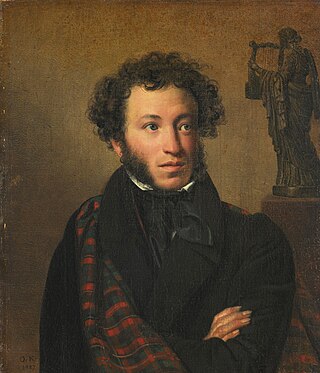 16
Alexander Sergeyevich Pushkin was a Russian poet, playwright, and novelist of the Romantic era. He is considered by many to be the greatest Russian poet, as well as the founder of modern Russian literature.
16
Alexander Sergeyevich Pushkin was a Russian poet, playwright, and novelist of the Romantic era. He is considered by many to be the greatest Russian poet, as well as the founder of modern Russian literature.
Albert Einstein
 16
Albert Einstein was a German-born theoretical physicist who is widely held to be one of the greatest and most influential scientists of all time. Best known for developing the theory of relativity, Einstein also made important contributions to quantum mechanics, and was thus a central figure in the revolutionary reshaping of the scientific understanding of nature that modern physics accomplished in the first decades of the twentieth century. His mass–energy equivalence formula E = mc2, which arises from relativity theory, has been called "the world's most famous equation". He received the 1921 Nobel Prize in Physics "for his services to theoretical physics, and especially for his discovery of the law of the photoelectric effect", a pivotal step in the development of quantum theory. His work is also known for its influence on the philosophy of science. In a 1999 poll of 130 leading physicists worldwide by the British journal Physics World, Einstein was ranked the greatest physicist of all time. His intellectual achievements and originality have made the word Einstein broadly synonymous with genius.
16
Albert Einstein was a German-born theoretical physicist who is widely held to be one of the greatest and most influential scientists of all time. Best known for developing the theory of relativity, Einstein also made important contributions to quantum mechanics, and was thus a central figure in the revolutionary reshaping of the scientific understanding of nature that modern physics accomplished in the first decades of the twentieth century. His mass–energy equivalence formula E = mc2, which arises from relativity theory, has been called "the world's most famous equation". He received the 1921 Nobel Prize in Physics "for his services to theoretical physics, and especially for his discovery of the law of the photoelectric effect", a pivotal step in the development of quantum theory. His work is also known for its influence on the philosophy of science. In a 1999 poll of 130 leading physicists worldwide by the British journal Physics World, Einstein was ranked the greatest physicist of all time. His intellectual achievements and originality have made the word Einstein broadly synonymous with genius.
Saint Sebastian
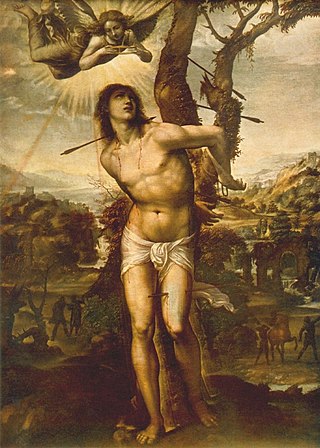 16
Sebastian was an early Christian saint and martyr. According to traditional belief, he was killed during the Diocletianic Persecution of Christians. He was initially tied to a post or tree and shot with arrows, though this did not kill him. He was, according to tradition, rescued and healed by Irene of Rome, which became a popular subject in 17th-century painting. In all versions of the story, shortly after his recovery he went to Diocletian to warn him about his sins, and as a result was clubbed to death. He is venerated in the Catholic Church and the Orthodox Church.
16
Sebastian was an early Christian saint and martyr. According to traditional belief, he was killed during the Diocletianic Persecution of Christians. He was initially tied to a post or tree and shot with arrows, though this did not kill him. He was, according to tradition, rescued and healed by Irene of Rome, which became a popular subject in 17th-century painting. In all versions of the story, shortly after his recovery he went to Diocletian to warn him about his sins, and as a result was clubbed to death. He is venerated in the Catholic Church and the Orthodox Church.
Saint Roch
 16
Roch, also called Rock in English, was a Majorcan Catholic confessor whose death is commemorated on 16 August and 9 September in Italy; he was especially invoked against the plague. He has the designation of Rollox in Glasgow, Scotland, said to be a corruption of Roch's Loch, which referred to a small loch once near a chapel dedicated to Roch in 1506.
16
Roch, also called Rock in English, was a Majorcan Catholic confessor whose death is commemorated on 16 August and 9 September in Italy; he was especially invoked against the plague. He has the designation of Rollox in Glasgow, Scotland, said to be a corruption of Roch's Loch, which referred to a small loch once near a chapel dedicated to Roch in 1506.
Jesus
 16
Jesus, also referred to as Jesus Christ, Jesus of Nazareth, and many other names and titles, was a first-century Jewish preacher and religious leader. He is the central figure of Christianity, the world's largest religion. Most Christians believe Jesus to be the incarnation of God the Son and the awaited messiah, the Christ that is prophesied in the Old Testament.
16
Jesus, also referred to as Jesus Christ, Jesus of Nazareth, and many other names and titles, was a first-century Jewish preacher and religious leader. He is the central figure of Christianity, the world's largest religion. Most Christians believe Jesus to be the incarnation of God the Son and the awaited messiah, the Christ that is prophesied in the Old Testament.
Martin of Tours
 15
Martin of Tours, also known as Martin the Merciful, was the third bishop of Tours. He has become one of the most familiar and recognizable Christian saints in France, heralded as the patron saint of the Third Republic, and is patron saint of many communities and organizations across Europe. A native of Pannonia, he converted to Christianity at a young age. He served in the Roman cavalry in Gaul, but left military service at some point prior to 361, when he became a disciple of Hilary of Poitiers, establishing the monastery at Ligugé. He was consecrated as Bishop of Caesarodunum (Tours) in 371. As bishop, he was active in the suppression of the remnants of Gallo-Roman religion, but he opposed the violent persecution of the Priscillianist sect of ascetics.
15
Martin of Tours, also known as Martin the Merciful, was the third bishop of Tours. He has become one of the most familiar and recognizable Christian saints in France, heralded as the patron saint of the Third Republic, and is patron saint of many communities and organizations across Europe. A native of Pannonia, he converted to Christianity at a young age. He served in the Roman cavalry in Gaul, but left military service at some point prior to 361, when he became a disciple of Hilary of Poitiers, establishing the monastery at Ligugé. He was consecrated as Bishop of Caesarodunum (Tours) in 371. As bishop, he was active in the suppression of the remnants of Gallo-Roman religion, but he opposed the violent persecution of the Priscillianist sect of ascetics.
Winston Churchill
 15
Sir Winston Leonard Spencer Churchill was a British statesman, soldier, and writer who twice served as Prime Minister of the United Kingdom, from 1940 to 1945 during the Second World War, and again from 1951 to 1955. Apart from two years between 1922 and 1924, he was a Member of Parliament (MP) from 1900 to 1964 and represented a total of five constituencies. Ideologically an adherent to economic liberalism and imperialism, he was for most of his career a member of the Conservative Party, which he led from 1940 to 1955. He was a member of the Liberal Party from 1904 to 1924.
15
Sir Winston Leonard Spencer Churchill was a British statesman, soldier, and writer who twice served as Prime Minister of the United Kingdom, from 1940 to 1945 during the Second World War, and again from 1951 to 1955. Apart from two years between 1922 and 1924, he was a Member of Parliament (MP) from 1900 to 1964 and represented a total of five constituencies. Ideologically an adherent to economic liberalism and imperialism, he was for most of his career a member of the Conservative Party, which he led from 1940 to 1955. He was a member of the Liberal Party from 1904 to 1924.
Ludwig van Beethoven
 15
Ludwig van Beethoven was a German composer and pianist. He is one of the most revered figures in the history of Western music; his works rank among the most performed of the classical music repertoire and span the transition from the Classical period to the Romantic era in classical music. Beethoven's career has conventionally been divided into early, middle, and late periods. His early period, during which he forged his craft, is typically considered to have lasted until 1802. From 1802 to around 1812, his middle period showed an individual development from the styles of Joseph Haydn and Wolfgang Amadeus Mozart, and is sometimes characterized as heroic. During this time, he began to grow increasingly deaf. In his late period, from 1812 to 1827, he extended his innovations in musical form and expression.
15
Ludwig van Beethoven was a German composer and pianist. He is one of the most revered figures in the history of Western music; his works rank among the most performed of the classical music repertoire and span the transition from the Classical period to the Romantic era in classical music. Beethoven's career has conventionally been divided into early, middle, and late periods. His early period, during which he forged his craft, is typically considered to have lasted until 1802. From 1802 to around 1812, his middle period showed an individual development from the styles of Joseph Haydn and Wolfgang Amadeus Mozart, and is sometimes characterized as heroic. During this time, he began to grow increasingly deaf. In his late period, from 1812 to 1827, he extended his innovations in musical form and expression.
Paul the Apostle
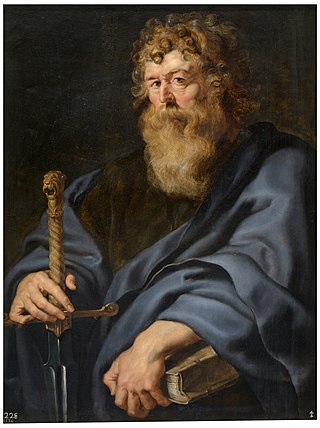 15
Paul, commonly known as Paul the Apostle and Saint Paul, was a Christian apostle who spread the teachings of Jesus in the first-century world. For his contributions towards the New Testament, he is generally regarded as one of the most important figures of the Apostolic Age, and he also founded several Christian communities in Asia Minor and Europe from the mid-40s to the mid-50s AD.
15
Paul, commonly known as Paul the Apostle and Saint Paul, was a Christian apostle who spread the teachings of Jesus in the first-century world. For his contributions towards the New Testament, he is generally regarded as one of the most important figures of the Apostolic Age, and he also founded several Christian communities in Asia Minor and Europe from the mid-40s to the mid-50s AD.
Nelson Mandela
 14
Nelson Rolihlahla Mandela was a South African anti-apartheid activist, politician, and statesman who served as the first president of South Africa from 1994 to 1999. He was the country's first black head of state and the first elected in a fully representative democratic election. His government focused on dismantling the legacy of apartheid by fostering racial reconciliation. Ideologically an African nationalist and socialist, he served as the president of the African National Congress (ANC) party from 1991 to 1997.
14
Nelson Rolihlahla Mandela was a South African anti-apartheid activist, politician, and statesman who served as the first president of South Africa from 1994 to 1999. He was the country's first black head of state and the first elected in a fully representative democratic election. His government focused on dismantling the legacy of apartheid by fostering racial reconciliation. Ideologically an African nationalist and socialist, he served as the president of the African National Congress (ANC) party from 1991 to 1997.
Leo Tolstoy
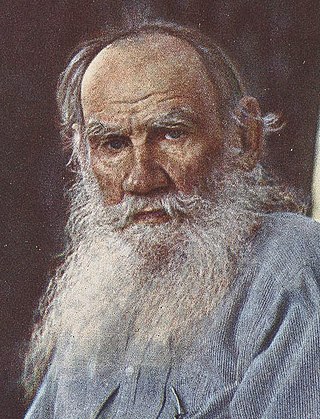 14
Count Lev Nikolayevich Tolstoy, usually referred to in English as Leo Tolstoy, was a Russian writer. He is regarded as one of the greatest and most influential authors of all time. He received nominations for the Nobel Prize in Literature every year from 1902 to 1906 and for the Nobel Peace Prize in 1901, 1902, and 1909.
14
Count Lev Nikolayevich Tolstoy, usually referred to in English as Leo Tolstoy, was a Russian writer. He is regarded as one of the greatest and most influential authors of all time. He received nominations for the Nobel Prize in Literature every year from 1902 to 1906 and for the Nobel Peace Prize in 1901, 1902, and 1909.
Wolfgang Amadeus Mozart
 14
Wolfgang Amadeus Mozart was a prolific and influential composer of the Classical period. Despite his short life, his rapid pace of composition resulted in more than 800 works representing virtually every Western classical genre of his time. Many of these compositions are acknowledged as pinnacles of the symphonic, concertante, chamber, operatic, and choral repertoire. Mozart is widely regarded as being one of the greatest composers in the history of Western music, with his music admired for its "melodic beauty, its formal elegance and its richness of harmony and texture".
14
Wolfgang Amadeus Mozart was a prolific and influential composer of the Classical period. Despite his short life, his rapid pace of composition resulted in more than 800 works representing virtually every Western classical genre of his time. Many of these compositions are acknowledged as pinnacles of the symphonic, concertante, chamber, operatic, and choral repertoire. Mozart is widely regarded as being one of the greatest composers in the history of Western music, with his music admired for its "melodic beauty, its formal elegance and its richness of harmony and texture".
Augustine of Hippo
 14
Augustine of Hippo, also known as Saint Augustine, was a theologian and philosopher of Berber origin and the bishop of Hippo Regius in Numidia, Roman North Africa. His writings influenced the development of Western philosophy and Western Christianity, and he is viewed as one of the most important Church Fathers of the Latin Church in the Patristic Period. His many important works include The City of God, On Christian Doctrine, and Confessions.
14
Augustine of Hippo, also known as Saint Augustine, was a theologian and philosopher of Berber origin and the bishop of Hippo Regius in Numidia, Roman North Africa. His writings influenced the development of Western philosophy and Western Christianity, and he is viewed as one of the most important Church Fathers of the Latin Church in the Patristic Period. His many important works include The City of God, On Christian Doctrine, and Confessions.
Ferdinand Magellan
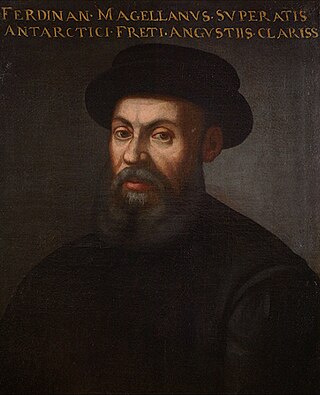 14
Ferdinand Magellan was a Portuguese explorer best known for having planned and led the 1519 Spanish expedition to the East Indies across the Pacific Ocean to open a maritime trade route, during which he discovered the interoceanic passage thereafter bearing his name and achieved the first European navigation to Asia via the Pacific. After his death, this expedition was the first to circumnavigate the globe in 1519–22 in the service of Spain.
14
Ferdinand Magellan was a Portuguese explorer best known for having planned and led the 1519 Spanish expedition to the East Indies across the Pacific Ocean to open a maritime trade route, during which he discovered the interoceanic passage thereafter bearing his name and achieved the first European navigation to Asia via the Pacific. After his death, this expedition was the first to circumnavigate the globe in 1519–22 in the service of Spain.
Saint Cecilia
 13
Saint Cecilia, also spelled Cecelia, was a Roman virgin martyr and is venerated in Catholic, Orthodox, Anglican, and some Lutheran churches, such as the Church of Sweden. She became the patroness of music and musicians, it being written that, as the musicians played at her wedding, Cecilia "sang in her heart to the Lord". Musical compositions are dedicated to her, and her feast, on 22 November, is the occasion of concerts and musical festivals. She is also known as Cecilia of Rome.
13
Saint Cecilia, also spelled Cecelia, was a Roman virgin martyr and is venerated in Catholic, Orthodox, Anglican, and some Lutheran churches, such as the Church of Sweden. She became the patroness of music and musicians, it being written that, as the musicians played at her wedding, Cecilia "sang in her heart to the Lord". Musical compositions are dedicated to her, and her feast, on 22 November, is the occasion of concerts and musical festivals. She is also known as Cecilia of Rome.
Maxim Gorky
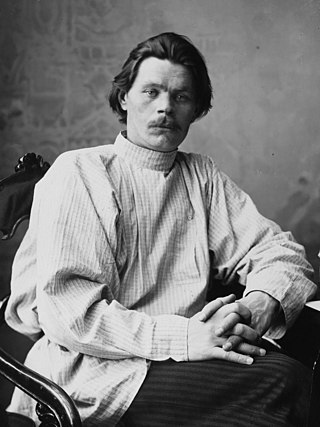 13
Alexei Maximovich Peshkov, popularly known as Maxim Gorky, was a Russian and Soviet writer and socialism proponent. He was nominated five times for the Nobel Prize in Literature. Before his success as an author, he travelled widely across the Russian Empire changing jobs frequently, experiences which would later influence his writing.
13
Alexei Maximovich Peshkov, popularly known as Maxim Gorky, was a Russian and Soviet writer and socialism proponent. He was nominated five times for the Nobel Prize in Literature. Before his success as an author, he travelled widely across the Russian Empire changing jobs frequently, experiences which would later influence his writing.
Karl Marx
 13
Karl Marx was a German-born philosopher, economist, political theorist, historian, sociologist, journalist, and revolutionary socialist. His best-known works are the 1848 pamphlet The Communist Manifesto and the three-volume Das Kapital (1867–1894); the latter employs his critical approach of historical materialism in an analysis of capitalism and is the culmination of his intellectual efforts. Marx's ideas and theories and their subsequent development, collectively known as Marxism, have exerted enormous influence on modern intellectual, economic and political history.
13
Karl Marx was a German-born philosopher, economist, political theorist, historian, sociologist, journalist, and revolutionary socialist. His best-known works are the 1848 pamphlet The Communist Manifesto and the three-volume Das Kapital (1867–1894); the latter employs his critical approach of historical materialism in an analysis of capitalism and is the culmination of his intellectual efforts. Marx's ideas and theories and their subsequent development, collectively known as Marxism, have exerted enormous influence on modern intellectual, economic and political history.
Marie Curie
 13
Maria Salomea Skłodowska-Curie, known simply as Marie Curie, was a Polish and naturalised-French physicist and chemist who conducted pioneering research on radioactivity. She was the first woman to win a Nobel Prize, the first person to win a Nobel Prize twice, and the only person to win a Nobel Prize in two scientific fields. Her husband, Pierre Curie, was a co-winner of her first Nobel Prize, making them the first-ever married couple to win the Nobel Prize and launching the Curie family legacy of five Nobel Prizes. She was, in 1906, the first woman to become a professor at the University of Paris.
13
Maria Salomea Skłodowska-Curie, known simply as Marie Curie, was a Polish and naturalised-French physicist and chemist who conducted pioneering research on radioactivity. She was the first woman to win a Nobel Prize, the first person to win a Nobel Prize twice, and the only person to win a Nobel Prize in two scientific fields. Her husband, Pierre Curie, was a co-winner of her first Nobel Prize, making them the first-ever married couple to win the Nobel Prize and launching the Curie family legacy of five Nobel Prizes. She was, in 1906, the first woman to become a professor at the University of Paris.
Charles Darwin
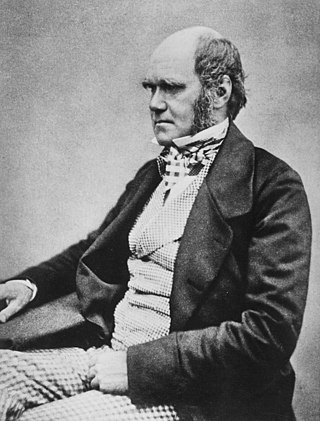 13
Charles Robert Darwin was an English naturalist, geologist and biologist, widely known for his contributions to evolutionary biology. His proposition that all species of life have descended from a common ancestor is now generally accepted and considered a fundamental concept in science. In a joint publication with Alfred Russel Wallace, he introduced his scientific theory that this branching pattern of evolution resulted from a process he called natural selection, in which the struggle for existence has a similar effect to the artificial selection involved in selective breeding. Darwin has been described as one of the most influential figures in human history and was honoured by burial in Westminster Abbey.
13
Charles Robert Darwin was an English naturalist, geologist and biologist, widely known for his contributions to evolutionary biology. His proposition that all species of life have descended from a common ancestor is now generally accepted and considered a fundamental concept in science. In a joint publication with Alfred Russel Wallace, he introduced his scientific theory that this branching pattern of evolution resulted from a process he called natural selection, in which the struggle for existence has a similar effect to the artificial selection involved in selective breeding. Darwin has been described as one of the most influential figures in human history and was honoured by burial in Westminster Abbey.
Guglielmo Marconi
 13
Guglielmo Giovanni Maria Marconi, 1st Marquis of Marconi was an Italian inventor and electrical engineer, known for his creation of a practical radio wave–based wireless telegraph system. This led to Marconi's being credited as the inventor of radio, and he shared the 1909 Nobel Prize in Physics with Karl Ferdinand Braun "in recognition of their contributions to the development of wireless telegraphy".
13
Guglielmo Giovanni Maria Marconi, 1st Marquis of Marconi was an Italian inventor and electrical engineer, known for his creation of a practical radio wave–based wireless telegraph system. This led to Marconi's being credited as the inventor of radio, and he shared the 1909 Nobel Prize in Physics with Karl Ferdinand Braun "in recognition of their contributions to the development of wireless telegraphy".
Victor Hugo
 13
Victor-Marie Hugo, vicomte Hugo, sometimes nicknamed the Ocean Man, was a French Romantic writer and politician. During a literary career that spanned more than sixty years, he wrote in a variety of genres and forms.
13
Victor-Marie Hugo, vicomte Hugo, sometimes nicknamed the Ocean Man, was a French Romantic writer and politician. During a literary career that spanned more than sixty years, he wrote in a variety of genres and forms.
Catherine of Alexandria
 12
Catherine of Alexandria, also spelled Katherine is, according to tradition, a Christian saint and virgin, who was martyred in the early fourth century at the hands of the emperor Maxentius. According to her hagiography, she was both a princess and a noted scholar who became a Christian around the age of 14, converted hundreds of people to Christianity and was martyred around the age of 18. More than 1,100 years after Catherine's martyrdom, Joan of Arc identified her as one of the saints who appeared to and counselled her.
12
Catherine of Alexandria, also spelled Katherine is, according to tradition, a Christian saint and virgin, who was martyred in the early fourth century at the hands of the emperor Maxentius. According to her hagiography, she was both a princess and a noted scholar who became a Christian around the age of 14, converted hundreds of people to Christianity and was martyred around the age of 18. More than 1,100 years after Catherine's martyrdom, Joan of Arc identified her as one of the saints who appeared to and counselled her.
Saint Barbara
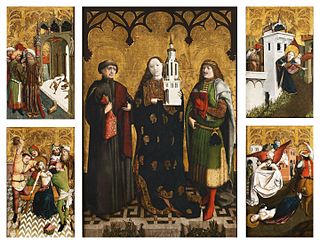 12
Saint Barbara, known in the Eastern Orthodox Church as the Great Martyr Barbara, was an early Christian Greek saint and martyr.
12
Saint Barbara, known in the Eastern Orthodox Church as the Great Martyr Barbara, was an early Christian Greek saint and martyr.
Vladimir Lenin
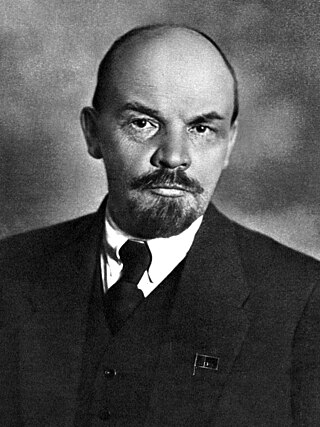 12
Vladimir Ilyich Ulyanov, better known as Vladimir Lenin, was a Russian revolutionary, politician, and political theorist. He served as the first and founding head of government of the Russian Soviet Federative Socialist Republic from 1917 until his death in 1924, and of the Soviet Union from 1922 until his death. Under his administration, Russia, and later the Soviet Union, became a one-party socialist state governed by the Communist Party. Ideologically a Marxist, his developments to the ideology are called Leninism.
12
Vladimir Ilyich Ulyanov, better known as Vladimir Lenin, was a Russian revolutionary, politician, and political theorist. He served as the first and founding head of government of the Russian Soviet Federative Socialist Republic from 1917 until his death in 1924, and of the Soviet Union from 1922 until his death. Under his administration, Russia, and later the Soviet Union, became a one-party socialist state governed by the Communist Party. Ideologically a Marxist, his developments to the ideology are called Leninism.
Nikola Tesla
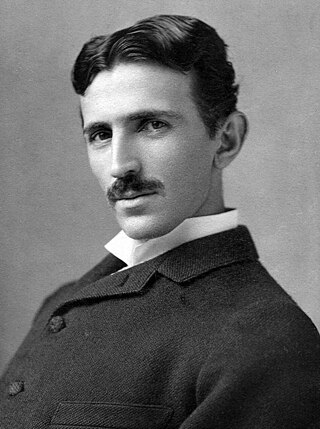 12
Nikola Tesla was a Serbian-American inventor, electrical engineer, mechanical engineer, and futurist. He is known for his contributions to the design of the modern alternating current (AC) electricity supply system.
12
Nikola Tesla was a Serbian-American inventor, electrical engineer, mechanical engineer, and futurist. He is known for his contributions to the design of the modern alternating current (AC) electricity supply system.
Alfred Nobel
 12
Alfred Bernhard Nobel was a Swedish chemist, inventor, engineer and businessman. He is known for inventing dynamite as well as having bequeathed his fortune to establish the Nobel Prize. He also made several important contributions to science, holding 355 patents in his lifetime.
12
Alfred Bernhard Nobel was a Swedish chemist, inventor, engineer and businessman. He is known for inventing dynamite as well as having bequeathed his fortune to establish the Nobel Prize. He also made several important contributions to science, holding 355 patents in his lifetime.
Saint Stephen
 12
Stephen is traditionally venerated as the protomartyr or first martyr of Christianity. According to the Acts of the Apostles, he was a deacon in the early church at Jerusalem who angered members of various synagogues by his teachings. Accused of blasphemy at his trial, he made a speech denouncing the Jewish authorities who were sitting in judgment on him and was then stoned to death. Saul of Tarsus, later known as Paul the Apostle, a Pharisee and Roman citizen who would later become an apostle, participated in Stephen's martyrdom.
12
Stephen is traditionally venerated as the protomartyr or first martyr of Christianity. According to the Acts of the Apostles, he was a deacon in the early church at Jerusalem who angered members of various synagogues by his teachings. Accused of blasphemy at his trial, he made a speech denouncing the Jewish authorities who were sitting in judgment on him and was then stoned to death. Saul of Tarsus, later known as Paul the Apostle, a Pharisee and Roman citizen who would later become an apostle, participated in Stephen's martyrdom.
Galileo Galilei
 12
Galileo di Vincenzo Bonaiuti de' Galilei, commonly referred to as Galileo Galilei or simply Galileo, was an Italian astronomer, physicist and engineer, sometimes described as a polymath. He was born in the city of Pisa, then part of the Duchy of Florence. Galileo has been called the father of observational astronomy, modern-era classical physics, the scientific method, and modern science.
12
Galileo di Vincenzo Bonaiuti de' Galilei, commonly referred to as Galileo Galilei or simply Galileo, was an Italian astronomer, physicist and engineer, sometimes described as a polymath. He was born in the city of Pisa, then part of the Duchy of Florence. Galileo has been called the father of observational astronomy, modern-era classical physics, the scientific method, and modern science.
Johann Sebastian Bach
 12
Johann Sebastian Bach was a German composer and musician of the late Baroque period. He is known for his prolific authorship of music across a variety of instruments and forms, including; orchestral music such as the Brandenburg Concertos; solo instrumental works such as the cello suites and sonatas and partitas for solo violin; keyboard works such as the Goldberg Variations and The Well-Tempered Clavier; organ works such as the Schubler Chorales and the Toccata and Fugue in D minor; and choral works such as the St Matthew Passion and the Mass in B minor. Since the 19th-century Bach Revival, he has been generally regarded as one of the greatest composers in the history of Western music.
12
Johann Sebastian Bach was a German composer and musician of the late Baroque period. He is known for his prolific authorship of music across a variety of instruments and forms, including; orchestral music such as the Brandenburg Concertos; solo instrumental works such as the cello suites and sonatas and partitas for solo violin; keyboard works such as the Goldberg Variations and The Well-Tempered Clavier; organ works such as the Schubler Chorales and the Toccata and Fugue in D minor; and choral works such as the St Matthew Passion and the Mass in B minor. Since the 19th-century Bach Revival, he has been generally regarded as one of the greatest composers in the history of Western music.
Abraham Lincoln
 12
Abraham Lincoln was an American lawyer, politician, and statesman, who served as the 16th president of the United States, from 1861 until his assassination in 1865. Lincoln led the United States through the American Civil War, defending the nation as a constitutional union, defeating the insurgent Confederacy, playing a major role in the abolition of slavery, expanding the power of the federal government, and modernizing the U.S. economy.
12
Abraham Lincoln was an American lawyer, politician, and statesman, who served as the 16th president of the United States, from 1861 until his assassination in 1865. Lincoln led the United States through the American Civil War, defending the nation as a constitutional union, defeating the insurgent Confederacy, playing a major role in the abolition of slavery, expanding the power of the federal government, and modernizing the U.S. economy.
Saint Dominic
 12
Saint Dominic,, also known as Dominic de Guzmán, was a Castilian Catholic priest and the founder of the Dominican Order. He is the patron saint of astronomers and natural scientists, and he and his order are traditionally credited with spreading and popularizing the rosary. He is alternatively called Dominic of Osma, Dominic of Caleruega, and Domingo Félix de Guzmán.
12
Saint Dominic,, also known as Dominic de Guzmán, was a Castilian Catholic priest and the founder of the Dominican Order. He is the patron saint of astronomers and natural scientists, and he and his order are traditionally credited with spreading and popularizing the rosary. He is alternatively called Dominic of Osma, Dominic of Caleruega, and Domingo Félix de Guzmán.
Giuseppe Garibaldi
 12
Giuseppe Maria Garibaldi was an Italian general, patriot, revolutionary and republican. He contributed to Italian unification (Risorgimento) and the creation of the Kingdom of Italy. He is considered to be one of Italy's "fathers of the fatherland", along with Camillo Benso, Count of Cavour, Victor Emmanuel II of Italy and Giuseppe Mazzini. Garibaldi is also known as the "Hero of the Two Worlds" because of his military enterprises in South America and Europe.
12
Giuseppe Maria Garibaldi was an Italian general, patriot, revolutionary and republican. He contributed to Italian unification (Risorgimento) and the creation of the Kingdom of Italy. He is considered to be one of Italy's "fathers of the fatherland", along with Camillo Benso, Count of Cavour, Victor Emmanuel II of Italy and Giuseppe Mazzini. Garibaldi is also known as the "Hero of the Two Worlds" because of his military enterprises in South America and Europe.
Rose of Lima
 12
Rose of Lima, TOSD was a member of the Third Order of Saint Dominic in Lima, Peru, who became known for both her life of severe penance and her care of the poverty stricken of the city through her own private efforts. Rose of Lima was born to a noble family and is the patron saint of embroidery, gardening and cultivation of blooming flowers. A lay member of the Dominican Order, she was declared a saint by the Catholic Church, being the first person born in the Americas to be canonized as such.
12
Rose of Lima, TOSD was a member of the Third Order of Saint Dominic in Lima, Peru, who became known for both her life of severe penance and her care of the poverty stricken of the city through her own private efforts. Rose of Lima was born to a noble family and is the patron saint of embroidery, gardening and cultivation of blooming flowers. A lay member of the Dominican Order, she was declared a saint by the Catholic Church, being the first person born in the Americas to be canonized as such.
José de San Martín
 12
José Francisco de San Martín y Matorras, nicknamed "the Liberator of Argentina, Chile and Peru", was an Argentine general and the primary leader of the southern and central parts of South America's successful struggle for independence from the Spanish Empire who served as the Protector of Peru. Born in Yapeyú, Corrientes, in modern-day Argentina, he left the Viceroyalty of the Río de la Plata at the early age of seven to study in Málaga, Spain.
12
José Francisco de San Martín y Matorras, nicknamed "the Liberator of Argentina, Chile and Peru", was an Argentine general and the primary leader of the southern and central parts of South America's successful struggle for independence from the Spanish Empire who served as the Protector of Peru. Born in Yapeyú, Corrientes, in modern-day Argentina, he left the Viceroyalty of the Río de la Plata at the early age of seven to study in Málaga, Spain.
Frédéric Chopin
 11
Frédéric François Chopin was a Polish composer and virtuoso pianist of the Romantic period, who wrote primarily for solo piano. He has maintained worldwide renown as a leading musician of his era, one whose "poetic genius was based on a professional technique that was without equal in his generation".
11
Frédéric François Chopin was a Polish composer and virtuoso pianist of the Romantic period, who wrote primarily for solo piano. He has maintained worldwide renown as a leading musician of his era, one whose "poetic genius was based on a professional technique that was without equal in his generation".
Helena, mother of Constantine I
 11
Flavia Julia Helena, also known as Helena of Constantinople and in Christianity as Saint Helena, was an Augusta of the Roman Empire and mother of Emperor Constantine the Great. She was born in the lower classes traditionally in the Greek city of Drepanon, Bithynia, in Asia Minor, which was renamed Helenopolis in her honor, although several locations have been proposed for her birthplace and origin.
11
Flavia Julia Helena, also known as Helena of Constantinople and in Christianity as Saint Helena, was an Augusta of the Roman Empire and mother of Emperor Constantine the Great. She was born in the lower classes traditionally in the Greek city of Drepanon, Bithynia, in Asia Minor, which was renamed Helenopolis in her honor, although several locations have been proposed for her birthplace and origin.
Saint Christopher
 11
Saint Christopher is venerated by several Christian denominations as a martyr killed in the reign of the 3rd-century Roman emperor Decius, or alternatively under the emperor Maximinus Daia. There appears to be confusion due to the similarity in names "Decius" and "Daia". Churches and monasteries were named after him by the 7th century.
11
Saint Christopher is venerated by several Christian denominations as a martyr killed in the reign of the 3rd-century Roman emperor Decius, or alternatively under the emperor Maximinus Daia. There appears to be confusion due to the similarity in names "Decius" and "Daia". Churches and monasteries were named after him by the 7th century.
Isaac Newton
 11
Sir Isaac Newton was an English polymath active as a mathematician, physicist, astronomer, alchemist, theologian, and author who was described in his time as a natural philosopher. He was a key figure in the Scientific Revolution and the Enlightenment that followed. His pioneering book Philosophiæ Naturalis Principia Mathematica, first published in 1687, consolidated many previous results and established classical mechanics. Newton also made seminal contributions to optics, and shares credit with German mathematician Gottfried Wilhelm Leibniz for developing infinitesimal calculus, though he developed calculus years before Leibniz.
11
Sir Isaac Newton was an English polymath active as a mathematician, physicist, astronomer, alchemist, theologian, and author who was described in his time as a natural philosopher. He was a key figure in the Scientific Revolution and the Enlightenment that followed. His pioneering book Philosophiæ Naturalis Principia Mathematica, first published in 1687, consolidated many previous results and established classical mechanics. Newton also made seminal contributions to optics, and shares credit with German mathematician Gottfried Wilhelm Leibniz for developing infinitesimal calculus, though he developed calculus years before Leibniz.
Saint Lucy
 11
Lucia of Syracuse (283–304), also called Saint Lucia was a Roman Christian martyr who died during the Diocletianic Persecution. She is venerated as a saint in Catholic, Anglican, Lutheran, and Eastern Orthodox Christianity. She is one of eight women explicitly commemorated by Catholics in the Canon of the Mass. Her traditional feast day, known in Europe as Saint Lucy's Day, is observed by Western Christians on 13 December. Lucia of Syracuse was honored in the Middle Ages and remained a well-known saint in early modern England. She is one of the best known virgin martyrs, along with Agatha of Sicily, Agnes of Rome, Cecilia of Rome, and Catherine of Alexandria.
11
Lucia of Syracuse (283–304), also called Saint Lucia was a Roman Christian martyr who died during the Diocletianic Persecution. She is venerated as a saint in Catholic, Anglican, Lutheran, and Eastern Orthodox Christianity. She is one of eight women explicitly commemorated by Catholics in the Canon of the Mass. Her traditional feast day, known in Europe as Saint Lucy's Day, is observed by Western Christians on 13 December. Lucia of Syracuse was honored in the Middle Ages and remained a well-known saint in early modern England. She is one of the best known virgin martyrs, along with Agatha of Sicily, Agnes of Rome, Cecilia of Rome, and Catherine of Alexandria.
Homer
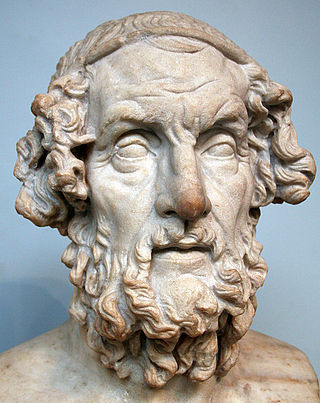 11
Homer was a Greek poet who is credited as the author of the Iliad and the Odyssey, two epic poems that are foundational works of ancient Greek literature. Homer is considered one of the most revered and influential authors in history.
11
Homer was a Greek poet who is credited as the author of the Iliad and the Odyssey, two epic poems that are foundational works of ancient Greek literature. Homer is considered one of the most revered and influential authors in history.
Leonardo da Vinci
 10
Leonardo di ser Piero da Vinci was an Italian polymath of the High Renaissance who was active as a painter, draughtsman, engineer, scientist, theorist, sculptor, and architect. While his fame initially rested on his achievements as a painter, he has also become known for his notebooks, in which he made drawings and notes on a variety of subjects, including anatomy, astronomy, botany, cartography, painting, and paleontology. Leonardo is widely regarded to have been a genius who epitomized the Renaissance humanist ideal, and his collective works comprise a contribution to later generations of artists matched only by that of his younger contemporary Michelangelo.
10
Leonardo di ser Piero da Vinci was an Italian polymath of the High Renaissance who was active as a painter, draughtsman, engineer, scientist, theorist, sculptor, and architect. While his fame initially rested on his achievements as a painter, he has also become known for his notebooks, in which he made drawings and notes on a variety of subjects, including anatomy, astronomy, botany, cartography, painting, and paleontology. Leonardo is widely regarded to have been a genius who epitomized the Renaissance humanist ideal, and his collective works comprise a contribution to later generations of artists matched only by that of his younger contemporary Michelangelo.
John the Apostle
 10
John the Apostle, also known as Saint John the Beloved and, in Eastern Orthodox Christianity, Saint John the Theologian, was one of the Twelve Apostles of Jesus according to the New Testament. Generally listed as the youngest apostle, he was the son of Zebedee and Salome. His brother James was another of the Twelve Apostles. The Church Fathers identify him as John the Evangelist, John of Patmos, John the Elder, and the Beloved Disciple, and testify that he outlived the remaining apostles and was the only one to die of natural causes, although modern scholars are divided on the veracity of these claims.
10
John the Apostle, also known as Saint John the Beloved and, in Eastern Orthodox Christianity, Saint John the Theologian, was one of the Twelve Apostles of Jesus according to the New Testament. Generally listed as the youngest apostle, he was the son of Zebedee and Salome. His brother James was another of the Twelve Apostles. The Church Fathers identify him as John the Evangelist, John of Patmos, John the Elder, and the Beloved Disciple, and testify that he outlived the remaining apostles and was the only one to die of natural causes, although modern scholars are divided on the veracity of these claims.
Rembrandt
 10
Rembrandt Harmenszoon van Rijn, usually simply known as Rembrandt, was a Dutch Golden Age painter, printmaker, and draughtsman. He is generally considered one of the greatest visual artists in the history of art. It is estimated Rembrandt produced a total of about three hundred paintings, three hundred etchings, and two thousand drawings.
10
Rembrandt Harmenszoon van Rijn, usually simply known as Rembrandt, was a Dutch Golden Age painter, printmaker, and draughtsman. He is generally considered one of the greatest visual artists in the history of art. It is estimated Rembrandt produced a total of about three hundred paintings, three hundred etchings, and two thousand drawings.
Nicolaus Copernicus
 10
Nicolaus Copernicus was a Renaissance polymath, active as a mathematician, astronomer, and Catholic canon, who formulated a model of the universe that placed the Sun rather than Earth at its center. In all likelihood, Copernicus developed his model independently of Aristarchus of Samos, an ancient Greek astronomer who had formulated such a model some eighteen centuries earlier.
10
Nicolaus Copernicus was a Renaissance polymath, active as a mathematician, astronomer, and Catholic canon, who formulated a model of the universe that placed the Sun rather than Earth at its center. In all likelihood, Copernicus developed his model independently of Aristarchus of Samos, an ancient Greek astronomer who had formulated such a model some eighteen centuries earlier.
Franz Liszt
 10
Franz Liszt was a Hungarian composer, virtuoso pianist, conductor and teacher of the Romantic period. With a diverse body of work spanning more than six decades, he is considered to be one of the most prolific and influential composers of his era, and his piano works continue to be widely performed and recorded.
10
Franz Liszt was a Hungarian composer, virtuoso pianist, conductor and teacher of the Romantic period. With a diverse body of work spanning more than six decades, he is considered to be one of the most prolific and influential composers of his era, and his piano works continue to be widely performed and recorded.
Hubertus
 10
Hubertus or Hubert was a Christian saint who became the first bishop of Liège in 708 A.D. He is the patron saint of hunters, mathematicians, opticians and metalworkers. Known as the "Apostle of the Ardennes", he was called upon, until the early 20th century, to cure rabies through the use of the traditional Saint Hubert's Key.
10
Hubertus or Hubert was a Christian saint who became the first bishop of Liège in 708 A.D. He is the patron saint of hunters, mathematicians, opticians and metalworkers. Known as the "Apostle of the Ardennes", he was called upon, until the early 20th century, to cure rabies through the use of the traditional Saint Hubert's Key.
James Watt
 10
James Watt was a Scottish inventor, mechanical engineer, and chemist who improved on Thomas Newcomen's 1712 Newcomen steam engine with his Watt steam engine in 1776, which was fundamental to the changes brought by the Industrial Revolution in both his native country Great Britain, and the rest of the world.
10
James Watt was a Scottish inventor, mechanical engineer, and chemist who improved on Thomas Newcomen's 1712 Newcomen steam engine with his Watt steam engine in 1776, which was fundamental to the changes brought by the Industrial Revolution in both his native country Great Britain, and the rest of the world.
Woodrow Wilson
 10
Thomas Woodrow Wilson was an American politician and academic who served as the 28th president of the United States from 1913 to 1921. A member of the Democratic Party, Wilson served as the president of Princeton University and as the governor of New Jersey before winning the 1912 presidential election. As president, Wilson changed the nation's economic policies and led the United States into World War I in 1917. He was the leading architect of the League of Nations, and his progressive stance on foreign policy came to be known as Wilsonianism.
10
Thomas Woodrow Wilson was an American politician and academic who served as the 28th president of the United States from 1913 to 1921. A member of the Democratic Party, Wilson served as the president of Princeton University and as the governor of New Jersey before winning the 1912 presidential election. As president, Wilson changed the nation's economic policies and led the United States into World War I in 1917. He was the leading architect of the League of Nations, and his progressive stance on foreign policy came to be known as Wilsonianism.
Luke the Evangelist
 10
Luke the Evangelist is one of the Four Evangelists—the four traditionally ascribed authors of the canonical gospels. The Early Church Fathers ascribed to him authorship of both the Gospel of Luke and the Acts of the Apostles. Prominent figures in early Christianity such as Jerome and Eusebius later reaffirmed his authorship, although a lack of conclusive evidence as to the identity of the author of the works has led to discussion in scholarly circles, both secular and religious.
10
Luke the Evangelist is one of the Four Evangelists—the four traditionally ascribed authors of the canonical gospels. The Early Church Fathers ascribed to him authorship of both the Gospel of Luke and the Acts of the Apostles. Prominent figures in early Christianity such as Jerome and Eusebius later reaffirmed his authorship, although a lack of conclusive evidence as to the identity of the author of the works has led to discussion in scholarly circles, both secular and religious.
Pablo Neruda
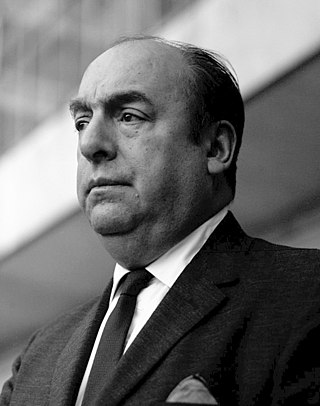 10
Pablo Neruda was a Chilean poet-diplomat and politician who won the 1971 Nobel Prize in Literature. Neruda became known as a poet when he was 13 years old and wrote in a variety of styles, including surrealist poems, historical epics, political manifestos, a prose autobiography, and passionate love poems such as the ones in his collection Twenty Love Poems and a Song of Despair (1924).
10
Pablo Neruda was a Chilean poet-diplomat and politician who won the 1971 Nobel Prize in Literature. Neruda became known as a poet when he was 13 years old and wrote in a variety of styles, including surrealist poems, historical epics, political manifestos, a prose autobiography, and passionate love poems such as the ones in his collection Twenty Love Poems and a Song of Despair (1924).
Alexander Fleming
 10
Sir Alexander Fleming was a Scottish physician and microbiologist, best known for discovering the world's first broadly effective antibiotic substance, which he named penicillin. His discovery in 1928 of what was later named benzylpenicillin from the mould Penicillium rubens has been described as the "single greatest victory ever achieved over disease". For this discovery, he shared the Nobel Prize in Physiology or Medicine in 1945 with Howard Florey and Ernst Boris Chain.
10
Sir Alexander Fleming was a Scottish physician and microbiologist, best known for discovering the world's first broadly effective antibiotic substance, which he named penicillin. His discovery in 1928 of what was later named benzylpenicillin from the mould Penicillium rubens has been described as the "single greatest victory ever achieved over disease". For this discovery, he shared the Nobel Prize in Physiology or Medicine in 1945 with Howard Florey and Ernst Boris Chain.
Pope John XXIII
 10
Pope John XXIII was head of the Catholic Church and sovereign of the Vatican City State from 28 October 1958 until his death in June 1963.
10
Pope John XXIII was head of the Catholic Church and sovereign of the Vatican City State from 28 October 1958 until his death in June 1963.
Patrice Lumumba
 9
Patrice Émery Lumumba, born Isaïe Tasumbu Tawosa, was a Congolese politician and independence leader who served as the first prime minister of the Democratic Republic of the Congo from June until September 1960, following the May 1960 election. He was the leader of the Congolese National Movement (MNC) from 1958 until his execution in January 1961. Ideologically an African nationalist and pan-Africanist, he played a significant role in the transformation of the Congo from a colony of Belgium into an independent republic.
9
Patrice Émery Lumumba, born Isaïe Tasumbu Tawosa, was a Congolese politician and independence leader who served as the first prime minister of the Democratic Republic of the Congo from June until September 1960, following the May 1960 election. He was the leader of the Congolese National Movement (MNC) from 1958 until his execution in January 1961. Ideologically an African nationalist and pan-Africanist, he played a significant role in the transformation of the Congo from a colony of Belgium into an independent republic.
Salvador Allende
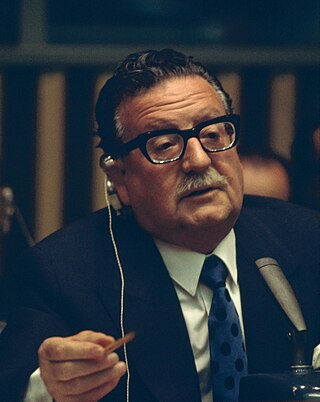 9
Salvador Guillermo Allende Gossens was a Chilean socialist politician who served as the 28th president of Chile from 1970 until his death in 1973. As a democratic socialist committed to democracy, he has been described as the first Marxist to be elected president in a liberal democracy in Latin America.
9
Salvador Guillermo Allende Gossens was a Chilean socialist politician who served as the 28th president of Chile from 1970 until his death in 1973. As a democratic socialist committed to democracy, he has been described as the first Marxist to be elected president in a liberal democracy in Latin America.
Clare of Assisi
 9
Chiara Offreduccio, known as Clare of Assisi, was an Italian saint who was one of the first followers of Francis of Assisi.
9
Chiara Offreduccio, known as Clare of Assisi, was an Italian saint who was one of the first followers of Francis of Assisi.
Archimedes
 9
Archimedes of Syracuse was an Ancient Greek mathematician, physicist, engineer, astronomer, and inventor from the ancient city of Syracuse in Sicily. Although few details of his life are known, he is regarded as one of the leading scientists in classical antiquity. Considered the greatest mathematician of ancient history, and one of the greatest of all time, Archimedes anticipated modern calculus and analysis by applying the concept of the infinitely small and the method of exhaustion to derive and rigorously prove a range of geometrical theorems. These include the area of a circle, the surface area and volume of a sphere, the area of an ellipse, the area under a parabola, the volume of a segment of a paraboloid of revolution, the volume of a segment of a hyperboloid of revolution, and the area of a spiral.
9
Archimedes of Syracuse was an Ancient Greek mathematician, physicist, engineer, astronomer, and inventor from the ancient city of Syracuse in Sicily. Although few details of his life are known, he is regarded as one of the leading scientists in classical antiquity. Considered the greatest mathematician of ancient history, and one of the greatest of all time, Archimedes anticipated modern calculus and analysis by applying the concept of the infinitely small and the method of exhaustion to derive and rigorously prove a range of geometrical theorems. These include the area of a circle, the surface area and volume of a sphere, the area of an ellipse, the area under a parabola, the volume of a segment of a paraboloid of revolution, the volume of a segment of a hyperboloid of revolution, and the area of a spiral.
Charles de Gaulle
 9
Charles André Joseph Marie de Gaulle was a French army officer and statesman who led the Free French Forces against Nazi Germany in World War II and chaired the Provisional Government of the French Republic from 1944 to 1946 to restore democracy in France. In 1958, amid the Algerian War, he came out of retirement when appointed Prime Minister by President René Coty. He rewrote the Constitution of France and founded the Fifth Republic after approval by referendum. He was elected President of France later that year, a position he held until his resignation in 1969.
9
Charles André Joseph Marie de Gaulle was a French army officer and statesman who led the Free French Forces against Nazi Germany in World War II and chaired the Provisional Government of the French Republic from 1944 to 1946 to restore democracy in France. In 1958, amid the Algerian War, he came out of retirement when appointed Prime Minister by President René Coty. He rewrote the Constitution of France and founded the Fifth Republic after approval by referendum. He was elected President of France later that year, a position he held until his resignation in 1969.
Pablo Picasso
 9
Pablo Ruiz Picasso was a Spanish painter, sculptor, printmaker, ceramicist, and theatre designer who spent most of his adult life in France. One of the most influential artists of the 20th century, he is known for co-founding the Cubist movement, the invention of constructed sculpture, the co-invention of collage, and for the wide variety of styles that he helped develop and explore. Among his most famous works are the proto-Cubist Les Demoiselles d'Avignon (1907) and the anti-war painting Guernica (1937), a dramatic portrayal of the bombing of Guernica by German and Italian air forces during the Spanish Civil War.
9
Pablo Ruiz Picasso was a Spanish painter, sculptor, printmaker, ceramicist, and theatre designer who spent most of his adult life in France. One of the most influential artists of the 20th century, he is known for co-founding the Cubist movement, the invention of constructed sculpture, the co-invention of collage, and for the wide variety of styles that he helped develop and explore. Among his most famous works are the proto-Cubist Les Demoiselles d'Avignon (1907) and the anti-war painting Guernica (1937), a dramatic portrayal of the bombing of Guernica by German and Italian air forces during the Spanish Civil War.
Henry Dunant
 9
Henry Dunant, also known as Henri Dunant, was a Swiss humanitarian, businessman, social activist, and co-founder of the Red Cross. His humanitarian efforts won him the first Nobel Peace Prize in 1901.
9
Henry Dunant, also known as Henri Dunant, was a Swiss humanitarian, businessman, social activist, and co-founder of the Red Cross. His humanitarian efforts won him the first Nobel Peace Prize in 1901.
Giuseppe Verdi
 9
Giuseppe Fortunino Francesco Verdi was an Italian composer best known for his operas. He was born near Busseto to a provincial family of moderate means, receiving a musical education with the help of a local patron, Antonio Barezzi. Verdi came to dominate the Italian opera scene after the era of Gioachino Rossini, Vincenzo Bellini, and Gaetano Donizetti, whose works significantly influenced him.
9
Giuseppe Fortunino Francesco Verdi was an Italian composer best known for his operas. He was born near Busseto to a provincial family of moderate means, receiving a musical education with the help of a local patron, Antonio Barezzi. Verdi came to dominate the Italian opera scene after the era of Gioachino Rossini, Vincenzo Bellini, and Gaetano Donizetti, whose works significantly influenced him.
Johann Wolfgang von Goethe
 9
Johann Wolfgang von Goethe was a German polymath and writer, who is widely regarded as the greatest and most influential writer in the German language. His work has had a profound and wide-ranging influence on Western literary, political, and philosophical thought from the late 18th century to the present day. Goethe was a German poet, playwright, novelist, scientist, statesman, theatre director, and critic. His works include plays, poetry and aesthetic criticism, as well as treatises on botany, anatomy, and color.
9
Johann Wolfgang von Goethe was a German polymath and writer, who is widely regarded as the greatest and most influential writer in the German language. His work has had a profound and wide-ranging influence on Western literary, political, and philosophical thought from the late 18th century to the present day. Goethe was a German poet, playwright, novelist, scientist, statesman, theatre director, and critic. His works include plays, poetry and aesthetic criticism, as well as treatises on botany, anatomy, and color.
Napoleon
 9
Napoleon Bonaparte, later known by his regnal name Napoleon I, was a French emperor and military commander who rose to prominence during the French Revolution and led successful campaigns during the Revolutionary Wars. He was the leader of the French Republic as First Consul from 1799 to 1804, then of the French Empire as Emperor of the French from 1804 until 1814, and briefly again in 1815. His political and cultural legacy endures as a celebrated and controversial leader. He initiated many enduring reforms, but has been criticized for his authoritarian rule. He is considered one of the greatest military commanders in history and his wars and campaigns are still studied at military schools worldwide. However, historians still debate the degree to which he was responsible for the Napoleonic Wars, in which between three and six million people died.
9
Napoleon Bonaparte, later known by his regnal name Napoleon I, was a French emperor and military commander who rose to prominence during the French Revolution and led successful campaigns during the Revolutionary Wars. He was the leader of the French Republic as First Consul from 1799 to 1804, then of the French Empire as Emperor of the French from 1804 until 1814, and briefly again in 1815. His political and cultural legacy endures as a celebrated and controversial leader. He initiated many enduring reforms, but has been criticized for his authoritarian rule. He is considered one of the greatest military commanders in history and his wars and campaigns are still studied at military schools worldwide. However, historians still debate the degree to which he was responsible for the Napoleonic Wars, in which between three and six million people died.
Queen Victoria
 9
Victoria was Queen of the United Kingdom of Great Britain and Ireland from 20 June 1837 until her death in 1901. Her reign of 63 years and 216 days—which was longer than those of any of her predecessors—constituted the Victorian era. It was a period of industrial, political, scientific, and military change within the United Kingdom, and was marked by a great expansion of the British Empire. In 1876, the British Parliament voted to grant her the additional title of Empress of India.
9
Victoria was Queen of the United Kingdom of Great Britain and Ireland from 20 June 1837 until her death in 1901. Her reign of 63 years and 216 days—which was longer than those of any of her predecessors—constituted the Victorian era. It was a period of industrial, political, scientific, and military change within the United Kingdom, and was marked by a great expansion of the British Empire. In 1876, the British Parliament voted to grant her the additional title of Empress of India.
Antonio Vivaldi
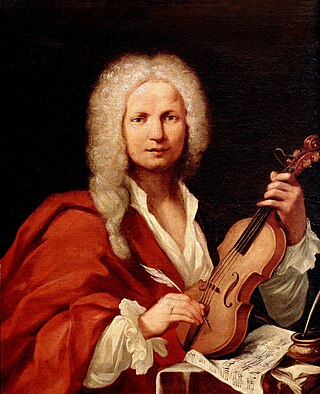 9
Antonio Lucio Vivaldi was an Italian composer, virtuoso violinist and impresario of Baroque music. Along with Johann Sebastian Bach and George Frideric Handel, Vivaldi ranks amongst the greatest Baroque composers and his influence during his lifetime was widespread across Europe, giving origin to many imitators and admirers. He pioneered many developments in orchestration, violin technique and programmatic music. He consolidated the emerging concerto form into a widely accepted and followed idiom.
9
Antonio Lucio Vivaldi was an Italian composer, virtuoso violinist and impresario of Baroque music. Along with Johann Sebastian Bach and George Frideric Handel, Vivaldi ranks amongst the greatest Baroque composers and his influence during his lifetime was widespread across Europe, giving origin to many imitators and admirers. He pioneered many developments in orchestration, violin technique and programmatic music. He consolidated the emerging concerto form into a widely accepted and followed idiom.
Johannes Gutenberg
 9
Johannes Gensfleisch zur Laden zum Gutenberg was a German inventor and craftsman who introduced letterpress printing to Europe with his movable-type printing press. Though movable type was already in use in East Asia, Gutenberg invented the printing press, which later spread across the world. His work led to an information revolution and the unprecedented mass-spread of literature throughout Europe. It had a profound impact on the development of the Renaissance, Reformation, and humanist movements.
9
Johannes Gensfleisch zur Laden zum Gutenberg was a German inventor and craftsman who introduced letterpress printing to Europe with his movable-type printing press. Though movable type was already in use in East Asia, Gutenberg invented the printing press, which later spread across the world. His work led to an information revolution and the unprecedented mass-spread of literature throughout Europe. It had a profound impact on the development of the Renaissance, Reformation, and humanist movements.
Isidore the Laborer
 9
Isidore the Laborer, also known as Isidore the Farmer, was a Spanish farmworker known for his piety toward the poor and animals. He is the Catholic patron saint of farmers, and of Madrid; El Gobernador, Jalisco; La Ceiba, Honduras; and of Tocoa, Honduras. His feast day is celebrated on 15 May.
9
Isidore the Laborer, also known as Isidore the Farmer, was a Spanish farmworker known for his piety toward the poor and animals. He is the Catholic patron saint of farmers, and of Madrid; El Gobernador, Jalisco; La Ceiba, Honduras; and of Tocoa, Honduras. His feast day is celebrated on 15 May.
Alessandro Volta
 9
Alessandro Giuseppe Antonio Anastasio Volta was an Italian physicist and chemist who was a pioneer of electricity and power and is credited as the inventor of the electric battery and the discoverer of methane. He invented the voltaic pile in 1799, and reported the results of his experiments in 1800 in a two-part letter to the president of the Royal Society. With this invention Volta proved that electricity could be generated chemically and debunked the prevalent theory that electricity was generated solely by living beings. Volta's invention sparked a great amount of scientific excitement and led others to conduct similar experiments, which eventually led to the development of the field of electrochemistry.
9
Alessandro Giuseppe Antonio Anastasio Volta was an Italian physicist and chemist who was a pioneer of electricity and power and is credited as the inventor of the electric battery and the discoverer of methane. He invented the voltaic pile in 1799, and reported the results of his experiments in 1800 in a two-part letter to the president of the Royal Society. With this invention Volta proved that electricity could be generated chemically and debunked the prevalent theory that electricity was generated solely by living beings. Volta's invention sparked a great amount of scientific excitement and led others to conduct similar experiments, which eventually led to the development of the field of electrochemistry.
Raphael (archangel)
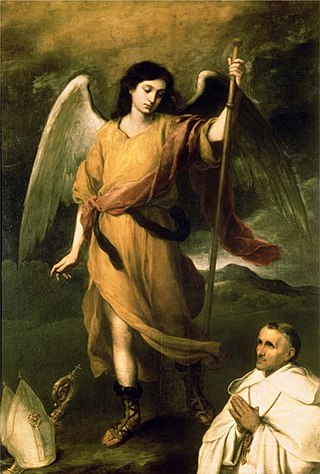 9
Raphael is an archangel first mentioned in the Book of Tobit and in 1 Enoch, both estimated to date from between the 3rd and 2nd century BCE. In later Jewish tradition, he became identified as one of the three heavenly visitors entertained by Abraham at the Oak of Mamre. He is not named in either the New Testament or the Quran, but later Christian tradition identified him with healing and as the angel who stirred waters in the Pool of Bethesda in John 5:2–4, and in Islam, where his name is Israfil, he is understood to be the unnamed angel of Quran 6:73, standing eternally with a trumpet to his lips, ready to announce the Day of Judgment. In Gnostic tradition, Raphael is represented on the Ophite Diagram.
9
Raphael is an archangel first mentioned in the Book of Tobit and in 1 Enoch, both estimated to date from between the 3rd and 2nd century BCE. In later Jewish tradition, he became identified as one of the three heavenly visitors entertained by Abraham at the Oak of Mamre. He is not named in either the New Testament or the Quran, but later Christian tradition identified him with healing and as the angel who stirred waters in the Pool of Bethesda in John 5:2–4, and in Islam, where his name is Israfil, he is understood to be the unnamed angel of Quran 6:73, standing eternally with a trumpet to his lips, ready to announce the Day of Judgment. In Gnostic tradition, Raphael is represented on the Ophite Diagram.
Mahatma Gandhi
 9
Mohandas Karamchand Gandhi was an Indian lawyer, anti-colonial nationalist and political ethicist who employed nonviolent resistance to lead the successful campaign for India's independence from British rule. He inspired movements for civil rights and freedom across the world. The honorific Mahātmā, first applied to him in South Africa in 1914, is now used throughout the world.
9
Mohandas Karamchand Gandhi was an Indian lawyer, anti-colonial nationalist and political ethicist who employed nonviolent resistance to lead the successful campaign for India's independence from British rule. He inspired movements for civil rights and freedom across the world. The honorific Mahātmā, first applied to him in South Africa in 1914, is now used throughout the world.
Thomas the Apostle
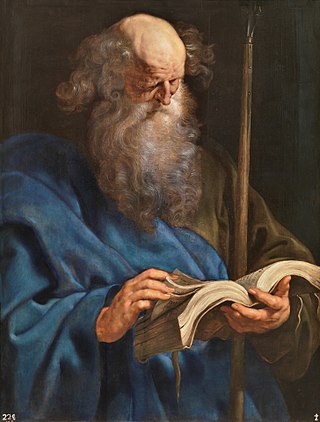 9
Thomas the Apostle, also known as Didymus, was one of the Twelve Apostles of Jesus according to the New Testament. Thomas is commonly known as "Doubting Thomas" because he initially doubted the resurrection of Jesus Christ when he was told of it ; he later confessed his faith on seeing the places where the wounds had healed on the holy body of Jesus after the Crucifixion of Jesus. While it is often assumed he touched the wounds in art and poetry, the scriptures do not say that he touched the wounds.
9
Thomas the Apostle, also known as Didymus, was one of the Twelve Apostles of Jesus according to the New Testament. Thomas is commonly known as "Doubting Thomas" because he initially doubted the resurrection of Jesus Christ when he was told of it ; he later confessed his faith on seeing the places where the wounds had healed on the holy body of Jesus after the Crucifixion of Jesus. While it is often assumed he touched the wounds in art and poetry, the scriptures do not say that he touched the wounds.
Dante Alighieri
 9
Dante Alighieri, most likely baptized Durante di Alighiero degli Alighieri and often referred to as Dante, was an Italian poet, writer, and philosopher. His Divine Comedy, originally called Comedìa and later christened Divina by Giovanni Boccaccio, is widely considered one of the most important poems of the Middle Ages and the greatest literary work in the Italian language.
9
Dante Alighieri, most likely baptized Durante di Alighiero degli Alighieri and often referred to as Dante, was an Italian poet, writer, and philosopher. His Divine Comedy, originally called Comedìa and later christened Divina by Giovanni Boccaccio, is widely considered one of the most important poems of the Middle Ages and the greatest literary work in the Italian language.
Michelangelo
 8
Michelangelo di Lodovico Buonarroti Simoni, known mononymously as Michelangelo, was an Italian sculptor, painter, architect, and poet of the High Renaissance. Born in the Republic of Florence, his work was inspired by models from classical antiquity and had a lasting influence on Western art. Michelangelo's creative abilities and mastery in a range of artistic arenas define him as an archetypal Renaissance man, along with his rival and elder contemporary, Leonardo da Vinci. Given the sheer volume of surviving correspondence, sketches, and reminiscences, Michelangelo is one of the best-documented artists of the 16th century. He was lauded by contemporary biographers as the most accomplished artist of his era.
8
Michelangelo di Lodovico Buonarroti Simoni, known mononymously as Michelangelo, was an Italian sculptor, painter, architect, and poet of the High Renaissance. Born in the Republic of Florence, his work was inspired by models from classical antiquity and had a lasting influence on Western art. Michelangelo's creative abilities and mastery in a range of artistic arenas define him as an archetypal Renaissance man, along with his rival and elder contemporary, Leonardo da Vinci. Given the sheer volume of surviving correspondence, sketches, and reminiscences, Michelangelo is one of the best-documented artists of the 16th century. He was lauded by contemporary biographers as the most accomplished artist of his era.
Gabriel
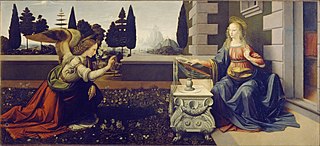 8
In the Abrahamic religions, Gabriel is an archangel with the power to announce God's will to mankind. He is mentioned in the Hebrew Bible, the New Testament, the Quran and the Kitáb-i-Aqdas. Many Christian traditions – including Eastern Orthodoxy, Catholicism, Lutheranism, and Anglicanism – revere Gabriel as a saint.
8
In the Abrahamic religions, Gabriel is an archangel with the power to announce God's will to mankind. He is mentioned in the Hebrew Bible, the New Testament, the Quran and the Kitáb-i-Aqdas. Many Christian traditions – including Eastern Orthodoxy, Catholicism, Lutheranism, and Anglicanism – revere Gabriel as a saint.
Robert Schuman
 8
Jean-Baptiste Nicolas Robert Schuman was a Luxembourg-born French statesman. Schuman was a Christian democratic political thinker and activist. Twice Prime Minister of France, a reformist Minister of Finance and a Foreign Minister, he was instrumental in building postwar European and trans-Atlantic institutions and was one of the founders of the European Communities, the Council of Europe and NATO. The 1964–1965 academic year at the College of Europe was named in his honour. In 2021, Schuman was declared venerable by Pope Francis in recognition of his acting on Christian principles.
8
Jean-Baptiste Nicolas Robert Schuman was a Luxembourg-born French statesman. Schuman was a Christian democratic political thinker and activist. Twice Prime Minister of France, a reformist Minister of Finance and a Foreign Minister, he was instrumental in building postwar European and trans-Atlantic institutions and was one of the founders of the European Communities, the Council of Europe and NATO. The 1964–1965 academic year at the College of Europe was named in his honour. In 2021, Schuman was declared venerable by Pope Francis in recognition of his acting on Christian principles.
Roald Amundsen
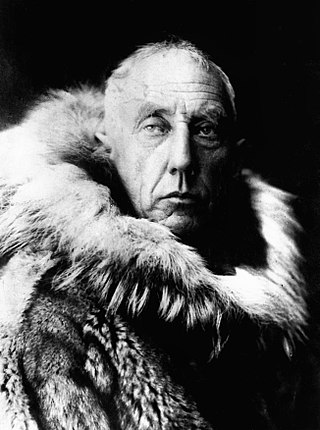 8
Roald Engelbregt Gravning Amundsen was a Norwegian explorer of polar regions. He was a key figure of the period known as the Heroic Age of Antarctic Exploration.
8
Roald Engelbregt Gravning Amundsen was a Norwegian explorer of polar regions. He was a key figure of the period known as the Heroic Age of Antarctic Exploration.
Anthony the Great
 8
Anthony the Great was a Christian monk from Egypt, revered since his death as a saint. He is distinguished from other saints named Anthony, such as Anthony of Padua, by various epithets: Anthony of Egypt, Anthony the Abbot, Anthony of the Desert, Anthony the Anchorite, Anthony the Hermit, and Anthony of Thebes. For his importance among the Desert Fathers and to all later Christian monasticism, he is also known as the Father of All Monks. His feast day is celebrated on 17 January among the Eastern Orthodox and Catholic churches and on Tobi 22 in the Coptic calendar.
8
Anthony the Great was a Christian monk from Egypt, revered since his death as a saint. He is distinguished from other saints named Anthony, such as Anthony of Padua, by various epithets: Anthony of Egypt, Anthony the Abbot, Anthony of the Desert, Anthony the Anchorite, Anthony the Hermit, and Anthony of Thebes. For his importance among the Desert Fathers and to all later Christian monasticism, he is also known as the Father of All Monks. His feast day is celebrated on 17 January among the Eastern Orthodox and Catholic churches and on Tobi 22 in the Coptic calendar.
Franz Schubert
 8
Franz Peter Schubert was an Austrian composer of the late Classical and early Romantic eras. Despite his short life, Schubert left behind a vast oeuvre, including more than 600 secular vocal works, seven complete symphonies, sacred music, operas, incidental music, and a large body of piano and chamber music. His major works include the art songs "Erlkönig", "Gretchen am Spinnrade", "Ave Maria"; the Trout Quintet, the unfinished Symphony No. 8 in B minor, the "Great" Symphony No. 9 in C major, the String Quartet No. 14 Death and the Maiden, a String Quintet, the two sets of Impromptus for solo piano, the three last piano sonatas, the Fantasia in F minor for piano four hands, the opera Fierrabras, the incidental music to the play Rosamunde, and the song cycles Die schöne Müllerin, Winterreise and Schwanengesang.
8
Franz Peter Schubert was an Austrian composer of the late Classical and early Romantic eras. Despite his short life, Schubert left behind a vast oeuvre, including more than 600 secular vocal works, seven complete symphonies, sacred music, operas, incidental music, and a large body of piano and chamber music. His major works include the art songs "Erlkönig", "Gretchen am Spinnrade", "Ave Maria"; the Trout Quintet, the unfinished Symphony No. 8 in B minor, the "Great" Symphony No. 9 in C major, the String Quartet No. 14 Death and the Maiden, a String Quintet, the two sets of Impromptus for solo piano, the three last piano sonatas, the Fantasia in F minor for piano four hands, the opera Fierrabras, the incidental music to the play Rosamunde, and the song cycles Die schöne Müllerin, Winterreise and Schwanengesang.
Brigid of Kildare
 8
Saint Brigid of Kildare or Saint Brigid of Ireland is the patroness saint of Ireland, and one of its three national saints along with Patrick and Columba. According to medieval Irish hagiographies, she was an abbess who founded the important abbey of Kildare, as well as several other convents of nuns. There are few historical facts about her, and her hagiographies are mainly anecdotes and miracle tales, some of which are rooted in pagan folklore. They say Brigid was the daughter of a chieftain and a slave woman, and was raised in a druid's household before becoming a consecrated virgin. She is patroness of many things, including poetry, learning, healing, protection, blacksmithing, livestock and dairy production. In her honour, a perpetual fire was kept burning at Kildare for centuries.
8
Saint Brigid of Kildare or Saint Brigid of Ireland is the patroness saint of Ireland, and one of its three national saints along with Patrick and Columba. According to medieval Irish hagiographies, she was an abbess who founded the important abbey of Kildare, as well as several other convents of nuns. There are few historical facts about her, and her hagiographies are mainly anecdotes and miracle tales, some of which are rooted in pagan folklore. They say Brigid was the daughter of a chieftain and a slave woman, and was raised in a druid's household before becoming a consecrated virgin. She is patroness of many things, including poetry, learning, healing, protection, blacksmithing, livestock and dairy production. In her honour, a perpetual fire was kept burning at Kildare for centuries.
Peter Paul Rubens
 8
Sir Peter Paul Rubens was a Flemish artist and diplomat. He is considered the most influential artist of the Flemish Baroque tradition. Rubens's highly charged compositions reference erudite aspects of classical and Christian history. His unique and immensely popular Baroque style emphasized movement, colour, and sensuality, which followed the immediate, dramatic artistic style promoted in the Counter-Reformation. Rubens was a painter producing altarpieces, portraits, landscapes, and history paintings of mythological and allegorical subjects. He was also a prolific designer of cartoons for the Flemish tapestry workshops and of frontispieces for the publishers in Antwerp.
8
Sir Peter Paul Rubens was a Flemish artist and diplomat. He is considered the most influential artist of the Flemish Baroque tradition. Rubens's highly charged compositions reference erudite aspects of classical and Christian history. His unique and immensely popular Baroque style emphasized movement, colour, and sensuality, which followed the immediate, dramatic artistic style promoted in the Counter-Reformation. Rubens was a painter producing altarpieces, portraits, landscapes, and history paintings of mythological and allegorical subjects. He was also a prolific designer of cartoons for the Flemish tapestry workshops and of frontispieces for the publishers in Antwerp.
Neil Armstrong
 8
Neil Alden Armstrong was an American astronaut and aeronautical engineer who in 1969 became the first person to walk on the Moon. He was also a naval aviator, test pilot, and university professor.
8
Neil Alden Armstrong was an American astronaut and aeronautical engineer who in 1969 became the first person to walk on the Moon. He was also a naval aviator, test pilot, and university professor.
Elizabeth II
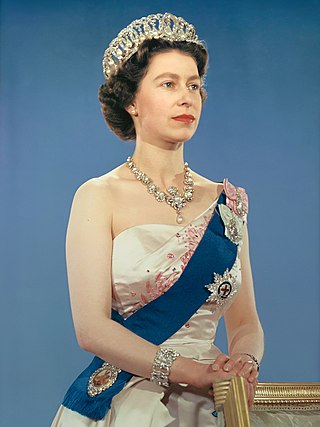 8
Elizabeth II was Queen of the United Kingdom and other Commonwealth realms from 6 February 1952 until her death in 2022. She was queen regnant of 32 sovereign states over the course of her lifetime and remained the monarch of 15 realms by the time of her death. Her reign of over 70 years is the longest of any British monarch, the longest of any female monarch, and the second longest verified reign of any monarch of a sovereign state in history.
8
Elizabeth II was Queen of the United Kingdom and other Commonwealth realms from 6 February 1952 until her death in 2022. She was queen regnant of 32 sovereign states over the course of her lifetime and remained the monarch of 15 realms by the time of her death. Her reign of over 70 years is the longest of any British monarch, the longest of any female monarch, and the second longest verified reign of any monarch of a sovereign state in history.
Mother Teresa
 8
Mary Teresa Bojaxhiu MC, better known as Mother Teresa, was an Albanian-Indian Catholic nun and the founder of the Missionaries of Charity. Born in Skopje, then part of the Ottoman Empire, at the age of 18 she moved to Ireland and later to India, where she lived most of her life. On 4 September 2016, she was canonised by the Catholic Church as Saint Teresa of Calcutta. The anniversary of her death, 5 September, is her feast day.
8
Mary Teresa Bojaxhiu MC, better known as Mother Teresa, was an Albanian-Indian Catholic nun and the founder of the Missionaries of Charity. Born in Skopje, then part of the Ottoman Empire, at the age of 18 she moved to Ireland and later to India, where she lived most of her life. On 4 September 2016, she was canonised by the Catholic Church as Saint Teresa of Calcutta. The anniversary of her death, 5 September, is her feast day.
Robert Koch
 8
Heinrich Hermann Robert Koch was a German physician and microbiologist. As the discoverer of the specific causative agents of deadly infectious diseases including tuberculosis, cholera and anthrax, he is regarded as one of the main founders of modern bacteriology. As such he is popularly nicknamed the father of microbiology, and as the father of medical bacteriology. His discovery of the anthrax bacterium in 1876 is considered as the birth of modern bacteriology. Koch used his discoveries to establish that germs "could cause a specific disease" and directly provided proofs for the germ theory of diseases, therefore creating the scientific basis of public health, saving millions of lives. For his life's work Koch is seen as one of the founders of modern medicine.
8
Heinrich Hermann Robert Koch was a German physician and microbiologist. As the discoverer of the specific causative agents of deadly infectious diseases including tuberculosis, cholera and anthrax, he is regarded as one of the main founders of modern bacteriology. As such he is popularly nicknamed the father of microbiology, and as the father of medical bacteriology. His discovery of the anthrax bacterium in 1876 is considered as the birth of modern bacteriology. Koch used his discoveries to establish that germs "could cause a specific disease" and directly provided proofs for the germ theory of diseases, therefore creating the scientific basis of public health, saving millions of lives. For his life's work Koch is seen as one of the founders of modern medicine.
Albert Schweitzer
 8
Ludwig Philipp Albert Schweitzer was an Alsatian polymath. He was a theologian, organist, musicologist, writer, humanitarian, philosopher, and physician. A Lutheran minister, Schweitzer challenged both the secular view of the historical Jesus as depicted by the historical-critical method current at this time, as well as the traditional Christian view. His contributions to the interpretation of Pauline Christianity concern the role of Paul's mysticism of "being in Christ" as primary and the doctrine of justification by faith as secondary.
8
Ludwig Philipp Albert Schweitzer was an Alsatian polymath. He was a theologian, organist, musicologist, writer, humanitarian, philosopher, and physician. A Lutheran minister, Schweitzer challenged both the secular view of the historical Jesus as depicted by the historical-critical method current at this time, as well as the traditional Christian view. His contributions to the interpretation of Pauline Christianity concern the role of Paul's mysticism of "being in Christ" as primary and the doctrine of justification by faith as secondary.
Francisco Pizarro
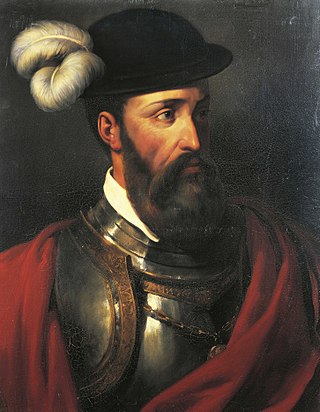 8
Francisco Pizarro, Marquess of the Atabillos was a Spanish conquistador, best known for his expeditions that led to the Spanish conquest of the Inca Empire.
8
Francisco Pizarro, Marquess of the Atabillos was a Spanish conquistador, best known for his expeditions that led to the Spanish conquest of the Inca Empire.
Benedict of Nursia
 8
Benedict of Nursia, often known as Saint Benedict, was an Italian Christian monk, writer, and theologian. He is venerated in the Catholic Church, the Eastern Orthodox Church, the Oriental Orthodox Churches, the Anglican Communion, and Old Catholic Churches. In 1964 Pope Paul VI declared Benedict a patron saint of Europe.
8
Benedict of Nursia, often known as Saint Benedict, was an Italian Christian monk, writer, and theologian. He is venerated in the Catholic Church, the Eastern Orthodox Church, the Oriental Orthodox Churches, the Anglican Communion, and Old Catholic Churches. In 1964 Pope Paul VI declared Benedict a patron saint of Europe.
Jules Verne
 8
Jules Gabriel Verne was a French novelist, poet, and playwright. His collaboration with the publisher Pierre-Jules Hetzel led to the creation of the Voyages extraordinaires, a series of bestselling adventure novels including Journey to the Center of the Earth (1864), Twenty Thousand Leagues Under the Seas (1870), and Around the World in Eighty Days (1872). His novels, always well documented, are generally set in the second half of the 19th century, taking into account the technological advances of the time.
8
Jules Gabriel Verne was a French novelist, poet, and playwright. His collaboration with the publisher Pierre-Jules Hetzel led to the creation of the Voyages extraordinaires, a series of bestselling adventure novels including Journey to the Center of the Earth (1864), Twenty Thousand Leagues Under the Seas (1870), and Around the World in Eighty Days (1872). His novels, always well documented, are generally set in the second half of the 19th century, taking into account the technological advances of the time.
Ignatius of Loyola
 8
Ignatius of Loyola, venerated as Saint Ignatius of Loyola, was a Spanish Catholic priest and theologian, who, with six companions, founded the religious order of the Society of Jesus (Jesuits), and became its first Superior General, in Paris in 1541.
8
Ignatius of Loyola, venerated as Saint Ignatius of Loyola, was a Spanish Catholic priest and theologian, who, with six companions, founded the religious order of the Society of Jesus (Jesuits), and became its first Superior General, in Paris in 1541.
Jerome
 8
Jerome, also known as Jerome of Stridon, was an early Christian priest, confessor, theologian, translator, and historian; he is commonly known as Saint Jerome.
8
Jerome, also known as Jerome of Stridon, was an early Christian priest, confessor, theologian, translator, and historian; he is commonly known as Saint Jerome.
Benjamin Franklin
 8
Benjamin Franklin was an American polymath, a leading writer, scientist, inventor, statesman, diplomat, printer, publisher, and political philosopher. Among the most influential intellectuals of his time, Franklin was one of the Founding Fathers of the United States; a drafter and signer of the Declaration of Independence; and the first postmaster general.
8
Benjamin Franklin was an American polymath, a leading writer, scientist, inventor, statesman, diplomat, printer, publisher, and political philosopher. Among the most influential intellectuals of his time, Franklin was one of the Founding Fathers of the United States; a drafter and signer of the Declaration of Independence; and the first postmaster general.
Lord Byron
 8
George Gordon Byron, 6th Baron Byron was a British poet and peer. He is one of the major figures of the Romantic movement, and is regarded as being among the greatest of English poets. Among his best-known works are the lengthy narratives Don Juan and Childe Harold's Pilgrimage; much of his shorter lyrics in Hebrew Melodies also became popular.
8
George Gordon Byron, 6th Baron Byron was a British poet and peer. He is one of the major figures of the Romantic movement, and is regarded as being among the greatest of English poets. Among his best-known works are the lengthy narratives Don Juan and Childe Harold's Pilgrimage; much of his shorter lyrics in Hebrew Melodies also became popular.
Saint Blaise
 7
Blaise of Sebaste was a physician and bishop of Sebastea in historical Lesser Armenia who is venerated as a Christian saint and martyr. He is counted as one of the Fourteen Holy Helpers.
7
Blaise of Sebaste was a physician and bishop of Sebastea in historical Lesser Armenia who is venerated as a Christian saint and martyr. He is counted as one of the Fourteen Holy Helpers.
Hadrian
 7
Hadrian was Roman emperor from 117 to 138. Hadrian was born in Italica, close to modern Seville in Spain, an Italic settlement in Hispania Baetica; his branch of the Aelia gens, the Aeli Hadriani, came from the town of Hadria in eastern Italy. He was a member of the Nerva-Antonine dynasty.
7
Hadrian was Roman emperor from 117 to 138. Hadrian was born in Italica, close to modern Seville in Spain, an Italic settlement in Hispania Baetica; his branch of the Aelia gens, the Aeli Hadriani, came from the town of Hadria in eastern Italy. He was a member of the Nerva-Antonine dynasty.
Gioachino Rossini
 7
Gioachino Antonio Rossini was an Italian composer who gained fame for his 39 operas, although he also wrote many songs, some chamber music and piano pieces and some sacred music. He set new standards for both comic and serious opera before retiring from large-scale composition while still in his thirties, at the height of his popularity.
7
Gioachino Antonio Rossini was an Italian composer who gained fame for his 39 operas, although he also wrote many songs, some chamber music and piano pieces and some sacred music. He set new standards for both comic and serious opera before retiring from large-scale composition while still in his thirties, at the height of his popularity.
John Lennon
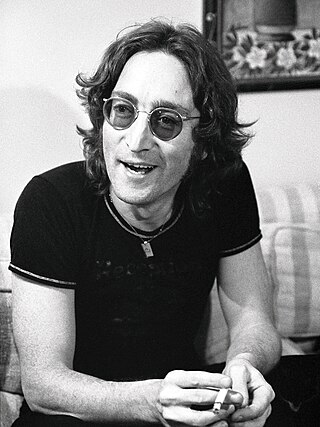 7
John Winston Ono Lennon was an English singer, songwriter and musician. He gained worldwide fame as the founder, co-songwriter, co-lead vocalist and rhythm guitarist of the Beatles. His work included music, writing, drawings and film. His songwriting partnership with Paul McCartney remains the most successful in history.
7
John Winston Ono Lennon was an English singer, songwriter and musician. He gained worldwide fame as the founder, co-songwriter, co-lead vocalist and rhythm guitarist of the Beatles. His work included music, writing, drawings and film. His songwriting partnership with Paul McCartney remains the most successful in history.
Voltaire
 7
François-Marie Arouet, known by his nom de plume M. de Voltaire, was a French Enlightenment writer, philosopher (philosophe), satirist, and historian. Famous for his wit and his criticism of Christianity and of slavery, Voltaire was an advocate of freedom of speech, freedom of religion, and separation of church and state.
7
François-Marie Arouet, known by his nom de plume M. de Voltaire, was a French Enlightenment writer, philosopher (philosophe), satirist, and historian. Famous for his wit and his criticism of Christianity and of slavery, Voltaire was an advocate of freedom of speech, freedom of religion, and separation of church and state.
Maurice Ravel
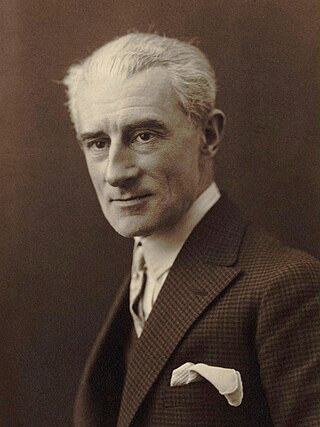 7
Joseph Maurice Ravel was a French composer, pianist and conductor. He is often associated with Impressionism along with his elder contemporary Claude Debussy, although both composers rejected the term. In the 1920s and 1930s Ravel was internationally regarded as France's greatest living composer.
7
Joseph Maurice Ravel was a French composer, pianist and conductor. He is often associated with Impressionism along with his elder contemporary Claude Debussy, although both composers rejected the term. In the 1920s and 1930s Ravel was internationally regarded as France's greatest living composer.
Bartholomew the Apostle
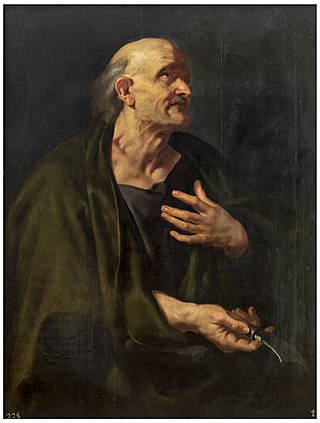 7
Bartholomew was one of the twelve apostles of Jesus according to the New Testament. Most scholars today identify Bartholomew as Nathanael or Nathaniel, who appears in the Gospel of John.
7
Bartholomew was one of the twelve apostles of Jesus according to the New Testament. Most scholars today identify Bartholomew as Nathanael or Nathaniel, who appears in the Gospel of John.
Martin Luther King Jr.
 7
Martin Luther King Jr. was an American Christian minister, activist, and political philosopher who was one of the most prominent leaders in the civil rights movement from 1955 until his assassination in 1968. A black church leader and a son of early civil rights activist and minister Martin Luther King Sr., King advanced civil rights for people of color in the United States through the use of nonviolent resistance and nonviolent civil disobedience against Jim Crow laws and other forms of legalized discrimination.
7
Martin Luther King Jr. was an American Christian minister, activist, and political philosopher who was one of the most prominent leaders in the civil rights movement from 1955 until his assassination in 1968. A black church leader and a son of early civil rights activist and minister Martin Luther King Sr., King advanced civil rights for people of color in the United States through the use of nonviolent resistance and nonviolent civil disobedience against Jim Crow laws and other forms of legalized discrimination.
Cyril and Methodius
 7
Cyril and Methodius (815–885) were brothers, Byzantine Christian theologians and missionaries. For their work evangelizing the Slavs, they are known as the "Apostles to the Slavs".
7
Cyril and Methodius (815–885) were brothers, Byzantine Christian theologians and missionaries. For their work evangelizing the Slavs, they are known as the "Apostles to the Slavs".
Rosa Luxemburg
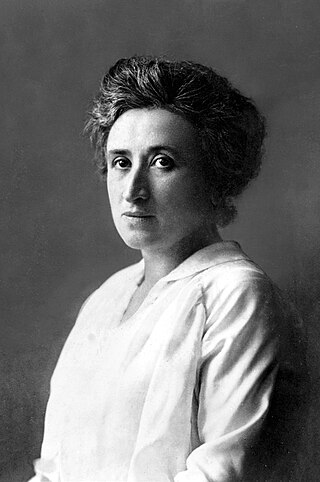 7
Rosa Luxemburg was a Polish and naturalised-German revolutionary socialist, orthodox Marxist, and anti-War activist during the First World War. She became a key figure of the revolutionary socialist movements of Poland and Germany during the late 19th and early 20th century, particularly the Spartacist uprising.
7
Rosa Luxemburg was a Polish and naturalised-German revolutionary socialist, orthodox Marxist, and anti-War activist during the First World War. She became a key figure of the revolutionary socialist movements of Poland and Germany during the late 19th and early 20th century, particularly the Spartacist uprising.
Virgil
 7
Publius Vergilius Maro, usually called Virgil or Vergil in English, was an ancient Roman poet of the Augustan period. He composed three of the most famous poems in Latin literature: the Eclogues, the Georgics, and the epic Aeneid. A number of minor poems, collected in the Appendix Vergiliana, were attributed to him in ancient times, but modern scholars consider his authorship of these poems to be dubious.
7
Publius Vergilius Maro, usually called Virgil or Vergil in English, was an ancient Roman poet of the Augustan period. He composed three of the most famous poems in Latin literature: the Eclogues, the Georgics, and the epic Aeneid. A number of minor poems, collected in the Appendix Vergiliana, were attributed to him in ancient times, but modern scholars consider his authorship of these poems to be dubious.
Fridtjof Nansen
 7
Fridtjof Wedel-Jarlsberg Nansen was a Norwegian polymath and Nobel Peace Prize laureate. He gained prominence at various points in his life as an explorer, scientist, diplomat, humanitarian and co-founded the Fatherland League.
7
Fridtjof Wedel-Jarlsberg Nansen was a Norwegian polymath and Nobel Peace Prize laureate. He gained prominence at various points in his life as an explorer, scientist, diplomat, humanitarian and co-founded the Fatherland League.
Marcus Aurelius
 7
Marcus Aurelius Antoninus was Roman emperor from 161 to 180 and a Stoic philosopher. He was a member of the Nerva–Antonine dynasty, the last of the rulers later known as the Five Good Emperors and the last emperor of the Pax Romana, an age of relative peace, calm, and stability for the Roman Empire lasting from 27 BC to 180 AD. He served as Roman consul in 140, 145, and 161.
7
Marcus Aurelius Antoninus was Roman emperor from 161 to 180 and a Stoic philosopher. He was a member of the Nerva–Antonine dynasty, the last of the rulers later known as the Five Good Emperors and the last emperor of the Pax Romana, an age of relative peace, calm, and stability for the Roman Empire lasting from 27 BC to 180 AD. He served as Roman consul in 140, 145, and 161.
Johannes Kepler
 7
Johannes Kepler was a German astronomer, mathematician, astrologer, natural philosopher and writer on music. He is a key figure in the 17th-century Scientific Revolution, best known for his laws of planetary motion, and his books Astronomia nova, Harmonice Mundi, and Epitome Astronomiae Copernicanae, influencing among others Isaac Newton, providing one of the foundations for his theory of universal gravitation. The variety and impact of his work made Kepler one of the founders and fathers of modern astronomy, the scientific method, natural and modern science. He has been described as the "father of science fiction" for his novel Somnium.
7
Johannes Kepler was a German astronomer, mathematician, astrologer, natural philosopher and writer on music. He is a key figure in the 17th-century Scientific Revolution, best known for his laws of planetary motion, and his books Astronomia nova, Harmonice Mundi, and Epitome Astronomiae Copernicanae, influencing among others Isaac Newton, providing one of the foundations for his theory of universal gravitation. The variety and impact of his work made Kepler one of the founders and fathers of modern astronomy, the scientific method, natural and modern science. He has been described as the "father of science fiction" for his novel Somnium.
Richard Wagner
 7
Wilhelm Richard Wagner was a German composer, theatre director, polemicist, and conductor who is chiefly known for his operas. Unlike most opera composers, Wagner wrote both the libretto and the music for each of his stage works. Initially establishing his reputation as a composer of works in the romantic vein of Carl Maria von Weber and Giacomo Meyerbeer, Wagner revolutionised opera through his concept of the Gesamtkunstwerk, by which he sought to synthesise the poetic, visual, musical and dramatic arts, with music subsidiary to drama. He described this vision in a series of essays published between 1849 and 1852. Wagner realised these ideas most fully in the first half of the four-opera cycle Der Ring des Nibelungen.
7
Wilhelm Richard Wagner was a German composer, theatre director, polemicist, and conductor who is chiefly known for his operas. Unlike most opera composers, Wagner wrote both the libretto and the music for each of his stage works. Initially establishing his reputation as a composer of works in the romantic vein of Carl Maria von Weber and Giacomo Meyerbeer, Wagner revolutionised opera through his concept of the Gesamtkunstwerk, by which he sought to synthesise the poetic, visual, musical and dramatic arts, with music subsidiary to drama. He described this vision in a series of essays published between 1849 and 1852. Wagner realised these ideas most fully in the first half of the four-opera cycle Der Ring des Nibelungen.
Saint Florian
 7
Florian was a Christian holy man and the patron saint of chimney sweeps; soapmakers, and firefighters. His feast day is 4 May. Florian is also the patron saint of Poland, the city of Linz, Austria, and Upper Austria, jointly with Leopold III, Margrave of Austria.
7
Florian was a Christian holy man and the patron saint of chimney sweeps; soapmakers, and firefighters. His feast day is 4 May. Florian is also the patron saint of Poland, the city of Linz, Austria, and Upper Austria, jointly with Leopold III, Margrave of Austria.
James Clerk Maxwell
 7
James Clerk Maxwell was a Scottish physicist with broad interests who was responsible for the classical theory of electromagnetic radiation, which was the first theory to describe electricity, magnetism and light as different manifestations of the same phenomenon. Maxwell's equations for electromagnetism have been called the "second great unification in physics" where the first one had been realised by Isaac Newton.
7
James Clerk Maxwell was a Scottish physicist with broad interests who was responsible for the classical theory of electromagnetic radiation, which was the first theory to describe electricity, magnetism and light as different manifestations of the same phenomenon. Maxwell's equations for electromagnetism have been called the "second great unification in physics" where the first one had been realised by Isaac Newton.
Charles Dickens
 7
Charles John Huffam Dickens was an English novelist and social critic who created some of the world's best-known fictional characters, and is regarded by many as the greatest novelist of the Victorian era. His works enjoyed unprecedented popularity during his lifetime and, by the 20th century, critics and scholars had recognised him as a literary genius. His novels and short stories are widely read today.
7
Charles John Huffam Dickens was an English novelist and social critic who created some of the world's best-known fictional characters, and is regarded by many as the greatest novelist of the Victorian era. His works enjoyed unprecedented popularity during his lifetime and, by the 20th century, critics and scholars had recognised him as a literary genius. His novels and short stories are widely read today.
Michael Faraday
 7
Michael Faraday was a British scientist who contributed to the study of electromagnetism and electrochemistry. His main discoveries include the principles underlying electromagnetic induction, diamagnetism and electrolysis. Although Faraday received little formal education, as a self-made man, he was one of the most influential scientists in history. It was by his research on the magnetic field around a conductor carrying a direct current that Faraday established the concept of the electromagnetic field in physics. Faraday also established that magnetism could affect rays of light and that there was an underlying relationship between the two phenomena. He similarly discovered the principles of electromagnetic induction, diamagnetism, and the laws of electrolysis. His inventions of electromagnetic rotary devices formed the foundation of electric motor technology, and it was largely due to his efforts that electricity became practical for use in technology.
7
Michael Faraday was a British scientist who contributed to the study of electromagnetism and electrochemistry. His main discoveries include the principles underlying electromagnetic induction, diamagnetism and electrolysis. Although Faraday received little formal education, as a self-made man, he was one of the most influential scientists in history. It was by his research on the magnetic field around a conductor carrying a direct current that Faraday established the concept of the electromagnetic field in physics. Faraday also established that magnetism could affect rays of light and that there was an underlying relationship between the two phenomena. He similarly discovered the principles of electromagnetic induction, diamagnetism, and the laws of electrolysis. His inventions of electromagnetic rotary devices formed the foundation of electric motor technology, and it was largely due to his efforts that electricity became practical for use in technology.
Lord Kelvin
 7
William Thomson, 1st Baron Kelvin, was a British mathematician, mathematical physicist and engineer born in Belfast. He was the professor of Natural Philosophy at the University of Glasgow for 53 years, where he undertook significant research and mathematical analysis of electricity, the formulation of the first and second laws of thermodynamics, and contributed significantly to unifying physics, which was then in its infancy of development as an emerging academic discipline. He received the Royal Society's Copley Medal in 1883 and served as its president from 1890 to 1895. In 1892, he became the first British scientist to be elevated to the House of Lords.
7
William Thomson, 1st Baron Kelvin, was a British mathematician, mathematical physicist and engineer born in Belfast. He was the professor of Natural Philosophy at the University of Glasgow for 53 years, where he undertook significant research and mathematical analysis of electricity, the formulation of the first and second laws of thermodynamics, and contributed significantly to unifying physics, which was then in its infancy of development as an emerging academic discipline. He received the Royal Society's Copley Medal in 1883 and served as its president from 1890 to 1895. In 1892, he became the first British scientist to be elevated to the House of Lords.
Amerigo Vespucci
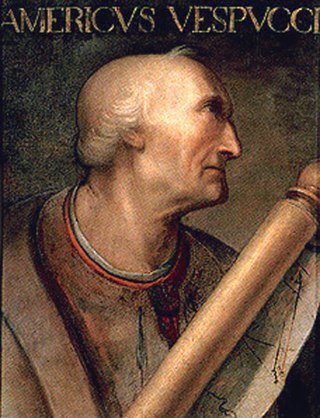 7
Amerigo Vespucci was an Italian explorer and navigator from the Republic of Florence, from whose name the term "America" is derived.
7
Amerigo Vespucci was an Italian explorer and navigator from the Republic of Florence, from whose name the term "America" is derived.
Federico García Lorca
 7
Federico del Sagrado Corazón de Jesús García Lorca, known as Federico García Lorca, was a Spanish poet, playwright, and theatre director. García Lorca achieved international recognition as an emblematic member of the Generation of '27, a group consisting mostly of poets who introduced the tenets of European movements into Spanish literature.
7
Federico del Sagrado Corazón de Jesús García Lorca, known as Federico García Lorca, was a Spanish poet, playwright, and theatre director. García Lorca achieved international recognition as an emblematic member of the Generation of '27, a group consisting mostly of poets who introduced the tenets of European movements into Spanish literature.
Matthew the Apostle
 7
Matthew the Apostle is named in the New Testament as one of the twelve apostles of Jesus. According to Christian traditions, he was also one of the four Evangelists as author of the Gospel of Matthew, and thus is also known as Matthew the Evangelist.
7
Matthew the Apostle is named in the New Testament as one of the twelve apostles of Jesus. According to Christian traditions, he was also one of the four Evangelists as author of the Gospel of Matthew, and thus is also known as Matthew the Evangelist.
Louis Braille
 7
Louis Braille was a French educator and the inventor of a reading and writing system named after him, braille, intended for use by visually impaired people. His system is used worldwide and remains virtually unchanged to this day.
7
Louis Braille was a French educator and the inventor of a reading and writing system named after him, braille, intended for use by visually impaired people. His system is used worldwide and remains virtually unchanged to this day.
Émile Zola
 7
Émile Édouard Charles Antoine Zola was a French novelist, journalist, playwright, the best-known practitioner of the literary school of naturalism, and an important contributor to the development of theatrical naturalism. He was a major figure in the political liberalization of France and in the exoneration of the falsely accused and convicted army officer Alfred Dreyfus, which is encapsulated in his renowned newspaper opinion headlined J'Accuse…! Zola was nominated for the first and second Nobel Prize in Literature in 1901 and 1902.
7
Émile Édouard Charles Antoine Zola was a French novelist, journalist, playwright, the best-known practitioner of the literary school of naturalism, and an important contributor to the development of theatrical naturalism. He was a major figure in the political liberalization of France and in the exoneration of the falsely accused and convicted army officer Alfred Dreyfus, which is encapsulated in his renowned newspaper opinion headlined J'Accuse…! Zola was nominated for the first and second Nobel Prize in Literature in 1901 and 1902.
Francis Xavier
 7
Francis Xavier, SJ, venerated as Saint Francis Xavier, was a Spanish Catholic missionary and saint who co-founded the Society of Jesus and, as a representative of the Portuguese Empire, led the first Christian mission to Japan.
7
Francis Xavier, SJ, venerated as Saint Francis Xavier, was a Spanish Catholic missionary and saint who co-founded the Society of Jesus and, as a representative of the Portuguese Empire, led the first Christian mission to Japan.
Pope Pius XII
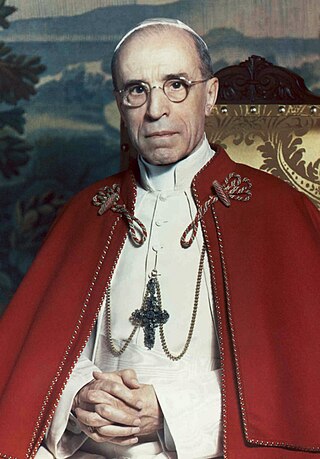 7
Pope Pius XII was head of the Catholic Church and sovereign of the Vatican City State from 2 March 1939 until his death in October 1958. Before his election to the papacy, he served as secretary of the Department of Extraordinary Ecclesiastical Affairs, papal nuncio to Germany, and Cardinal Secretary of State, in which capacity he worked to conclude treaties with various European and Latin American nations, including the Reichskonkordat treaty with the German Reich.
7
Pope Pius XII was head of the Catholic Church and sovereign of the Vatican City State from 2 March 1939 until his death in October 1958. Before his election to the papacy, he served as secretary of the Department of Extraordinary Ecclesiastical Affairs, papal nuncio to Germany, and Cardinal Secretary of State, in which capacity he worked to conclude treaties with various European and Latin American nations, including the Reichskonkordat treaty with the German Reich.
Antonio José de Sucre
 7
Antonio José de Sucre y Alcalá, known as the "Gran Mariscal de Ayacucho", was a Venezuelan general and politician who served as the president of Bolivia from 1825 to 1828. A close friend and associate of Simón Bolívar, he was one of the primary leaders of South America's struggle for independence from the Spanish Empire.
7
Antonio José de Sucre y Alcalá, known as the "Gran Mariscal de Ayacucho", was a Venezuelan general and politician who served as the president of Bolivia from 1825 to 1828. A close friend and associate of Simón Bolívar, he was one of the primary leaders of South America's struggle for independence from the Spanish Empire.
Mikhail Lomonosov
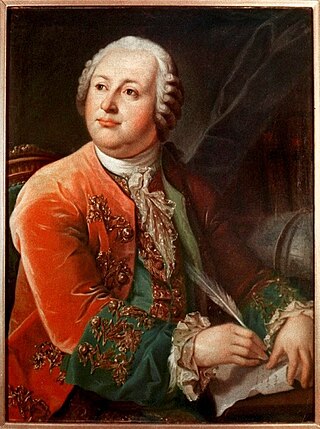 6
Mikhail Vasilyevich Lomonosov was a Russian polymath, scientist and writer, who made important contributions to literature, education, and science. Among his discoveries were the atmosphere of Venus and the law of conservation of mass in chemical reactions. His spheres of science were natural science, chemistry, physics, mineralogy, history, art, philology, optical devices and others. The founder of modern geology, Lomonosov was also a poet and influenced the formation of the modern Russian literary language.
6
Mikhail Vasilyevich Lomonosov was a Russian polymath, scientist and writer, who made important contributions to literature, education, and science. Among his discoveries were the atmosphere of Venus and the law of conservation of mass in chemical reactions. His spheres of science were natural science, chemistry, physics, mineralogy, history, art, philology, optical devices and others. The founder of modern geology, Lomonosov was also a poet and influenced the formation of the modern Russian literary language.
Nikolai Gogol
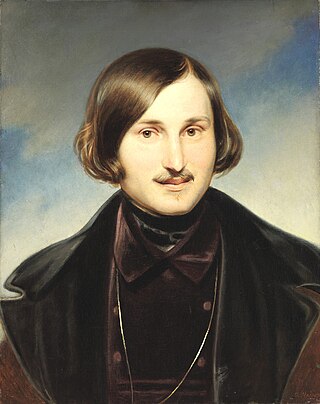 6
Nikolai Vasilyevich Gogol was a Russian novelist, short story writer, and playwright of Ukrainian origin.
6
Nikolai Vasilyevich Gogol was a Russian novelist, short story writer, and playwright of Ukrainian origin.
Avicenna
 6
Ibn Sina, commonly known in the West as Avicenna, was a preeminent philosopher and physician of the Muslim world, flourishing during the Islamic Golden Age, serving in the courts of various Iranian rulers. He is often described as the father of early modern medicine. His philosophy was of the Muslim Peripatetic school derived from Aristotelianism.
6
Ibn Sina, commonly known in the West as Avicenna, was a preeminent philosopher and physician of the Muslim world, flourishing during the Islamic Golden Age, serving in the courts of various Iranian rulers. He is often described as the father of early modern medicine. His philosophy was of the Muslim Peripatetic school derived from Aristotelianism.
Trajan
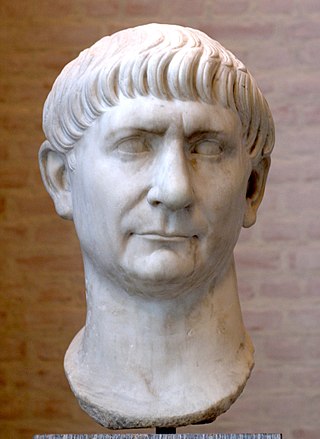 6
Trajan was a Roman emperor from AD 98 to 117, the second of the Five Good Emperors of the Nerva–Antonine dynasty. He was a philanthropic ruler and a successful soldier-emperor who led the Roman Empire to its greatest territorial extent by the time of his death. He was given the title of Optimus by the Roman Senate.
6
Trajan was a Roman emperor from AD 98 to 117, the second of the Five Good Emperors of the Nerva–Antonine dynasty. He was a philanthropic ruler and a successful soldier-emperor who led the Roman Empire to its greatest territorial extent by the time of his death. He was given the title of Optimus by the Roman Senate.
Olof Palme
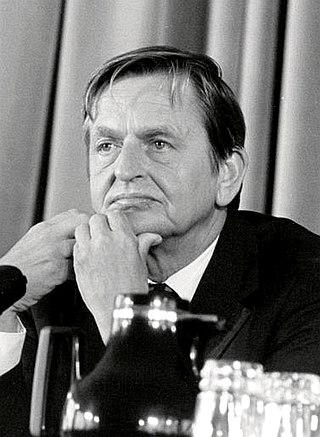 6
Sven Olof Joachim Palme was a Swedish politician and statesman who served as Prime Minister of Sweden from 1969 to 1976 and 1982 to 1986. Palme led the Swedish Social Democratic Party from 1969 until his assassination in 1986.
6
Sven Olof Joachim Palme was a Swedish politician and statesman who served as Prime Minister of Sweden from 1969 to 1976 and 1982 to 1986. Palme led the Swedish Social Democratic Party from 1969 until his assassination in 1986.
Constantine the Great
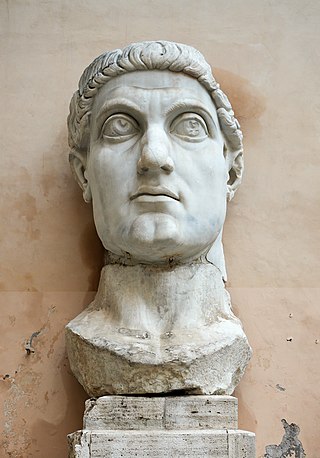 6
Constantine I, also known as Constantine the Great, was a Roman emperor from AD 306 to 337 and the first Roman emperor to convert to Christianity. He played a pivotal role in elevating the status of Christianity in Rome, decriminalizing Christian practice and ceasing Christian persecution in a period referred to as the Constantinian shift. This initiated the cessation of the established ancient Roman religion. Constantine is also the originator of the religiopolitical ideology known as Constantinism, which epitomizes the unity of church and state, as opposed to separation of church and state. He founded the city of Constantinople and made it the capital of the Empire, which remained so for over a millenium.
6
Constantine I, also known as Constantine the Great, was a Roman emperor from AD 306 to 337 and the first Roman emperor to convert to Christianity. He played a pivotal role in elevating the status of Christianity in Rome, decriminalizing Christian practice and ceasing Christian persecution in a period referred to as the Constantinian shift. This initiated the cessation of the established ancient Roman religion. Constantine is also the originator of the religiopolitical ideology known as Constantinism, which epitomizes the unity of church and state, as opposed to separation of church and state. He founded the city of Constantinople and made it the capital of the Empire, which remained so for over a millenium.
Ivan Pavlov
 6
Ivan Petrovich Pavlov was a Russian and Soviet experimental neurologist and physiologist known for his discovery of classical conditioning through his experiments with dogs.
6
Ivan Petrovich Pavlov was a Russian and Soviet experimental neurologist and physiologist known for his discovery of classical conditioning through his experiments with dogs.
Alexander Suvorov
 6
Count Alexander Vasilyevich Suvorov-Rymniksky, Prince of Italy, was a Russian general and military theorist in the service of the Russian Empire.
6
Count Alexander Vasilyevich Suvorov-Rymniksky, Prince of Italy, was a Russian general and military theorist in the service of the Russian Empire.
Plato
 6
Plato, born Aristocles, was an ancient Greek philosopher of the Classical period who is considered a foundational thinker in Western philosophy and an innovator of the written dialogue and dialectic forms. He raised problems for what became all the major areas of both theoretical philosophy and practical philosophy, and was the founder of the Platonic Academy, a philosophical school in Athens where Plato taught the doctrines that would later become known as Platonism.
6
Plato, born Aristocles, was an ancient Greek philosopher of the Classical period who is considered a foundational thinker in Western philosophy and an innovator of the written dialogue and dialectic forms. He raised problems for what became all the major areas of both theoretical philosophy and practical philosophy, and was the founder of the Platonic Academy, a philosophical school in Athens where Plato taught the doctrines that would later become known as Platonism.
Béla Bartók
 6
Béla Viktor János Bartók was a Hungarian composer, pianist and ethnomusicologist. He is considered one of the most important composers of the 20th century; he and Franz Liszt are regarded as Hungary's greatest composers. Through his collection and analytical study of folk music, he was one of the founders of comparative musicology, which later became known as ethnomusicology.
6
Béla Viktor János Bartók was a Hungarian composer, pianist and ethnomusicologist. He is considered one of the most important composers of the 20th century; he and Franz Liszt are regarded as Hungary's greatest composers. Through his collection and analytical study of folk music, he was one of the founders of comparative musicology, which later became known as ethnomusicology.
Josip Broz Tito
 6
Josip Broz, commonly known as Tito, was a Yugoslav communist revolutionary and politician who served in various positions of national leadership from 1943 until his death in 1980. During World War II, he led the Yugoslav Partisans, often regarded as the most effective resistance movement in German-occupied Europe. He also served as prime minister from 2 November 1944 to 29 June 1963 and president of the Socialist Federal Republic of Yugoslavia from 14 January 1953 until his death. His political ideology and policies are known as Titoism.
6
Josip Broz, commonly known as Tito, was a Yugoslav communist revolutionary and politician who served in various positions of national leadership from 1943 until his death in 1980. During World War II, he led the Yugoslav Partisans, often regarded as the most effective resistance movement in German-occupied Europe. He also served as prime minister from 2 November 1944 to 29 June 1963 and president of the Socialist Federal Republic of Yugoslavia from 14 January 1953 until his death. His political ideology and policies are known as Titoism.
Teresa Urrea
 6
Teresa Urrea, often referred to as Teresita and also known as Santa Teresa or La Santa de Cábora among the Mayo, was a Mexican mystic, folk healer, and revolutionary insurgent.
6
Teresa Urrea, often referred to as Teresita and also known as Santa Teresa or La Santa de Cábora among the Mayo, was a Mexican mystic, folk healer, and revolutionary insurgent.
Louis of Toulouse
 6
Saint Louis of Toulouse, also known as Louis of Anjou, was a Neapolitan prince of the Capetian House of Anjou and a Catholic bishop.
6
Saint Louis of Toulouse, also known as Louis of Anjou, was a Neapolitan prince of the Capetian House of Anjou and a Catholic bishop.
André-Marie Ampère
 6
André-Marie Ampère was a French physicist and mathematician who was one of the founders of the science of classical electromagnetism, which he referred to as "electrodynamics". He is also the inventor of numerous applications, such as the solenoid and the electrical telegraph. As an autodidact, Ampère was a member of the French Academy of Sciences and professor at the École polytechnique and the Collège de France.
6
André-Marie Ampère was a French physicist and mathematician who was one of the founders of the science of classical electromagnetism, which he referred to as "electrodynamics". He is also the inventor of numerous applications, such as the solenoid and the electrical telegraph. As an autodidact, Ampère was a member of the French Academy of Sciences and professor at the École polytechnique and the Collège de France.
Salvador Dalí
 6
Salvador Domingo Felipe Jacinto Dalí i Domènech, Marquess of Dalí of Púbol, known as Salvador Dalí, was a Spanish surrealist artist renowned for his technical skill, precise draftsmanship, and the striking and bizarre images in his work.
6
Salvador Domingo Felipe Jacinto Dalí i Domènech, Marquess of Dalí of Púbol, known as Salvador Dalí, was a Spanish surrealist artist renowned for his technical skill, precise draftsmanship, and the striking and bizarre images in his work.
Julius Caesar
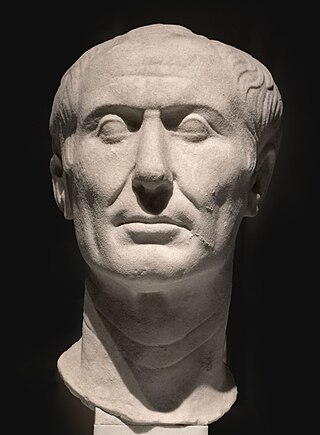 6
Gaius Julius Caesar was a Roman general and statesman. A member of the First Triumvirate, Caesar led the Roman armies in the Gallic Wars before defeating his political rival Pompey in a civil war, and subsequently became dictator from 49 BC until his assassination in 44 BC. He played a critical role in the events that led to the demise of the Roman Republic and the rise of the Roman Empire.
6
Gaius Julius Caesar was a Roman general and statesman. A member of the First Triumvirate, Caesar led the Roman armies in the Gallic Wars before defeating his political rival Pompey in a civil war, and subsequently became dictator from 49 BC until his assassination in 44 BC. He played a critical role in the events that led to the demise of the Roman Republic and the rise of the Roman Empire.
Augustus
 6
Gaius Julius Caesar Augustus, also known as Octavian, was the founder of the Roman Empire. He reigned as the first Roman emperor from 27 BC until his death in AD 14. The reign of Augustus initiated an imperial cult, as well as an era of imperial peace in which the Roman world was largely free of armed conflict. The Principate system of government was established during his reign and lasted until the Crisis of the Third Century.
6
Gaius Julius Caesar Augustus, also known as Octavian, was the founder of the Roman Empire. He reigned as the first Roman emperor from 27 BC until his death in AD 14. The reign of Augustus initiated an imperial cult, as well as an era of imperial peace in which the Roman world was largely free of armed conflict. The Principate system of government was established during his reign and lasted until the Crisis of the Third Century.
Georges Bizet
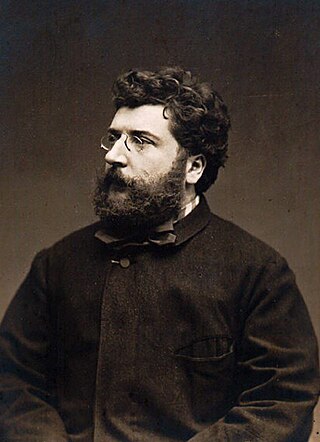 6
Georges Bizet was a French composer of the Romantic era. Best known for his operas in a career cut short by his early death, Bizet achieved few successes before his final work, Carmen, which has become one of the most popular and frequently performed works in the entire opera repertoire.
6
Georges Bizet was a French composer of the Romantic era. Best known for his operas in a career cut short by his early death, Bizet achieved few successes before his final work, Carmen, which has become one of the most popular and frequently performed works in the entire opera repertoire.
Claude Monet
 6
Oscar-Claude Monet was a French painter and founder of impressionist painting who is seen as a key precursor to modernism, especially in his attempts to paint nature as he perceived it. During his long career, he was the most consistent and prolific practitioner of impressionism's philosophy of expressing one's perceptions of nature, especially as applied to plein air (outdoor) landscape painting. The term "Impressionism" is derived from the title of his painting Impression, soleil levant, exhibited in 1874 initiated by Monet and his associates as an alternative to the Salon.
6
Oscar-Claude Monet was a French painter and founder of impressionist painting who is seen as a key precursor to modernism, especially in his attempts to paint nature as he perceived it. During his long career, he was the most consistent and prolific practitioner of impressionism's philosophy of expressing one's perceptions of nature, especially as applied to plein air (outdoor) landscape painting. The term "Impressionism" is derived from the title of his painting Impression, soleil levant, exhibited in 1874 initiated by Monet and his associates as an alternative to the Salon.
Charles Lindbergh
 6
Charles Augustus Lindbergh was an American aviator and military officer. On May 20–21, 1927, he made the first nonstop flight from New York City to Paris, a distance of 3,600 miles (5,800 km), flying alone for 33.5 hours. His aircraft, the Spirit of St. Louis, was designed and built by the Ryan Airline Company specifically to compete for the Orteig Prize for the first flight between the two cities. Although not the first transatlantic flight, it was the first solo transatlantic flight and the longest at the time by nearly 2,000 miles (3,200 km). It became known as one of the most consequential flights in history and ushered in a new era of air transportation between parts of the globe.
6
Charles Augustus Lindbergh was an American aviator and military officer. On May 20–21, 1927, he made the first nonstop flight from New York City to Paris, a distance of 3,600 miles (5,800 km), flying alone for 33.5 hours. His aircraft, the Spirit of St. Louis, was designed and built by the Ryan Airline Company specifically to compete for the Orteig Prize for the first flight between the two cities. Although not the first transatlantic flight, it was the first solo transatlantic flight and the longest at the time by nearly 2,000 miles (3,200 km). It became known as one of the most consequential flights in history and ushered in a new era of air transportation between parts of the globe.
Agatha of Sicily
 6
Agatha of Sicily is a Christian saint. Her feast is on 5 February. Agatha was born in Catania, part of the Roman Province of Sicily, and was martyred c. 251. She is one of several virgin martyrs who are commemorated by name in the Canon of the Mass.
6
Agatha of Sicily is a Christian saint. Her feast is on 5 February. Agatha was born in Catania, part of the Roman Province of Sicily, and was martyred c. 251. She is one of several virgin martyrs who are commemorated by name in the Canon of the Mass.
William Shakespeare
 6
William Shakespeare was an English playwright, poet, and actor. He is widely regarded as the greatest writer in the English language and the world's pre-eminent dramatist. He is often called England's national poet and the "Bard of Avon". His extant works, including collaborations, consist of some 39 plays, 154 sonnets, three long narrative poems, and a few other verses, some of uncertain authorship. His plays have been translated into every major living language and are performed more often than those of any other playwright. Shakespeare remains one of the most influential writers in the English language, and his works continue to be studied and reinterpreted.
6
William Shakespeare was an English playwright, poet, and actor. He is widely regarded as the greatest writer in the English language and the world's pre-eminent dramatist. He is often called England's national poet and the "Bard of Avon". His extant works, including collaborations, consist of some 39 plays, 154 sonnets, three long narrative poems, and a few other verses, some of uncertain authorship. His plays have been translated into every major living language and are performed more often than those of any other playwright. Shakespeare remains one of the most influential writers in the English language, and his works continue to be studied and reinterpreted.
Mary Magdalene
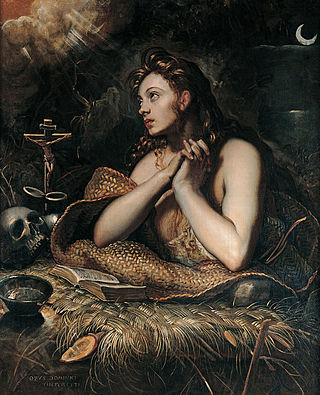 6
Mary Magdalene was a woman who, according to the four canonical gospels, traveled with Jesus as one of his followers and was a witness to his crucifixion and resurrection. She is mentioned by name twelve times in the canonical gospels, more than most of the apostles and more than any other woman in the gospels, other than Jesus's family. Mary's epithet Magdalene may be a toponymic surname, meaning that she came from the town of Magdala, a fishing town on the western shore of the Sea of Galilee in Roman Judea.
6
Mary Magdalene was a woman who, according to the four canonical gospels, traveled with Jesus as one of his followers and was a witness to his crucifixion and resurrection. She is mentioned by name twelve times in the canonical gospels, more than most of the apostles and more than any other woman in the gospels, other than Jesus's family. Mary's epithet Magdalene may be a toponymic surname, meaning that she came from the town of Magdala, a fishing town on the western shore of the Sea of Galilee in Roman Judea.
Albertus Magnus
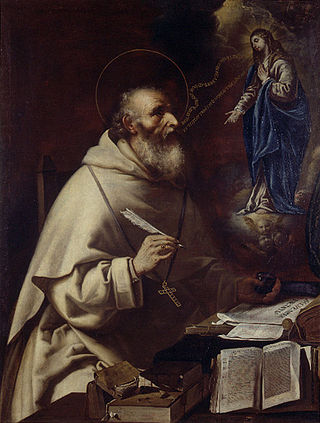 6
Albertus Magnus, also known as Saint Albert the Great, Albert of Swabia
or Albert of Cologne, was a German Dominican friar, philosopher, scientist, and bishop, considered one of the greatest medieval philosophers and thinkers.
6
Albertus Magnus, also known as Saint Albert the Great, Albert of Swabia
or Albert of Cologne, was a German Dominican friar, philosopher, scientist, and bishop, considered one of the greatest medieval philosophers and thinkers.
Blaise Pascal
 6
Blaise Pascal was a French mathematician, physicist, inventor, philosopher, and Catholic writer.
6
Blaise Pascal was a French mathematician, physicist, inventor, philosopher, and Catholic writer.
Jean-Jacques Rousseau
 6
Jean-Jacques Rousseau was a Genevan philosopher (philosophe), writer, and composer. His political philosophy influenced the progress of the Age of Enlightenment throughout Europe, as well as aspects of the French Revolution and the development of modern political, economic, and educational thought.
6
Jean-Jacques Rousseau was a Genevan philosopher (philosophe), writer, and composer. His political philosophy influenced the progress of the Age of Enlightenment throughout Europe, as well as aspects of the French Revolution and the development of modern political, economic, and educational thought.
Louis IX of France
 6
Louis IX, commonly revered as Saint Louis, was King of France from 1226 until his death in 1270. He is widely recognized as the most distinguished of the Direct Capetians. Following the death of his father, Louis VIII, he was crowned in Reims at the age of 12. His mother, Blanche of Castile, effectively ruled the kingdom as regent until he came of age and continued to serve as his trusted adviser until her death. During his formative years, Blanche successfully confronted rebellious vassals and championed the Capetian cause in the Albigensian Crusade, which had been ongoing for the past two decades.
6
Louis IX, commonly revered as Saint Louis, was King of France from 1226 until his death in 1270. He is widely recognized as the most distinguished of the Direct Capetians. Following the death of his father, Louis VIII, he was crowned in Reims at the age of 12. His mother, Blanche of Castile, effectively ruled the kingdom as regent until he came of age and continued to serve as his trusted adviser until her death. During his formative years, Blanche successfully confronted rebellious vassals and championed the Capetian cause in the Albigensian Crusade, which had been ongoing for the past two decades.
Elijah
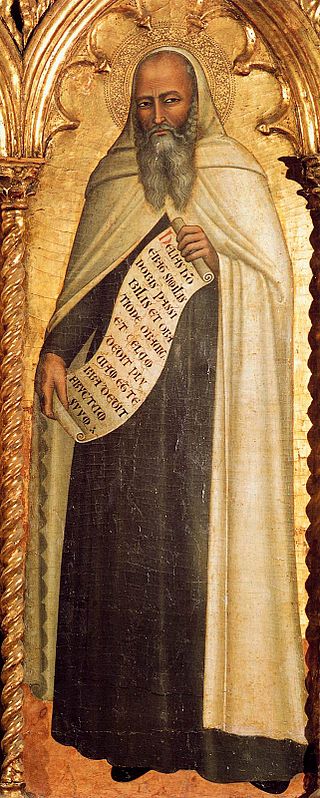 6
Elijah was, according to the Books of Kings in the Hebrew Bible, a prophet and a miracle worker who lived in the northern kingdom of Israel during the reign of King Ahab.
6
Elijah was, according to the Books of Kings in the Hebrew Bible, a prophet and a miracle worker who lived in the northern kingdom of Israel during the reign of King Ahab.
Clement of Rome
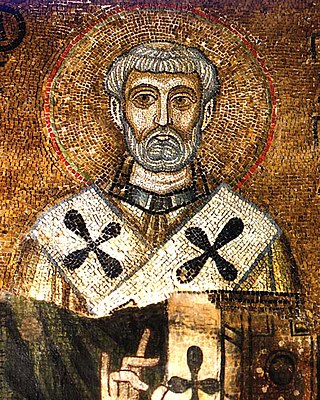 6
Clement of Rome, also known as Pope Clement I, was the bishop of Rome in the late first century AD. He is listed by Irenaeus and Tertullian as the bishop of Rome, holding office from 88 AD to his death in 99 AD. He is considered to be the first Apostolic Father of the Church, one of the three chief ones together with Polycarp and Ignatius of Antioch.
6
Clement of Rome, also known as Pope Clement I, was the bishop of Rome in the late first century AD. He is listed by Irenaeus and Tertullian as the bishop of Rome, holding office from 88 AD to his death in 99 AD. He is considered to be the first Apostolic Father of the Church, one of the three chief ones together with Polycarp and Ignatius of Antioch.
Vasco da Gama
 6
Vasco da Gama, 1st Count of Vidigueira, was a Portuguese explorer and the first European to reach India by sea.
6
Vasco da Gama, 1st Count of Vidigueira, was a Portuguese explorer and the first European to reach India by sea.
Saint Patrick
 6
Saint Patrick was a fifth-century Romano-British Christian missionary and bishop in Ireland. Known as the "Apostle of Ireland", he is the primary patron saint of Ireland, the other patron saints being Brigid of Kildare and Columba. Patrick was never formally canonised, having lived before the current laws of the Catholic Church in such matters. Nevertheless, he is venerated as a saint in the Catholic Church, the Lutheran Church, the Church of Ireland, and in the Eastern Orthodox Church, where he is regarded as equal-to-the-apostles and Enlightener of Ireland.
6
Saint Patrick was a fifth-century Romano-British Christian missionary and bishop in Ireland. Known as the "Apostle of Ireland", he is the primary patron saint of Ireland, the other patron saints being Brigid of Kildare and Columba. Patrick was never formally canonised, having lived before the current laws of the Catholic Church in such matters. Nevertheless, he is venerated as a saint in the Catholic Church, the Lutheran Church, the Church of Ireland, and in the Eastern Orthodox Church, where he is regarded as equal-to-the-apostles and Enlightener of Ireland.
Vincent van Gogh
 6
Vincent Willem van Gogh was a Dutch Post-Impressionist painter who is among the most famous and influential figures in the history of Western art. In just over a decade, he created approximately 2100 artworks, including around 860 oil paintings, most of them in the last two years of his life. His oeuvre includes landscapes, still lifes, portraits, and self-portraits, most of which are characterized by bold colors and dramatic brushwork that contributed to the rise of expressionism in modern art. Van Gogh's work was beginning to gain critical attention before he died at age 37, by what was suspected at the time to be a suicide. During his lifetime, only one of Van Gogh's paintings, The Red Vineyard, was sold.
6
Vincent Willem van Gogh was a Dutch Post-Impressionist painter who is among the most famous and influential figures in the history of Western art. In just over a decade, he created approximately 2100 artworks, including around 860 oil paintings, most of them in the last two years of his life. His oeuvre includes landscapes, still lifes, portraits, and self-portraits, most of which are characterized by bold colors and dramatic brushwork that contributed to the rise of expressionism in modern art. Van Gogh's work was beginning to gain critical attention before he died at age 37, by what was suspected at the time to be a suicide. During his lifetime, only one of Van Gogh's paintings, The Red Vineyard, was sold.
Jean Monnet
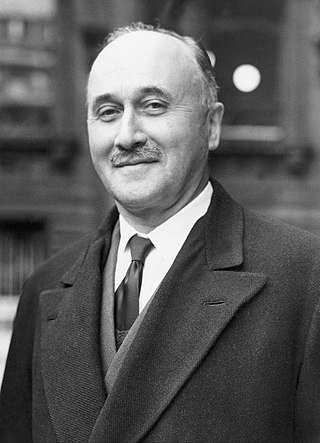 6
Jean Omer Marie Gabriel Monnet was a French civil servant, entrepreneur, diplomat, financier, administrator, and political visionary. An influential supporter of European unity, he is considered one of the founding fathers of the European Union.
6
Jean Omer Marie Gabriel Monnet was a French civil servant, entrepreneur, diplomat, financier, administrator, and political visionary. An influential supporter of European unity, he is considered one of the founding fathers of the European Union.
Charlemagne
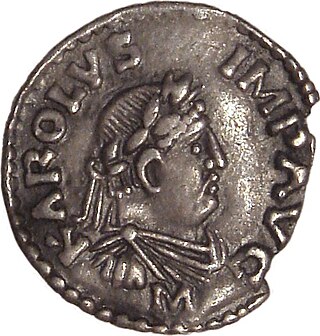 6
Charlemagne was King of the Franks from 768, King of the Lombards from 774, and Emperor of the Carolingian Empire from 800, holding all these titles until his death in 814. Charlemagne succeeded in uniting the majority of Western Central Europe, and was the first recognized emperor to rule in the west after the fall of the Western Roman Empire approximately three centuries earlier. Charlemagne's rule saw a program of political and social changes that had a lasting impact on Europe in the Middle Ages.
6
Charlemagne was King of the Franks from 768, King of the Lombards from 774, and Emperor of the Carolingian Empire from 800, holding all these titles until his death in 814. Charlemagne succeeded in uniting the majority of Western Central Europe, and was the first recognized emperor to rule in the west after the fall of the Western Roman Empire approximately three centuries earlier. Charlemagne's rule saw a program of political and social changes that had a lasting impact on Europe in the Middle Ages.
John of Nepomuk
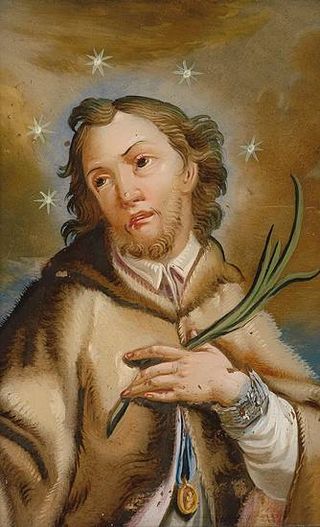 6
John of Nepomuk
was a saint of Bohemia who was drowned in the Vltava river at the behest of King Wenceslaus IV of Bohemia. Later accounts state that he was the confessor of the queen of Bohemia and refused to divulge the secrets of the confessional. On the basis of this account, John of Nepomuk is considered the first martyr of the Seal of the Confessional, a patron against calumnies and, because of the manner of his death, a protector from floods and drowning.
6
John of Nepomuk
was a saint of Bohemia who was drowned in the Vltava river at the behest of King Wenceslaus IV of Bohemia. Later accounts state that he was the confessor of the queen of Bohemia and refused to divulge the secrets of the confessional. On the basis of this account, John of Nepomuk is considered the first martyr of the Seal of the Confessional, a patron against calumnies and, because of the manner of his death, a protector from floods and drowning.
Gottlieb Daimler
 6
Gottlieb Wilhelm Daimler was a German engineer, industrial designer and industrialist born in Schorndorf, in what is now Germany. He was a pioneer of internal-combustion engines and automobile development. He invented the high-speed liquid petroleum-fueled engine.
6
Gottlieb Wilhelm Daimler was a German engineer, industrial designer and industrialist born in Schorndorf, in what is now Germany. He was a pioneer of internal-combustion engines and automobile development. He invented the high-speed liquid petroleum-fueled engine.
Immanuel Kant
 6
Immanuel Kant was a German philosopher and one of the central Enlightenment thinkers. Born in Königsberg, Kant's comprehensive and systematic works in epistemology, metaphysics, ethics, and aesthetics have made him one of the most influential and controversial figures in modern Western philosophy, being called the "father of modern ethics", the "father of modern aesthetics", and for bringing together rationalism and empiricism earned the title of "father of modern philosophy".
6
Immanuel Kant was a German philosopher and one of the central Enlightenment thinkers. Born in Königsberg, Kant's comprehensive and systematic works in epistemology, metaphysics, ethics, and aesthetics have made him one of the most influential and controversial figures in modern Western philosophy, being called the "father of modern ethics", the "father of modern aesthetics", and for bringing together rationalism and empiricism earned the title of "father of modern philosophy".
Rudolf Diesel
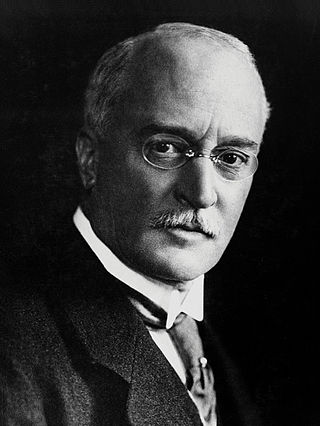 6
Rudolf Christian Karl Diesel was a German inventor and mechanical engineer who is famous for having invented the Diesel engine, which burns Diesel fuel; both are named after him.
6
Rudolf Christian Karl Diesel was a German inventor and mechanical engineer who is famous for having invented the Diesel engine, which burns Diesel fuel; both are named after him.
Leonard of Noblac
 6
Leonard of Noblac, is a Frankish saint closely associated with the town and abbey of Saint-Léonard-de-Noblat, in Haute-Vienne, in the Limousin region of France. He was converted to Christianity along with the king, at Christmas 496. Leonard became a hermit in the forest of Limousin, where he gathered a number of followers. Leonard or Lienard became one of the most venerated saints of the late Middle Ages. His intercession was credited with miracles for the release of prisoners, women in labour and the diseases of cattle.
6
Leonard of Noblac, is a Frankish saint closely associated with the town and abbey of Saint-Léonard-de-Noblat, in Haute-Vienne, in the Limousin region of France. He was converted to Christianity along with the king, at Christmas 496. Leonard became a hermit in the forest of Limousin, where he gathered a number of followers. Leonard or Lienard became one of the most venerated saints of the late Middle Ages. His intercession was credited with miracles for the release of prisoners, women in labour and the diseases of cattle.
Johannes Brahms
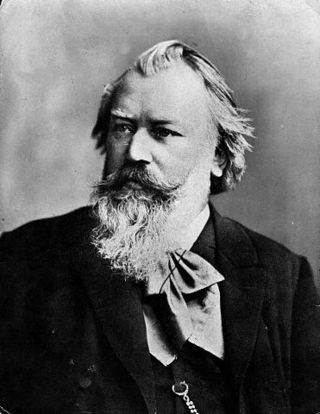 6
Johannes Brahms was a German composer, pianist, and conductor of the mid-Romantic period. Born in Hamburg into a Lutheran family, he spent much of his professional life in Vienna. He is sometimes grouped with Johann Sebastian Bach and Ludwig van Beethoven as one of the "Three Bs" of music, a comment originally made by the nineteenth-century conductor Hans von Bülow.
6
Johannes Brahms was a German composer, pianist, and conductor of the mid-Romantic period. Born in Hamburg into a Lutheran family, he spent much of his professional life in Vienna. He is sometimes grouped with Johann Sebastian Bach and Ludwig van Beethoven as one of the "Three Bs" of music, a comment originally made by the nineteenth-century conductor Hans von Bülow.
Joseph Haydn
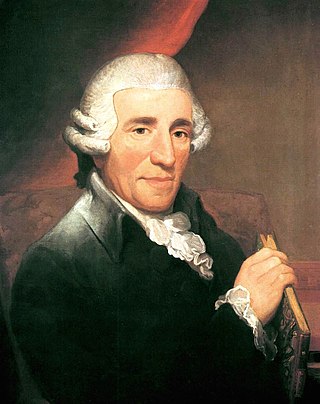 6
Franz Joseph Haydn was an Austrian composer of the Classical period. He was instrumental in the development of chamber music such as the string quartet and piano trio. His contributions to musical form have led him to be called "Father of the Symphony" and "Father of the String quartet".
6
Franz Joseph Haydn was an Austrian composer of the Classical period. He was instrumental in the development of chamber music such as the string quartet and piano trio. His contributions to musical form have led him to be called "Father of the Symphony" and "Father of the String quartet".
Raphael
 6
Raffaello Sanzio da Urbino, now generally known in English as Raphael, was an Italian painter and architect of the High Renaissance. His work is admired for its clarity of form, ease of composition, and visual achievement of the Neoplatonic ideal of human grandeur. Together with Leonardo da Vinci and Michelangelo, he forms the traditional trinity of great masters of that period.
6
Raffaello Sanzio da Urbino, now generally known in English as Raphael, was an Italian painter and architect of the High Renaissance. His work is admired for its clarity of form, ease of composition, and visual achievement of the Neoplatonic ideal of human grandeur. Together with Leonardo da Vinci and Michelangelo, he forms the traditional trinity of great masters of that period.
Lancelot
 6
Lancelot du Lac, also written as Launcelot and other variants, is a character in some versions of Arthurian legend where he is typically depicted as King Arthur's close companion and one of the greatest Knights of the Round Table. In the French-inspired Arthurian chivalric romance tradition, Lancelot is an orphaned son of King Ban of the lost kingdom of Benoic, raised in a fairy realm by the Lady of the Lake. A hero of many battles, quests and tournaments, and famed as a nearly unrivalled swordsman and jouster, Lancelot becomes the lord of the castle Joyous Gard and personal champion of Arthur's wife, Queen Guinevere, despite suffering from frequent and sometimes prolonged fits of madness. But when his adulterous affair with Guinevere is discovered, it causes a civil war that, once exploited by Mordred, brings an end to Arthur's kingdom.
6
Lancelot du Lac, also written as Launcelot and other variants, is a character in some versions of Arthurian legend where he is typically depicted as King Arthur's close companion and one of the greatest Knights of the Round Table. In the French-inspired Arthurian chivalric romance tradition, Lancelot is an orphaned son of King Ban of the lost kingdom of Benoic, raised in a fairy realm by the Lady of the Lake. A hero of many battles, quests and tournaments, and famed as a nearly unrivalled swordsman and jouster, Lancelot becomes the lord of the castle Joyous Gard and personal champion of Arthur's wife, Queen Guinevere, despite suffering from frequent and sometimes prolonged fits of madness. But when his adulterous affair with Guinevere is discovered, it causes a civil war that, once exploited by Mordred, brings an end to Arthur's kingdom.
Bernard Montgomery
 6
Field Marshal Bernard Law Montgomery, 1st Viscount Montgomery of Alamein,, nicknamed "Monty", was a senior British Army officer who served in the First World War, the Irish War of Independence and the Second World War.
6
Field Marshal Bernard Law Montgomery, 1st Viscount Montgomery of Alamein,, nicknamed "Monty", was a senior British Army officer who served in the First World War, the Irish War of Independence and the Second World War.
James Cook
 6
Captain James Cook was a British explorer, cartographer and naval officer famous for his three voyages between 1768 and 1779 in the Pacific Ocean and to New Zealand and Australia in particular. He made detailed maps of Newfoundland prior to making three voyages to the Pacific, during which he achieved the first recorded European contact with the eastern coastline of Australia and the Hawaiian Islands and the first recorded circumnavigation of New Zealand.
6
Captain James Cook was a British explorer, cartographer and naval officer famous for his three voyages between 1768 and 1779 in the Pacific Ocean and to New Zealand and Australia in particular. He made detailed maps of Newfoundland prior to making three voyages to the Pacific, during which he achieved the first recorded European contact with the eastern coastline of Australia and the Hawaiian Islands and the first recorded circumnavigation of New Zealand.
Alexandre Dumas
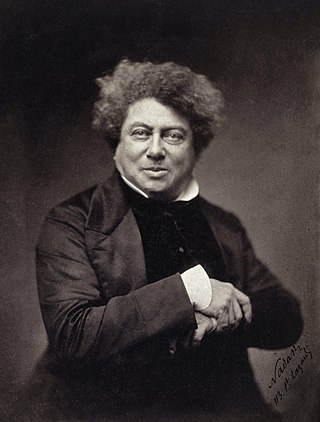 6
Alexandre Dumas, also known as Alexandre Dumas père, was a French novelist and playwright.
6
Alexandre Dumas, also known as Alexandre Dumas père, was a French novelist and playwright.
Ferdinand III of Castile
 6
Ferdinand III, called the Saint, was King of Castile from 1217 and King of León from 1230 as well as King of Galicia from 1231. He was the son of Alfonso IX of León and Berenguela of Castile. Through his second marriage he was also Count of Aumale. Ferdinand III was one of the most successful kings of Castile, securing not only the permanent union of the crowns of Castile and León, but also masterminding the most expansive southward territorial expansion campaign yet in the Guadalquivir Valley, in which Islamic rule was in disarray in the wake of the decline of the Almohad presence in the Iberian Peninsula. He was made a saint in 1671.
6
Ferdinand III, called the Saint, was King of Castile from 1217 and King of León from 1230 as well as King of Galicia from 1231. He was the son of Alfonso IX of León and Berenguela of Castile. Through his second marriage he was also Count of Aumale. Ferdinand III was one of the most successful kings of Castile, securing not only the permanent union of the crowns of Castile and León, but also masterminding the most expansive southward territorial expansion campaign yet in the Guadalquivir Valley, in which Islamic rule was in disarray in the wake of the decline of the Almohad presence in the Iberian Peninsula. He was made a saint in 1671.
Rubén Darío
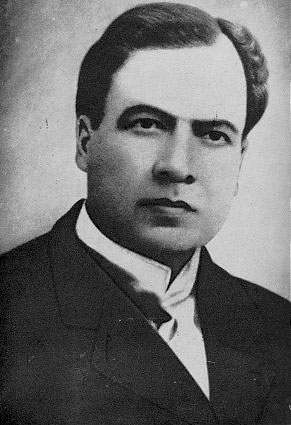 6
Félix Rubén García Sarmiento, known as Rubén Darío, was a Nicaraguan poet who initiated the Spanish-language literary movement known as modernismo (modernism) that flourished at the end of the 19th century. Darío had a great and lasting influence on 20th-century Spanish-language literature and journalism.
6
Félix Rubén García Sarmiento, known as Rubén Darío, was a Nicaraguan poet who initiated the Spanish-language literary movement known as modernismo (modernism) that flourished at the end of the 19th century. Darío had a great and lasting influence on 20th-century Spanish-language literature and journalism.
José Martí
 6
José Julián Martí Pérez was a Cuban nationalist, poet, philosopher, essayist, journalist, translator, professor, and publisher, who is considered a Cuban national hero because of his role in the liberation of his country from Spain. He was also an important figure in Latin American literature. He was very politically active and is considered an important philosopher and political theorist. Through his writings and political activity, he became a symbol of Cuba's bid for independence from the Spanish Empire in the 19th century, and is referred to as the "Apostle of Cuban Independence". From adolescence on, he dedicated his life to the promotion of liberty, political independence for Cuba, and intellectual independence for all Spanish Americans; his death was used as a cry for Cuban independence from Spain by both the Cuban revolutionaries and those Cubans previously reluctant to start a revolt.
6
José Julián Martí Pérez was a Cuban nationalist, poet, philosopher, essayist, journalist, translator, professor, and publisher, who is considered a Cuban national hero because of his role in the liberation of his country from Spain. He was also an important figure in Latin American literature. He was very politically active and is considered an important philosopher and political theorist. Through his writings and political activity, he became a symbol of Cuba's bid for independence from the Spanish Empire in the 19th century, and is referred to as the "Apostle of Cuban Independence". From adolescence on, he dedicated his life to the promotion of liberty, political independence for Cuba, and intellectual independence for all Spanish Americans; his death was used as a cry for Cuban independence from Spain by both the Cuban revolutionaries and those Cubans previously reluctant to start a revolt.
Bernard of Clairvaux
 6
Bernard of Clairvaux, O. Cist., venerated as Saint Bernard, was an abbot, mystic, co-founder of the Knights Templar, and a major leader in the reformation of the Benedictine Order through the nascent Cistercian Order.
6
Bernard of Clairvaux, O. Cist., venerated as Saint Bernard, was an abbot, mystic, co-founder of the Knights Templar, and a major leader in the reformation of the Benedictine Order through the nascent Cistercian Order.
Rita of Cascia
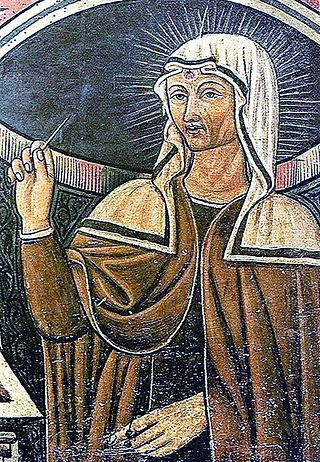 6
Rita of Cascia, OSA, was an Italian widow and Augustinian nun. After Rita's husband died, she joined an Augustinian community of religious sisters, where she was known both for practicing mortification of the flesh and for the efficacy of her prayers. Various miracles are attributed to her intercession, and she is often portrayed with a bleeding wound on her forehead, which is understood to indicate a partial stigmata.
6
Rita of Cascia, OSA, was an Italian widow and Augustinian nun. After Rita's husband died, she joined an Augustinian community of religious sisters, where she was known both for practicing mortification of the flesh and for the efficacy of her prayers. Various miracles are attributed to her intercession, and she is often portrayed with a bleeding wound on her forehead, which is understood to indicate a partial stigmata.
Roque González y de Santa Cruz
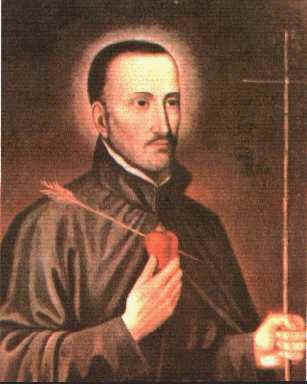 6
Roque González de Santa Cruz, SJ was a Jesuit priest who was the first missionary among the Guarani people in Paraguay. He is honored as a martyr and saint by the Catholic Church.
6
Roque González de Santa Cruz, SJ was a Jesuit priest who was the first missionary among the Guarani people in Paraguay. He is honored as a martyr and saint by the Catholic Church.
Isabella I of Castile
 6
Isabella I, also called Isabella the Catholic, was Queen of Castile and León from 1474 until her death in 1504. She was also Queen of Aragon from 1479 until her death as the wife of King Ferdinand II. Reigning together over a dynastically unified Spain, Isabella and Ferdinand are known as the Catholic Monarchs.
6
Isabella I, also called Isabella the Catholic, was Queen of Castile and León from 1474 until her death in 1504. She was also Queen of Aragon from 1479 until her death as the wife of King Ferdinand II. Reigning together over a dynastically unified Spain, Isabella and Ferdinand are known as the Catholic Monarchs.
Gabriela Mistral
 6
Lucila Godoy Alcayaga, known by her pseudonym Gabriela Mistral, was a Chilean poet-diplomat, educator, and Catholic. She was a member of the Secular Franciscan Order or Third Franciscan order. She was the first Latin American author to receive a Nobel Prize in Literature in 1945, "for her lyric poetry which, inspired by powerful emotions, has made her name a symbol of the idealistic aspirations of the entire Latin American world". Some central themes in her poems are nature, betrayal, love, a mother's love, sorrow and recovery, travel, and Latin American identity as formed from a mixture of Native American and European influences. Her image is featured on the 5,000 Chilean peso banknote.
6
Lucila Godoy Alcayaga, known by her pseudonym Gabriela Mistral, was a Chilean poet-diplomat, educator, and Catholic. She was a member of the Secular Franciscan Order or Third Franciscan order. She was the first Latin American author to receive a Nobel Prize in Literature in 1945, "for her lyric poetry which, inspired by powerful emotions, has made her name a symbol of the idealistic aspirations of the entire Latin American world". Some central themes in her poems are nature, betrayal, love, a mother's love, sorrow and recovery, travel, and Latin American identity as formed from a mixture of Native American and European influences. Her image is featured on the 5,000 Chilean peso banknote.
Miguel de Cervantes
 6
Miguel de Cervantes Saavedra was an Early Modern Spanish writer widely regarded as the greatest writer in the Spanish language and one of the world's pre-eminent novelists. He is best known for his novel Don Quixote, a work often cited as both the first modern novel and "the first great novel of world literature". A 2002 poll of 100 well-known authors voted it the "best book of all time", as voted by the judges from among the "best and most central works in world literature".
6
Miguel de Cervantes Saavedra was an Early Modern Spanish writer widely regarded as the greatest writer in the Spanish language and one of the world's pre-eminent novelists. He is best known for his novel Don Quixote, a work often cited as both the first modern novel and "the first great novel of world literature". A 2002 poll of 100 well-known authors voted it the "best book of all time", as voted by the judges from among the "best and most central works in world literature".
Pyotr Ilyich Tchaikovsky
 5
Pyotr Ilyich Tchaikovsky was a Russian composer of the Romantic period. He was the first Russian composer whose music would make a lasting impression internationally. Tchaikovsky wrote some of the most popular concert and theatrical music in the current classical repertoire, including the ballets Swan Lake and The Nutcracker, the 1812 Overture, his First Piano Concerto, Violin Concerto, the Romeo and Juliet Overture-Fantasy, several symphonies, and the opera Eugene Onegin.
5
Pyotr Ilyich Tchaikovsky was a Russian composer of the Romantic period. He was the first Russian composer whose music would make a lasting impression internationally. Tchaikovsky wrote some of the most popular concert and theatrical music in the current classical repertoire, including the ballets Swan Lake and The Nutcracker, the 1812 Overture, his First Piano Concerto, Violin Concerto, the Romeo and Juliet Overture-Fantasy, several symphonies, and the opera Eugene Onegin.
Ivan Michurin (biologist)
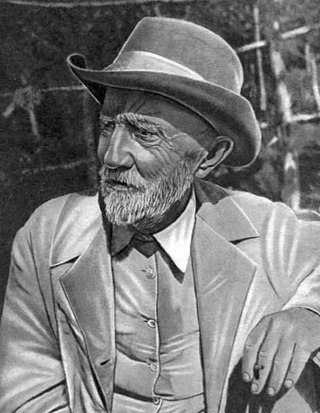 5
Ivan Vladimirovich Michurin was a Russian practitioner of selection to produce new types of crop plants, Honorable Member of the Soviet Academy of Sciences, and academician of the Lenin All-Union Academy of Agriculture.
5
Ivan Vladimirovich Michurin was a Russian practitioner of selection to produce new types of crop plants, Honorable Member of the Soviet Academy of Sciences, and academician of the Lenin All-Union Academy of Agriculture.
Taras Shevchenko
 5
Taras Hryhorovych Shevchenko was a Ukrainian poet, writer, artist, public and political figure, folklorist and ethnographer. He was a fellow of the Imperial Academy of Arts and a member of the Brotherhood of Saints Cyril and Methodius. He wrote poetry in Ukrainian and prose in Russian.
5
Taras Hryhorovych Shevchenko was a Ukrainian poet, writer, artist, public and political figure, folklorist and ethnographer. He was a fellow of the Imperial Academy of Arts and a member of the Brotherhood of Saints Cyril and Methodius. He wrote poetry in Ukrainian and prose in Russian.
Mikhail Frunze
 5
Mikhail Vasilyevich Frunze was a Soviet revolutionary, politician, army officer and military theorist. Born to a Bessarabian father and a Russian mother in Russian Turkestan, Frunze attended the Saint Petersburg Polytechnical University and became an active member of the Russian Social Democratic Labour Party (RSDLP). Following the RSDLP ideological split, he sided with Vladimir Lenin's Bolshevik faction. He led the textile workers strike in Ivanovo during the 1905 Russian Revolution, for which he was later sentenced to death before being commuted to life-long hard labour in Siberia. He escaped ten years later and took active part in the 1917 February Revolution in Minsk and the October Revolution in Moscow.
5
Mikhail Vasilyevich Frunze was a Soviet revolutionary, politician, army officer and military theorist. Born to a Bessarabian father and a Russian mother in Russian Turkestan, Frunze attended the Saint Petersburg Polytechnical University and became an active member of the Russian Social Democratic Labour Party (RSDLP). Following the RSDLP ideological split, he sided with Vladimir Lenin's Bolshevik faction. He led the textile workers strike in Ivanovo during the 1905 Russian Revolution, for which he was later sentenced to death before being commuted to life-long hard labour in Siberia. He escaped ten years later and took active part in the 1917 February Revolution in Minsk and the October Revolution in Moscow.
Lajos Kossuth
 5
Lajos Kossuth de Udvard et Kossuthfalva was a Hungarian nobleman, lawyer, journalist, politician, statesman and governor-president of the Kingdom of Hungary during the revolution of 1848–1849.
5
Lajos Kossuth de Udvard et Kossuthfalva was a Hungarian nobleman, lawyer, journalist, politician, statesman and governor-president of the Kingdom of Hungary during the revolution of 1848–1849.
L. L. Zamenhof
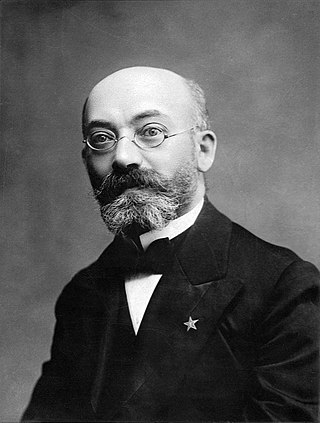 5
L. L. Zamenhof was the creator of Esperanto, the most widely used constructed international auxiliary language.
5
L. L. Zamenhof was the creator of Esperanto, the most widely used constructed international auxiliary language.
Shota Rustaveli
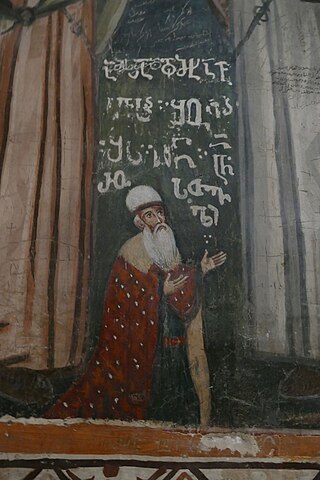 5
Shota Rustaveli, mononymously known simply as Rustaveli, was a medieval Georgian poet. He is considered to be the pre-eminent poet of the Georgian Golden Age and one of the greatest contributors to Georgian literature. Rustaveli was the author of The Knight in the Panther's Skin, a Georgian national epic poem.
5
Shota Rustaveli, mononymously known simply as Rustaveli, was a medieval Georgian poet. He is considered to be the pre-eminent poet of the Georgian Golden Age and one of the greatest contributors to Georgian literature. Rustaveli was the author of The Knight in the Panther's Skin, a Georgian national epic poem.
Alexander Graham Bell
 5
Alexander Graham Bell was a Scottish-born Canadian-American inventor, scientist and engineer who is credited with patenting the first practical telephone. He also co-founded the American Telephone and Telegraph Company (AT&T) in 1885.
5
Alexander Graham Bell was a Scottish-born Canadian-American inventor, scientist and engineer who is credited with patenting the first practical telephone. He also co-founded the American Telephone and Telegraph Company (AT&T) in 1885.
Marco Polo
 5
Marco Polo was a Venetian merchant, explorer and writer who travelled through Asia along the Silk Road between 1271 and 1295. His travels are recorded in The Travels of Marco Polo, a book that described to Europeans the then-mysterious culture and inner workings of the Eastern world, including the wealth and great size of the Mongol Empire and China under the Yuan dynasty, giving their first comprehensive look into China, Persia, India, Japan, and other locations throughout Asia.
5
Marco Polo was a Venetian merchant, explorer and writer who travelled through Asia along the Silk Road between 1271 and 1295. His travels are recorded in The Travels of Marco Polo, a book that described to Europeans the then-mysterious culture and inner workings of the Eastern world, including the wealth and great size of the Mongol Empire and China under the Yuan dynasty, giving their first comprehensive look into China, Persia, India, Japan, and other locations throughout Asia.
Anne Frank
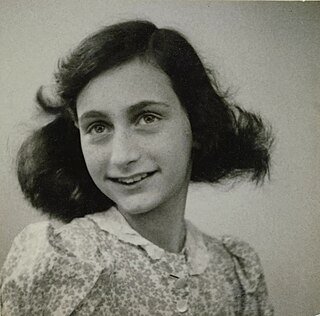 5
Annelies Marie Frank was a German-born Jewish girl who kept a diary in which she documented life in hiding under Nazi persecution during the German occupation of the Netherlands. She is a celebrated diarist who described everyday life from her family hiding place in an Amsterdam attic. One of the most-discussed Jewish victims of the Holocaust, she gained fame posthumously with the 1947 publication of The Diary of a Young Girl, in which she documents her life in hiding from 1942 to 1944 — it is one of the world's best-known books and has been the basis for several plays and films.
5
Annelies Marie Frank was a German-born Jewish girl who kept a diary in which she documented life in hiding under Nazi persecution during the German occupation of the Netherlands. She is a celebrated diarist who described everyday life from her family hiding place in an Amsterdam attic. One of the most-discussed Jewish victims of the Holocaust, she gained fame posthumously with the 1947 publication of The Diary of a Young Girl, in which she documents her life in hiding from 1942 to 1944 — it is one of the world's best-known books and has been the basis for several plays and films.
Robert Baden-Powell, 1st Baron Baden-Powell
 5
Lieutenant-General Robert Stephenson Smyth Baden-Powell, 1st Baron Baden-Powell, was a British Army officer, writer, founder and first Chief Scout of the world-wide Scout Movement, and founder, with his sister Agnes, of the world-wide Girl Guide/Girl Scout Movement. Baden-Powell wrote the seminal work Scouting for Boys, which, with his previous 1899 book Aids to Scouting for N.-C.Os and Men captured the imagination of the boys of Britain and led to the creation of the Scout Movement.
5
Lieutenant-General Robert Stephenson Smyth Baden-Powell, 1st Baron Baden-Powell, was a British Army officer, writer, founder and first Chief Scout of the world-wide Scout Movement, and founder, with his sister Agnes, of the world-wide Girl Guide/Girl Scout Movement. Baden-Powell wrote the seminal work Scouting for Boys, which, with his previous 1899 book Aids to Scouting for N.-C.Os and Men captured the imagination of the boys of Britain and led to the creation of the Scout Movement.
Adam Mickiewicz
 5
Adam Bernard Mickiewicz was a Polish poet, dramatist, essayist, publicist, translator and political activist. He is regarded as national poet in Poland, Lithuania and Belarus. He also largely influenced Ukrainian literature. A principal figure in Polish Romanticism, he is one of Poland's "Three Bards" and is widely regarded as Poland's greatest poet. He is also considered one of the greatest Slavic and European poets and has been dubbed a "Slavic bard". A leading Romantic dramatist, he has been compared in Poland and Europe to Byron and Goethe.
5
Adam Bernard Mickiewicz was a Polish poet, dramatist, essayist, publicist, translator and political activist. He is regarded as national poet in Poland, Lithuania and Belarus. He also largely influenced Ukrainian literature. A principal figure in Polish Romanticism, he is one of Poland's "Three Bards" and is widely regarded as Poland's greatest poet. He is also considered one of the greatest Slavic and European poets and has been dubbed a "Slavic bard". A leading Romantic dramatist, he has been compared in Poland and Europe to Byron and Goethe.
John Amos Comenius
 5
John Amos Comenius was a Moravian philosopher, pedagogue and theologian who is considered the father of modern education. He served as the last bishop of the Unity of the Brethren before becoming a religious refugee and one of the earliest champions of universal education, a concept eventually set forth in his book Didactica Magna. As an educator and theologian, he led schools and advised governments across Protestant Europe through the middle of the seventeenth century.
5
John Amos Comenius was a Moravian philosopher, pedagogue and theologian who is considered the father of modern education. He served as the last bishop of the Unity of the Brethren before becoming a religious refugee and one of the earliest champions of universal education, a concept eventually set forth in his book Didactica Magna. As an educator and theologian, he led schools and advised governments across Protestant Europe through the middle of the seventeenth century.
Sándor Petőfi
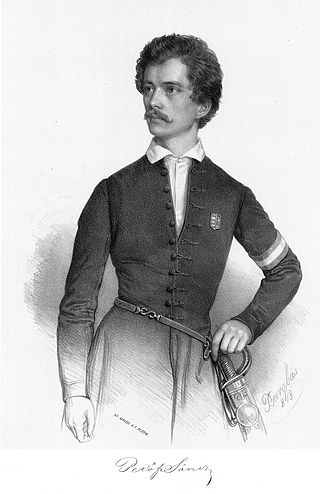 5
Sándor Petőfi was a Hungarian poet and liberal revolutionary. He is considered Hungary's national poet, and was one of the key figures of the Hungarian Revolution of 1848. He is the author of the Nemzeti dal, which is said to have inspired the revolution in the Kingdom of Hungary that grew into a war for independence from the Austrian Empire. It is most likely that he died in the Battle of Segesvár, one of the last battles of the war.
5
Sándor Petőfi was a Hungarian poet and liberal revolutionary. He is considered Hungary's national poet, and was one of the key figures of the Hungarian Revolution of 1848. He is the author of the Nemzeti dal, which is said to have inspired the revolution in the Kingdom of Hungary that grew into a war for independence from the Austrian Empire. It is most likely that he died in the Battle of Segesvár, one of the last battles of the war.
Martha
 5
Martha is a biblical figure described in the Gospels of Luke and John. Together with her siblings Lazarus and Mary of Bethany, she is described as living in the village of Bethany near Jerusalem. She was witness to Jesus resurrecting her brother, Lazarus.
5
Martha is a biblical figure described in the Gospels of Luke and John. Together with her siblings Lazarus and Mary of Bethany, she is described as living in the village of Bethany near Jerusalem. She was witness to Jesus resurrecting her brother, Lazarus.
Pope Gregory I
 5
Pope Gregory I, commonly known as Saint Gregory the Great, was the 64th Bishop of Rome from 3 September 590 to his death. He is known for instituting the first recorded large-scale mission from Rome, the Gregorian mission, to convert the then largely pagan Anglo-Saxons to Christianity. Gregory is also well known for his writings, which were more prolific than those of any of his predecessors as pope. The epithet Saint Gregory the Dialogist has been attached to him in Eastern Christianity because of his Dialogues. English translations of Eastern texts sometimes list him as Gregory "Dialogos" from the Greek διάλογος, or the Anglo-Latinate equivalent "Dialogus".
5
Pope Gregory I, commonly known as Saint Gregory the Great, was the 64th Bishop of Rome from 3 September 590 to his death. He is known for instituting the first recorded large-scale mission from Rome, the Gregorian mission, to convert the then largely pagan Anglo-Saxons to Christianity. Gregory is also well known for his writings, which were more prolific than those of any of his predecessors as pope. The epithet Saint Gregory the Dialogist has been attached to him in Eastern Christianity because of his Dialogues. English translations of Eastern texts sometimes list him as Gregory "Dialogos" from the Greek διάλογος, or the Anglo-Latinate equivalent "Dialogus".
Ella Fitzgerald
 5
Ella Jane Fitzgerald was an American jazz singer, sometimes referred to as the "First Lady of Song", "Queen of Jazz", and "Lady Ella". She was noted for her purity of tone, impeccable diction, phrasing, timing, intonation, and a "horn-like" improvisational ability, particularly in her scat singing.
5
Ella Jane Fitzgerald was an American jazz singer, sometimes referred to as the "First Lady of Song", "Queen of Jazz", and "Lady Ella". She was noted for her purity of tone, impeccable diction, phrasing, timing, intonation, and a "horn-like" improvisational ability, particularly in her scat singing.
Seneca the Younger
 5
Lucius Annaeus Seneca the Younger, usually known mononymously as Seneca, was a Stoic philosopher of Ancient Rome, a statesman, dramatist, and in one work, satirist, from the post-Augustan age of Latin literature.
5
Lucius Annaeus Seneca the Younger, usually known mononymously as Seneca, was a Stoic philosopher of Ancient Rome, a statesman, dramatist, and in one work, satirist, from the post-Augustan age of Latin literature.
Philip the Apostle
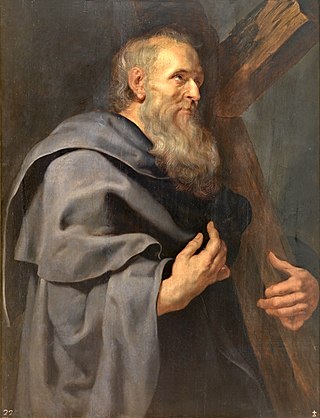 5
Philip the Apostle was one of the Twelve Apostles of Jesus according to the New Testament. Later Christian traditions describe Philip as the apostle who preached in Greece, Syria, and Asia-Minor.
5
Philip the Apostle was one of the Twelve Apostles of Jesus according to the New Testament. Later Christian traditions describe Philip as the apostle who preached in Greece, Syria, and Asia-Minor.
Philomena
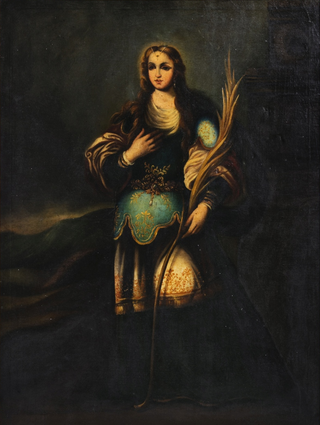 5
Philomena, also known as Saint Philomena or Philomena of Rome was a virgin martyr whose remains were discovered on May 24–25, 1802, in the Catacomb of Priscilla. Three tiles enclosing the tomb bore an inscription, Pax Tecum Filumena, that was taken to indicate that her name was Filumena, the English form of which is Philomena. Philomena is the patron saint of infants, babies, and youth, and is known as "The Wonderworker".
5
Philomena, also known as Saint Philomena or Philomena of Rome was a virgin martyr whose remains were discovered on May 24–25, 1802, in the Catacomb of Priscilla. Three tiles enclosing the tomb bore an inscription, Pax Tecum Filumena, that was taken to indicate that her name was Filumena, the English form of which is Philomena. Philomena is the patron saint of infants, babies, and youth, and is known as "The Wonderworker".
Joachim
 5
Joachim was, according to Christianity, the husband of Saint Anne, the father of Mary, mother of Jesus, and the maternal grandfather of Jesus.
5
Joachim was, according to Christianity, the husband of Saint Anne, the father of Mary, mother of Jesus, and the maternal grandfather of Jesus.
Pope Paul VI
 5
Pope Paul VI was head of the Catholic Church and sovereign of the Vatican City State from 21 June 1963 to his death in August 1978. Succeeding John XXIII, he continued the Second Vatican Council, which he closed in 1965, implementing its numerous reforms. He fostered improved ecumenical relations with Eastern Orthodox and Protestant churches, which resulted in many historic meetings and agreements. In January 1964, he flew to Jordan, the first time a reigning pontiff had left Italy in more than a century.
5
Pope Paul VI was head of the Catholic Church and sovereign of the Vatican City State from 21 June 1963 to his death in August 1978. Succeeding John XXIII, he continued the Second Vatican Council, which he closed in 1965, implementing its numerous reforms. He fostered improved ecumenical relations with Eastern Orthodox and Protestant churches, which resulted in many historic meetings and agreements. In January 1964, he flew to Jordan, the first time a reigning pontiff had left Italy in more than a century.
Vincent de Paul
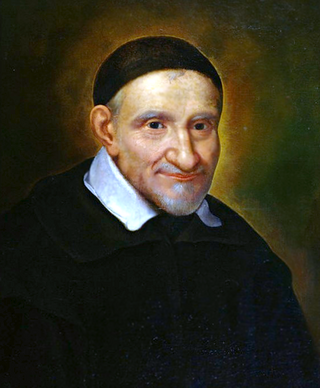 5
Vincent de Paul, CM, commonly known as Saint Vincent de Paul, was an Occitan French Catholic priest who dedicated himself to serving the poor.
5
Vincent de Paul, CM, commonly known as Saint Vincent de Paul, was an Occitan French Catholic priest who dedicated himself to serving the poor.
Vincent of Saragossa
 5
Vincent of Saragossa, the Protomartyr of Spain, was a deacon of the Church of Saragossa. He is the patron saint of Lisbon and Valencia. His feast day is 22 January in the Catholic Church and Anglican Communion and the Orthodox Church, with an additional commemoration on 11 November in the Orthodox Church. He was born at Huesca and martyred under the Emperor Diocletian around the year 304.
5
Vincent of Saragossa, the Protomartyr of Spain, was a deacon of the Church of Saragossa. He is the patron saint of Lisbon and Valencia. His feast day is 22 January in the Catholic Church and Anglican Communion and the Orthodox Church, with an additional commemoration on 11 November in the Orthodox Church. He was born at Huesca and martyred under the Emperor Diocletian around the year 304.
Hector Berlioz
 5
Louis-Hector Berlioz was a French Romantic composer and conductor. His output includes orchestral works such as the Symphonie fantastique and Harold in Italy, choral pieces including the Requiem and L'Enfance du Christ, his three operas Benvenuto Cellini, Les Troyens and Béatrice et Bénédict, and works of hybrid genres such as the "dramatic symphony" Roméo et Juliette and the "dramatic legend" La Damnation de Faust.
5
Louis-Hector Berlioz was a French Romantic composer and conductor. His output includes orchestral works such as the Symphonie fantastique and Harold in Italy, choral pieces including the Requiem and L'Enfance du Christ, his three operas Benvenuto Cellini, Les Troyens and Béatrice et Bénédict, and works of hybrid genres such as the "dramatic symphony" Roméo et Juliette and the "dramatic legend" La Damnation de Faust.
Albert Camus
 5
Albert Camus was a French philosopher, author, dramatist, journalist, world federalist, and political activist. He was the recipient of the 1957 Nobel Prize in Literature at the age of 44, the second-youngest recipient in history. His works include The Stranger, The Plague, The Myth of Sisyphus, The Fall and The Rebel.
5
Albert Camus was a French philosopher, author, dramatist, journalist, world federalist, and political activist. He was the recipient of the 1957 Nobel Prize in Literature at the age of 44, the second-youngest recipient in history. His works include The Stranger, The Plague, The Myth of Sisyphus, The Fall and The Rebel.
Saint Giles
 5
Saint Giles, also known as Giles the Hermit, was a hermit or monk active in the lower Rhône most likely in the 7th century. Revered as a saint, his cult became widely diffused but his hagiography is mostly legendary. A town that bears his name grew up around the monastery he purportedly founded, which became a pilgrimage centre and a stop on the Way of Saint James. He is traditionally one of the Fourteen Holy Helpers.
5
Saint Giles, also known as Giles the Hermit, was a hermit or monk active in the lower Rhône most likely in the 7th century. Revered as a saint, his cult became widely diffused but his hagiography is mostly legendary. A town that bears his name grew up around the monastery he purportedly founded, which became a pilgrimage centre and a stop on the Way of Saint James. He is traditionally one of the Fourteen Holy Helpers.
Erasmus
 5
Desiderius Erasmus Roterodamus was a Dutch Christian humanist, Catholic theologian, educationalist, satirist, and philosopher. Through his vast number of translations, books, essays, prayers and letters, he is considered one of the most influential thinkers of the Northern Renaissance and one of the major figures of Dutch and Western culture.
5
Desiderius Erasmus Roterodamus was a Dutch Christian humanist, Catholic theologian, educationalist, satirist, and philosopher. Through his vast number of translations, books, essays, prayers and letters, he is considered one of the most influential thinkers of the Northern Renaissance and one of the major figures of Dutch and Western culture.
Amandus
 5
Amandus, commonly called Saint Amand, was a bishop of Tongeren-Maastricht and one of the catholic missionaries of Flanders. He is venerated as a saint, particularly in France and Belgium.
5
Amandus, commonly called Saint Amand, was a bishop of Tongeren-Maastricht and one of the catholic missionaries of Flanders. He is venerated as a saint, particularly in France and Belgium.
Karl Liebknecht
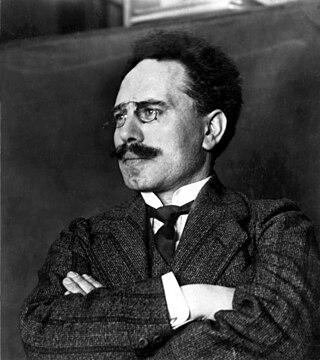 5
Karl Paul August Friedrich Liebknecht was a German socialist and anti-militarist. A member of the Social Democratic Party of Germany (SPD) beginning in 1900, he was one of its deputies in the Reichstag from 1912 to 1916, where he represented the left-revolutionary wing of the party. In 1916 he was expelled from the SPD's parliamentary group for his opposition to the Burgfriedenspolitik, the political truce between all parties in the Reichstag while the war lasted. He twice spent time in prison, first for writing an anti-militarism pamphlet in 1907 and then for his role in a 1916 antiwar demonstration. He was released from the second under a general amnesty three weeks before the end of the First World War.
5
Karl Paul August Friedrich Liebknecht was a German socialist and anti-militarist. A member of the Social Democratic Party of Germany (SPD) beginning in 1900, he was one of its deputies in the Reichstag from 1912 to 1916, where he represented the left-revolutionary wing of the party. In 1916 he was expelled from the SPD's parliamentary group for his opposition to the Burgfriedenspolitik, the political truce between all parties in the Reichstag while the war lasted. He twice spent time in prison, first for writing an anti-militarism pamphlet in 1907 and then for his role in a 1916 antiwar demonstration. He was released from the second under a general amnesty three weeks before the end of the First World War.
Mikhail Lermontov
 5
Mikhail Yuryevich Lermontov was a Russian Romantic writer, poet and painter, sometimes called "the poet of the Caucasus", the most important Russian poet after Alexander Pushkin's death in 1837 and the greatest figure in Russian Romanticism. His influence on later Russian literature is still felt in modern times, not only through his poetry, but also through his prose, which founded the tradition of the Russian psychological novel.
5
Mikhail Yuryevich Lermontov was a Russian Romantic writer, poet and painter, sometimes called "the poet of the Caucasus", the most important Russian poet after Alexander Pushkin's death in 1837 and the greatest figure in Russian Romanticism. His influence on later Russian literature is still felt in modern times, not only through his poetry, but also through his prose, which founded the tradition of the Russian psychological novel.
Ferdinand von Zeppelin
 5
Count Ferdinand von Zeppelin was a German general and later inventor of the Zeppelin rigid airships. His name became synonymous with airships and dominated long-distance flight until the 1930s. He founded the company Luftschiffbau Zeppelin.
5
Count Ferdinand von Zeppelin was a German general and later inventor of the Zeppelin rigid airships. His name became synonymous with airships and dominated long-distance flight until the 1930s. He founded the company Luftschiffbau Zeppelin.
Gregor Mendel
 5
Gregor Johann Mendel OSA was an Austrian-Czech biologist, meteorologist, mathematician, Augustinian friar and abbot of St. Thomas' Abbey in Brno (Brünn), Margraviate of Moravia. Mendel was born in a German-speaking family in the Silesian part of the Austrian Empire and gained posthumous recognition as the founder of the modern science of genetics. Though farmers had known for millennia that crossbreeding of animals and plants could favor certain desirable traits, Mendel's pea plant experiments conducted between 1856 and 1863 established many of the rules of heredity, now referred to as the laws of Mendelian inheritance.
5
Gregor Johann Mendel OSA was an Austrian-Czech biologist, meteorologist, mathematician, Augustinian friar and abbot of St. Thomas' Abbey in Brno (Brünn), Margraviate of Moravia. Mendel was born in a German-speaking family in the Silesian part of the Austrian Empire and gained posthumous recognition as the founder of the modern science of genetics. Though farmers had known for millennia that crossbreeding of animals and plants could favor certain desirable traits, Mendel's pea plant experiments conducted between 1856 and 1863 established many of the rules of heredity, now referred to as the laws of Mendelian inheritance.
Martin Luther
 5
Martin Luther was a German priest, theologian, author, hymnwriter, professor, and Augustinian friar. Luther was the seminal figure of the Protestant Reformation, and his theological beliefs form the basis of Lutheranism. He is regarded as one of the most influential figures in Western and Christian history.
5
Martin Luther was a German priest, theologian, author, hymnwriter, professor, and Augustinian friar. Luther was the seminal figure of the Protestant Reformation, and his theological beliefs form the basis of Lutheranism. He is regarded as one of the most influential figures in Western and Christian history.
Dominic Savio
 5
Dominic Savio was an Italian student of John Bosco. He was studying to be a priest when he became ill and died at the age of 14, possibly from pleurisy. He was noted for his piety and devotion to the Catholic faith, and was canonized a saint by Pope Pius XII in 1954.
5
Dominic Savio was an Italian student of John Bosco. He was studying to be a priest when he became ill and died at the age of 14, possibly from pleurisy. He was noted for his piety and devotion to the Catholic faith, and was canonized a saint by Pope Pius XII in 1954.
Antonio Machado
 5
Antonio Cipriano José María y Francisco de Santa Ana Machado y Ruiz, known as Antonio Machado, was a Spanish poet and one of the leading figures of the Spanish literary movement known as the Generation of '98. His work, initially modernist, evolved towards an intimate form of symbolism with romantic traits. He gradually developed a style characterised by both an engagement with humanity on one side and an almost Taoist contemplation of existence on the other, a synthesis that according to Machado echoed the most ancient popular wisdom. In Gerardo Diego's words, Machado "spoke in verse and lived in poetry."
5
Antonio Cipriano José María y Francisco de Santa Ana Machado y Ruiz, known as Antonio Machado, was a Spanish poet and one of the leading figures of the Spanish literary movement known as the Generation of '98. His work, initially modernist, evolved towards an intimate form of symbolism with romantic traits. He gradually developed a style characterised by both an engagement with humanity on one side and an almost Taoist contemplation of existence on the other, a synthesis that according to Machado echoed the most ancient popular wisdom. In Gerardo Diego's words, Machado "spoke in verse and lived in poetry."
Diego de Almagro
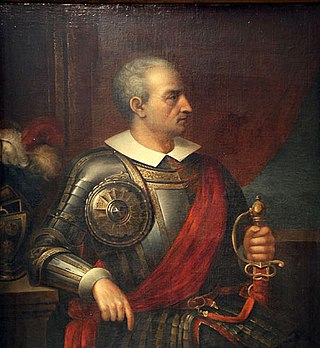 5
Diego de Almagro, also known as El Adelantado and El Viejo, was a Spanish conquistador known for his exploits in western South America. He participated with Francisco Pizarro in the Spanish conquest of Peru. While subduing the Inca Empire he laid the foundation for Quito and Trujillo as Spanish cities in present-day Ecuador and Peru respectively. From Peru, Almagro led the first Spanish military expedition to central Chile. Back in Peru, a longstanding conflict with Pizarro over the control of the former Inca capital of Cuzco erupted into a civil war between the two bands of conquistadores. In the battle of Las Salinas in 1538, Almagro was defeated by the Pizarro brothers and months later he was executed.
5
Diego de Almagro, also known as El Adelantado and El Viejo, was a Spanish conquistador known for his exploits in western South America. He participated with Francisco Pizarro in the Spanish conquest of Peru. While subduing the Inca Empire he laid the foundation for Quito and Trujillo as Spanish cities in present-day Ecuador and Peru respectively. From Peru, Almagro led the first Spanish military expedition to central Chile. Back in Peru, a longstanding conflict with Pizarro over the control of the former Inca capital of Cuzco erupted into a civil war between the two bands of conquistadores. In the battle of Las Salinas in 1538, Almagro was defeated by the Pizarro brothers and months later he was executed.
Gamal Abdel Nasser
 5
Gamal Abdel Nasser Hussein was an Egyptian military officer and politician who served as the second president of Egypt from 1954 until his death in 1970. Nasser led the Egyptian revolution of 1952 and introduced far-reaching land reforms the following year. Following a 1954 attempt on his life by a Muslim Brotherhood member, he cracked down on the organization, put President Mohamed Naguib under house arrest and assumed executive office. He was formally elected president in June 1956.
5
Gamal Abdel Nasser Hussein was an Egyptian military officer and politician who served as the second president of Egypt from 1954 until his death in 1970. Nasser led the Egyptian revolution of 1952 and introduced far-reaching land reforms the following year. Following a 1954 attempt on his life by a Muslim Brotherhood member, he cracked down on the organization, put President Mohamed Naguib under house arrest and assumed executive office. He was formally elected president in June 1956.
Julius Nyerere
 4
Julius Kambarage Nyerere was a Tanzanian anti-colonial activist, politician and political theorist. He governed Tanganyika as prime minister from 1961 to 1962 and then as president from 1962 to 1964, after which he led its successor state, Tanzania, as president from 1964 to 1985. He was a founding member and chair of the Tanganyika African National Union (TANU) party, and of its successor Chama Cha Mapinduzi, from 1954 to 1990. Ideologically an African nationalist and African socialist, he promoted a political philosophy known as Ujamaa.
4
Julius Kambarage Nyerere was a Tanzanian anti-colonial activist, politician and political theorist. He governed Tanganyika as prime minister from 1961 to 1962 and then as president from 1962 to 1964, after which he led its successor state, Tanzania, as president from 1964 to 1985. He was a founding member and chair of the Tanganyika African National Union (TANU) party, and of its successor Chama Cha Mapinduzi, from 1954 to 1990. Ideologically an African nationalist and African socialist, he promoted a political philosophy known as Ujamaa.
Sergei Kirov
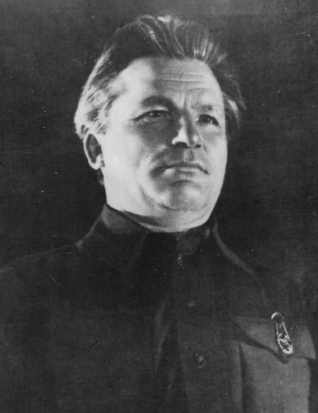 4
Sergei Mironovich Kirov was a Russian and Soviet politician and Bolshevik revolutionary.
4
Sergei Mironovich Kirov was a Russian and Soviet politician and Bolshevik revolutionary.
Vladimir Mayakovsky
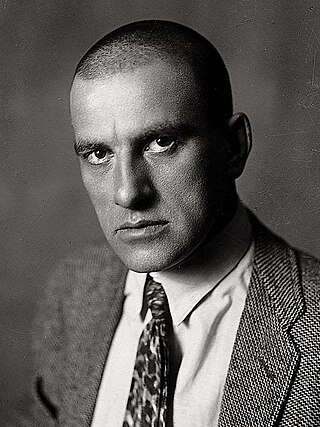 4
Vladimir Vladimirovich Mayakovsky was a Russian and Soviet poet, playwright, artist, and actor.
4
Vladimir Vladimirovich Mayakovsky was a Russian and Soviet poet, playwright, artist, and actor.
Anton Chekhov
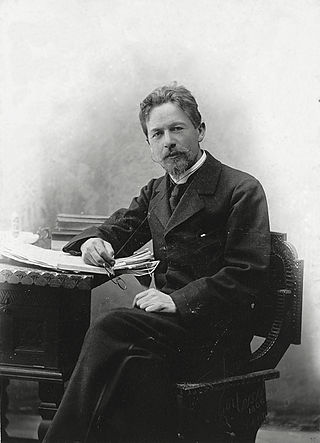 4
Anton Pavlovich Chekhov was a Russian playwright and physician. His career as a playwright produced four classics, and his best short stories are held in high esteem by writers and critics. Along with Henrik Ibsen and August Strindberg, Chekhov is often referred to as one of the three seminal figures in the birth of early modernism in the theatre. Chekhov was a physician by profession. "Medicine is my lawful wife", he once said, "and literature is my mistress."
4
Anton Pavlovich Chekhov was a Russian playwright and physician. His career as a playwright produced four classics, and his best short stories are held in high esteem by writers and critics. Along with Henrik Ibsen and August Strindberg, Chekhov is often referred to as one of the three seminal figures in the birth of early modernism in the theatre. Chekhov was a physician by profession. "Medicine is my lawful wife", he once said, "and literature is my mistress."
Valery Chkalov
 4
Valery Pavlovich Chkalov was a test pilot awarded the title Hero of the Soviet Union (1936).
4
Valery Pavlovich Chkalov was a test pilot awarded the title Hero of the Soviet Union (1936).
Ovid
 4
Publius Ovidius Naso, known in English as Ovid, was a Roman poet who lived during the reign of Augustus. He was a younger contemporary of Virgil and Horace, with whom he is often ranked as one of the three canonical poets of Latin literature. The Imperial scholar Quintilian considered him the last of the Latin love elegists. Although Ovid enjoyed enormous popularity during his lifetime, the emperor Augustus exiled him to Tomis, the capital of the newly-organised province of Moesia, on the Black Sea, where he remained for the last nine or ten years of his life. Ovid himself attributed his banishment to a "poem and a mistake", but his reluctance to disclose specifics has resulted in much speculation among scholars.
4
Publius Ovidius Naso, known in English as Ovid, was a Roman poet who lived during the reign of Augustus. He was a younger contemporary of Virgil and Horace, with whom he is often ranked as one of the three canonical poets of Latin literature. The Imperial scholar Quintilian considered him the last of the Latin love elegists. Although Ovid enjoyed enormous popularity during his lifetime, the emperor Augustus exiled him to Tomis, the capital of the newly-organised province of Moesia, on the Black Sea, where he remained for the last nine or ten years of his life. Ovid himself attributed his banishment to a "poem and a mistake", but his reluctance to disclose specifics has resulted in much speculation among scholars.
Galen
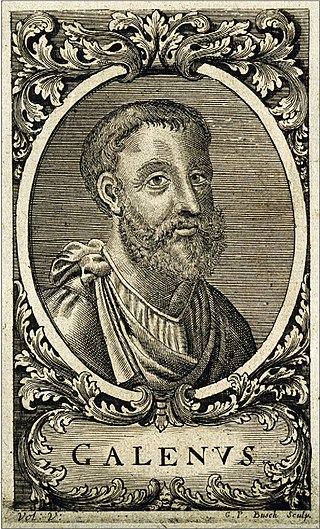 4
Aelius Galenus or Claudius Galenus, often anglicized as Galen or Galen of Pergamon, was a Roman and Greek physician, surgeon, and philosopher. Considered to be one of the most accomplished of all medical researchers of antiquity, Galen influenced the development of various scientific disciplines, including anatomy, physiology, pathology, pharmacology, and neurology, as well as philosophy and logic.
4
Aelius Galenus or Claudius Galenus, often anglicized as Galen or Galen of Pergamon, was a Roman and Greek physician, surgeon, and philosopher. Considered to be one of the most accomplished of all medical researchers of antiquity, Galen influenced the development of various scientific disciplines, including anatomy, physiology, pathology, pharmacology, and neurology, as well as philosophy and logic.
Aristotle
 4
Aristotle was an Ancient Greek philosopher and polymath. His writings cover a broad range of subjects spanning the natural sciences, philosophy, linguistics, economics, politics, psychology, and the arts. As the founder of the Peripatetic school of philosophy in the Lyceum in Athens, he began the wider Aristotelian tradition that followed, which set the groundwork for the development of modern science.
4
Aristotle was an Ancient Greek philosopher and polymath. His writings cover a broad range of subjects spanning the natural sciences, philosophy, linguistics, economics, politics, psychology, and the arts. As the founder of the Peripatetic school of philosophy in the Lyceum in Athens, he began the wider Aristotelian tradition that followed, which set the groundwork for the development of modern science.
Hercules
 4
Hercules is the Roman equivalent of the Greek divine hero Heracles, son of Jupiter and the mortal Alcmena. In classical mythology, Hercules is famous for his strength and for his numerous far-ranging adventures.
4
Hercules is the Roman equivalent of the Greek divine hero Heracles, son of Jupiter and the mortal Alcmena. In classical mythology, Hercules is famous for his strength and for his numerous far-ranging adventures.
Pancras of Rome
 4
Pancras was a Roman citizen who converted to Christianity and was beheaded for his faith at the age of fourteen, around the year 304. His name is Greek (Πανκράτιος) and means "the one that holds everything".
4
Pancras was a Roman citizen who converted to Christianity and was beheaded for his faith at the age of fourteen, around the year 304. His name is Greek (Πανκράτιος) and means "the one that holds everything".
Philip Neri
 4
Philip Romolo Neri, known as the "Second Apostle of Rome" after Saint Peter, was an Italian Catholic priest noted for founding the Congregation of the Oratory, a society of secular clergy.
4
Philip Romolo Neri, known as the "Second Apostle of Rome" after Saint Peter, was an Italian Catholic priest noted for founding the Congregation of the Oratory, a society of secular clergy.
Matthias Corvinus
 4
Matthias Corvinus was King of Hungary and Croatia from 1458 to 1490, as Matthias I. After conducting several military campaigns, he was elected King of Bohemia in 1469 and adopted the title Duke of Austria in 1487. He was the son of John Hunyadi, Regent of Hungary, who died in 1456. In 1457, Matthias was imprisoned along with his older brother, Ladislaus Hunyadi, on the orders of King Ladislaus the Posthumous. Ladislaus Hunyadi was executed, causing a rebellion that forced King Ladislaus to flee Hungary. After the King died unexpectedly, Matthias's uncle Michael Szilágyi persuaded the Estates to unanimously proclaim the 14-year-old Matthias as king on 24 January 1458. He began his rule under his uncle's guardianship, but he took effective control of government within two weeks.
4
Matthias Corvinus was King of Hungary and Croatia from 1458 to 1490, as Matthias I. After conducting several military campaigns, he was elected King of Bohemia in 1469 and adopted the title Duke of Austria in 1487. He was the son of John Hunyadi, Regent of Hungary, who died in 1456. In 1457, Matthias was imprisoned along with his older brother, Ladislaus Hunyadi, on the orders of King Ladislaus the Posthumous. Ladislaus Hunyadi was executed, causing a rebellion that forced King Ladislaus to flee Hungary. After the King died unexpectedly, Matthias's uncle Michael Szilágyi persuaded the Estates to unanimously proclaim the 14-year-old Matthias as king on 24 January 1458. He began his rule under his uncle's guardianship, but he took effective control of government within two weeks.
Tadeusz Kościuszko
 4
Andrzej Tadeusz Bonawentura Kościuszko was a Polish military engineer, statesman, and military leader who then became a national hero in Poland, the United States, and Belarus. He fought in the Polish–Lithuanian Commonwealth's struggles against Russia and Prussia, and on the U.S. side in the American Revolutionary War. As Supreme Commander of the Polish National Armed Forces, he led the 1794 Kościuszko Uprising.
4
Andrzej Tadeusz Bonawentura Kościuszko was a Polish military engineer, statesman, and military leader who then became a national hero in Poland, the United States, and Belarus. He fought in the Polish–Lithuanian Commonwealth's struggles against Russia and Prussia, and on the U.S. side in the American Revolutionary War. As Supreme Commander of the Polish National Armed Forces, he led the 1794 Kościuszko Uprising.
Carl Linnaeus
 4
Carl Linnaeus, also known after ennoblement in 1761 as Carl von Linné, was a Swedish biologist and physician who formalised binomial nomenclature, the modern system of naming organisms. He is known as the "father of modern taxonomy". Many of his writings were in Latin; his name is rendered in Latin as Carolus Linnæus and, after his 1761 ennoblement, as Carolus a Linné.
4
Carl Linnaeus, also known after ennoblement in 1761 as Carl von Linné, was a Swedish biologist and physician who formalised binomial nomenclature, the modern system of naming organisms. He is known as the "father of modern taxonomy". Many of his writings were in Latin; his name is rendered in Latin as Carolus Linnæus and, after his 1761 ennoblement, as Carolus a Linné.
John Calvin
 4
John Calvin was a French theologian, pastor and reformer in Geneva during the Protestant Reformation. He was a principal figure in the development of the system of Christian theology later called Calvinism, including its doctrines of predestination and of God's absolute sovereignty in the salvation of the human soul from death and eternal damnation. Calvinist doctrines were influenced by and elaborated upon the Augustinian and other Christian traditions. Various Congregational, Reformed and Presbyterian churches, which look to Calvin as the chief expositor of their beliefs, have spread throughout the world.
4
John Calvin was a French theologian, pastor and reformer in Geneva during the Protestant Reformation. He was a principal figure in the development of the system of Christian theology later called Calvinism, including its doctrines of predestination and of God's absolute sovereignty in the salvation of the human soul from death and eternal damnation. Calvinist doctrines were influenced by and elaborated upon the Augustinian and other Christian traditions. Various Congregational, Reformed and Presbyterian churches, which look to Calvin as the chief expositor of their beliefs, have spread throughout the world.
Clara Zetkin
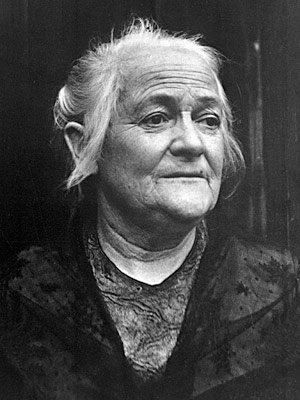 4
Clara Zetkin was a German Marxist theorist, communist activist, and advocate for women's rights.
4
Clara Zetkin was a German Marxist theorist, communist activist, and advocate for women's rights.
Friedrich Engels
 4
Friedrich Engels was a German philosopher, political theorist, historian, journalist, and revolutionary socialist. He was also a businessman and Karl Marx's closest friend and collaborator.
4
Friedrich Engels was a German philosopher, political theorist, historian, journalist, and revolutionary socialist. He was also a businessman and Karl Marx's closest friend and collaborator.
Crispin and Crispinian
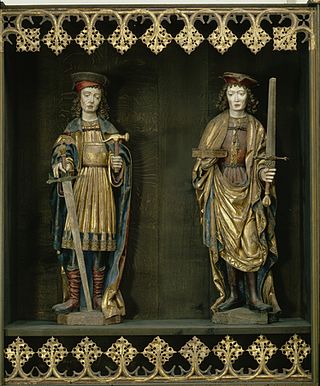 4
Saints Crispin and Crispinian are the Christian patron saints of cobblers, curriers, tanners, and leather workers. They were beheaded during the reign of Diocletian; the date of their execution is given as 25 October 285 or 286.
4
Saints Crispin and Crispinian are the Christian patron saints of cobblers, curriers, tanners, and leather workers. They were beheaded during the reign of Diocletian; the date of their execution is given as 25 October 285 or 286.
Vincent Ferrer
 4
Vincent Ferrer, OP was a Valencian Dominican friar and preacher, who gained acclaim as a missionary and a logician. He is honored as a saint of the Catholic Church and other churches of Catholic traditions.
4
Vincent Ferrer, OP was a Valencian Dominican friar and preacher, who gained acclaim as a missionary and a logician. He is honored as a saint of the Catholic Church and other churches of Catholic traditions.
Alcide De Gasperi
 4
Alcide Amedeo Francesco De Gasperi was an Italian politician who founded the Christian Democracy party and served as prime minister of Italy in eight successive coalition governments from 1945 to 1953.
4
Alcide Amedeo Francesco De Gasperi was an Italian politician who founded the Christian Democracy party and served as prime minister of Italy in eight successive coalition governments from 1945 to 1953.
Andrei Sakharov
 4
Andrei Dmitrievich Sakharov was a Soviet physicist and a Nobel Peace Prize laureate, which he was awarded in 1975 for emphasizing human rights around the world.
4
Andrei Dmitrievich Sakharov was a Soviet physicist and a Nobel Peace Prize laureate, which he was awarded in 1975 for emphasizing human rights around the world.
Frédéric Joliot-Curie
 4
Jean Frédéric Joliot-Curie was a French physicist and husband of Irène Joliot-Curie, with whom he was jointly awarded the Nobel Prize in Chemistry in 1935 for their discovery of induced radioactivity. They were the second ever married couple, after his wife's parents, to win the Nobel Prize, adding to the Curie family legacy of five Nobel Prizes. Joliot-Curie and his wife also founded the Orsay Faculty of Sciences, part of the Paris-Saclay University.
4
Jean Frédéric Joliot-Curie was a French physicist and husband of Irène Joliot-Curie, with whom he was jointly awarded the Nobel Prize in Chemistry in 1935 for their discovery of induced radioactivity. They were the second ever married couple, after his wife's parents, to win the Nobel Prize, adding to the Curie family legacy of five Nobel Prizes. Joliot-Curie and his wife also founded the Orsay Faculty of Sciences, part of the Paris-Saclay University.
Dwight D. Eisenhower
 4
Dwight David Eisenhower, nicknamed Ike, was an American military officer and statesman who served as the 34th president of the United States from 1953 to 1961. During World War II, he was Supreme Commander of the Allied Expeditionary Force in Europe and achieved the five-star rank as General of the Army. Eisenhower planned and supervised two of the most consequential military campaigns of World War II: Operation Torch in the North Africa campaign in 1942–1943 and the invasion of Normandy in 1944.
4
Dwight David Eisenhower, nicknamed Ike, was an American military officer and statesman who served as the 34th president of the United States from 1953 to 1961. During World War II, he was Supreme Commander of the Allied Expeditionary Force in Europe and achieved the five-star rank as General of the Army. Eisenhower planned and supervised two of the most consequential military campaigns of World War II: Operation Torch in the North Africa campaign in 1942–1943 and the invasion of Normandy in 1944.
Julian the Hospitaller
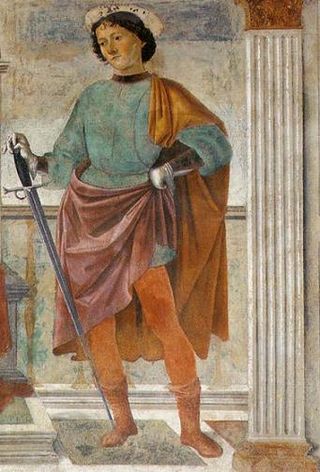 4
Saint Julian the Hospitaller is a saint venerated in the Catholic and Eastern Orthodox Churches. He is patron saint of the cities of Ghent (Belgium), Saint Julian's (Malta) and Macerata (Italy).
4
Saint Julian the Hospitaller is a saint venerated in the Catholic and Eastern Orthodox Churches. He is patron saint of the cities of Ghent (Belgium), Saint Julian's (Malta) and Macerata (Italy).
Selma Lagerlöf
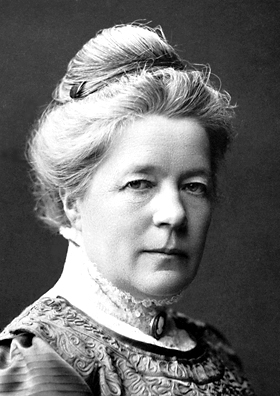 4
Selma Ottilia Lovisa Lagerlöf was a Swedish writer. She published her first novel, Gösta Berling's Saga, at the age of 33. She was the first woman to win the Nobel Prize in Literature, which she was awarded in 1909. Additionally, she was the first woman to be granted a membership in the Swedish Academy in 1914.
4
Selma Ottilia Lovisa Lagerlöf was a Swedish writer. She published her first novel, Gösta Berling's Saga, at the age of 33. She was the first woman to win the Nobel Prize in Literature, which she was awarded in 1909. Additionally, she was the first woman to be granted a membership in the Swedish Academy in 1914.
Hans Christian Andersen
 4
Hans Christian Andersen was a Danish author. Although a prolific writer of plays, travelogues, novels, and poems, he is best remembered for his literary fairy tales.
4
Hans Christian Andersen was a Danish author. Although a prolific writer of plays, travelogues, novels, and poems, he is best remembered for his literary fairy tales.
Lazarus of Bethany
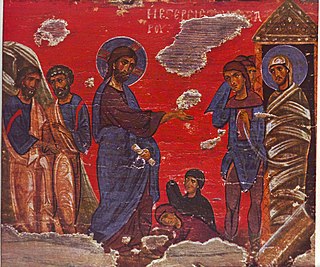 4
Lazarus of Bethany is a figure within the Christian Bible, mentioned in the New Testament in the Gospel of John, who four days after his death is restored to life by Jesus. This is seen by Christians as one of the miracles of Jesus. In the Eastern Orthodox Church, Lazarus is venerated as Righteous Lazarus, the Four-Days Dead. The Eastern Orthodox and Catholic traditions offer varying accounts of the later events of his life.
4
Lazarus of Bethany is a figure within the Christian Bible, mentioned in the New Testament in the Gospel of John, who four days after his death is restored to life by Jesus. This is seen by Christians as one of the miracles of Jesus. In the Eastern Orthodox Church, Lazarus is venerated as Righteous Lazarus, the Four-Days Dead. The Eastern Orthodox and Catholic traditions offer varying accounts of the later events of his life.
Saint Valentine
 4
Saint Valentine was a 3rd-century Roman saint, commemorated in Western Christianity on February 14 and in Eastern Orthodoxy on July 6. From the High Middle Ages, his feast day has been associated with a tradition of courtly love. He is also a patron saint of Terni, epilepsy and beekeepers.
Saint Valentine was a clergyman – either a priest or a bishop – in the Roman Empire who ministered to persecuted Christians. He was martyred and his body buried on the Via Flaminia on February 14, which has been observed as the Feast of Saint Valentine since at least the eighth century.
4
Saint Valentine was a 3rd-century Roman saint, commemorated in Western Christianity on February 14 and in Eastern Orthodoxy on July 6. From the High Middle Ages, his feast day has been associated with a tradition of courtly love. He is also a patron saint of Terni, epilepsy and beekeepers.
Saint Valentine was a clergyman – either a priest or a bishop – in the Roman Empire who ministered to persecuted Christians. He was martyred and his body buried on the Via Flaminia on February 14, which has been observed as the Feast of Saint Valentine since at least the eighth century.
Didacus of Alcalá
 4
Didacus of Alcalá, also known as Diego de San Nicolás, was a Spanish Franciscan lay brother who served among the first group of missionaries to the newly conquered Canary Islands. He died at Alcalá de Henares on 12 November 1463 and is now honoured by the Catholic Church as a saint.
4
Didacus of Alcalá, also known as Diego de San Nicolás, was a Spanish Franciscan lay brother who served among the first group of missionaries to the newly conquered Canary Islands. He died at Alcalá de Henares on 12 November 1463 and is now honoured by the Catholic Church as a saint.
Saint Alban
 4
Saint Alban is venerated as the first-recorded British Christian martyr, for which reason he is considered to be the British protomartyr. Along with fellow Saints Julius and Aaron, Alban is one of three named martyrs recorded at an early date from Roman Britain. He is traditionally believed to have been beheaded in Verulamium sometime during the 3rd or 4th century, and his cult has been celebrated there since ancient times.
4
Saint Alban is venerated as the first-recorded British Christian martyr, for which reason he is considered to be the British protomartyr. Along with fellow Saints Julius and Aaron, Alban is one of three named martyrs recorded at an early date from Roman Britain. He is traditionally believed to have been beheaded in Verulamium sometime during the 3rd or 4th century, and his cult has been celebrated there since ancient times.
Georges Clemenceau
 4
Georges Benjamin Clemenceau was a French statesman who served as Prime Minister of France from 1906 to 1909 and again from 1917 until 1920. A physician turned journalist, he played a central role in the politics of the Third Republic, particularly amid the end of the First World War. He was a key figure of the Independent Radicals, advocating for the separation of church and state, as well as the amnesty of the Communards exiled to New Caledonia.
4
Georges Benjamin Clemenceau was a French statesman who served as Prime Minister of France from 1906 to 1909 and again from 1917 until 1920. A physician turned journalist, he played a central role in the politics of the Third Republic, particularly amid the end of the First World War. He was a key figure of the Independent Radicals, advocating for the separation of church and state, as well as the amnesty of the Communards exiled to New Caledonia.
Achilles
 4
In Greek mythology, Achilles or Achilleus was a hero of the Trojan War who was known as being the greatest of all the Greek warriors. A central character in Homer's Iliad, he was the son of the Nereid Thetis and Peleus, king of Phthia and famous Argonaut. Achilles was raised in Phthia along with his childhood companion Patroclus and received his education by the centaur Chiron. In the Iliad, he is presented as the commander of the mythical tribe of the Myrmidons.
4
In Greek mythology, Achilles or Achilleus was a hero of the Trojan War who was known as being the greatest of all the Greek warriors. A central character in Homer's Iliad, he was the son of the Nereid Thetis and Peleus, king of Phthia and famous Argonaut. Achilles was raised in Phthia along with his childhood companion Patroclus and received his education by the centaur Chiron. In the Iliad, he is presented as the commander of the mythical tribe of the Myrmidons.
Charlie Chaplin
 4
Sir Charles Spencer Chaplin was an English comic actor, filmmaker, and composer who rose to fame in the era of silent film. He became a worldwide icon through his screen persona, the Tramp, and is considered one of the film industry's most important figures. His career spanned more than 75 years, from childhood in the Victorian era until a year before his death in 1977, and encompassed both adulation and controversy.
4
Sir Charles Spencer Chaplin was an English comic actor, filmmaker, and composer who rose to fame in the era of silent film. He became a worldwide icon through his screen persona, the Tramp, and is considered one of the film industry's most important figures. His career spanned more than 75 years, from childhood in the Victorian era until a year before his death in 1977, and encompassed both adulation and controversy.
René Descartes
 4
René Descartes was a French philosopher, scientist, and mathematician, widely considered a seminal figure in the emergence of modern philosophy and science. Mathematics was paramount to his method of inquiry, and he connected the previously separate fields of geometry and algebra into analytic geometry. Descartes spent much of his working life in the Dutch Republic, initially serving the Dutch States Army, and later becoming a central intellectual of the Dutch Golden Age. Although he served a Protestant state and was later counted as a deist by critics, Descartes was Roman Catholic.
4
René Descartes was a French philosopher, scientist, and mathematician, widely considered a seminal figure in the emergence of modern philosophy and science. Mathematics was paramount to his method of inquiry, and he connected the previously separate fields of geometry and algebra into analytic geometry. Descartes spent much of his working life in the Dutch Republic, initially serving the Dutch States Army, and later becoming a central intellectual of the Dutch Golden Age. Although he served a Protestant state and was later counted as a deist by critics, Descartes was Roman Catholic.
Saint Ursula
 4
Ursula was a Romano-British virgin and martyr possibly of royal origin. She is venerated as a saint in the Roman Catholic Church and the Anglican Communion. Her feast day in the pre-1970 General Roman Calendar and in some regional calendars of the ordinary form of the Roman Rite is 21 October.
4
Ursula was a Romano-British virgin and martyr possibly of royal origin. She is venerated as a saint in the Roman Catholic Church and the Anglican Communion. Her feast day in the pre-1970 General Roman Calendar and in some regional calendars of the ordinary form of the Roman Rite is 21 October.
Simone de Beauvoir
 4
Simone Lucie Ernestine Marie Bertrand de Beauvoir was a French existentialist philosopher, writer, social theorist, and feminist activist. Though she did not consider herself a philosopher, nor was she considered one at the time of her death, she had a significant influence on both feminist existentialism and feminist theory.
4
Simone Lucie Ernestine Marie Bertrand de Beauvoir was a French existentialist philosopher, writer, social theorist, and feminist activist. Though she did not consider herself a philosopher, nor was she considered one at the time of her death, she had a significant influence on both feminist existentialism and feminist theory.
Molière
 4
Jean-Baptiste Poquelin, known by his stage name Molière, was a French playwright, actor, and poet, widely regarded as one of the great writers in the French language and world literature. His extant works include comedies, farces, tragicomedies, comédie-ballets, and more. His plays have been translated into every major living language and are performed at the Comédie-Française more often than those of any other playwright today. His influence is such that the French language is often referred to as the "language of Molière".
4
Jean-Baptiste Poquelin, known by his stage name Molière, was a French playwright, actor, and poet, widely regarded as one of the great writers in the French language and world literature. His extant works include comedies, farces, tragicomedies, comédie-ballets, and more. His plays have been translated into every major living language and are performed at the Comédie-Française more often than those of any other playwright today. His influence is such that the French language is often referred to as the "language of Molière".
Saint Maurice
 4
Maurice was an Egyptian military leader who headed the legendary Theban Legion of Rome in the 3rd century, and is one of the favourite and most widely venerated saints of that martyred group. He is the patron saint of several professions, locales, and kingdoms.
4
Maurice was an Egyptian military leader who headed the legendary Theban Legion of Rome in the 3rd century, and is one of the favourite and most widely venerated saints of that martyred group. He is the patron saint of several professions, locales, and kingdoms.
Pope Sylvester I
 4
Pope Sylvester I was the bishop of Rome from 31 January 314 until his death on 31 December 335. He filled the See of Rome at an important era in the history of the Western Church, though very little is known of his life.
4
Pope Sylvester I was the bishop of Rome from 31 January 314 until his death on 31 December 335. He filled the See of Rome at an important era in the history of the Western Church, though very little is known of his life.
John the Evangelist
 4
John the Evangelist is the name traditionally given to the author of the Gospel of John. Christians have traditionally identified him with John the Apostle, John of Patmos, and John the Presbyter, although this has been disputed by most modern scholars.
4
John the Evangelist is the name traditionally given to the author of the Gospel of John. Christians have traditionally identified him with John the Apostle, John of Patmos, and John the Presbyter, although this has been disputed by most modern scholars.
Pope Leo XIII
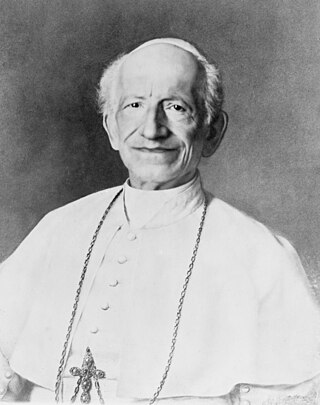 4
Pope Leo XIII was head of the Catholic Church from 20 February 1878 until his death in July 1903. Living until the age of 93, he was the oldest pope, whose age can be validated, holding office, and had the fourth-longest reign of any pope, behind those of St. Peter, Pius IX and John Paul II.
4
Pope Leo XIII was head of the Catholic Church from 20 February 1878 until his death in July 1903. Living until the age of 93, he was the oldest pope, whose age can be validated, holding office, and had the fourth-longest reign of any pope, behind those of St. Peter, Pius IX and John Paul II.
Agnes of Rome
 4
Agnes of Rome is a virgin martyr, venerated as a saint in the Catholic Church, Oriental Orthodox Church and the Eastern Orthodox Church, as well as the Anglican Communion and Lutheran Churches. She is one of several virgin martyrs commemorated by name in the Canon of the Mass, and one of many Christians martyred during the reign of the Roman emperor Diocletian.
4
Agnes of Rome is a virgin martyr, venerated as a saint in the Catholic Church, Oriental Orthodox Church and the Eastern Orthodox Church, as well as the Anglican Communion and Lutheran Churches. She is one of several virgin martyrs commemorated by name in the Canon of the Mass, and one of many Christians martyred during the reign of the Roman emperor Diocletian.
Jude the Apostle
 4
Jude was one of the Twelve Apostles of Jesus according to the New Testament. He is generally identified as Thaddeus and is also variously called Judas Thaddaeus, Jude Thaddaeus, Jude of James, or Lebbaeus. He is sometimes identified with Jude, the brother of Jesus, but is clearly distinguished from Judas Iscariot, the disciple who betrayed Jesus prior to his crucifixion. Catholic writer Michal Hunt suggests that Judas Thaddaeus became known as Jude after early translators of the New Testament from Greek into English sought to distinguish him from Judas Iscariot and subsequently abbreviated his forename. Most versions of the New Testament in languages other than English and French refer to Judas and Jude by the same name.
4
Jude was one of the Twelve Apostles of Jesus according to the New Testament. He is generally identified as Thaddeus and is also variously called Judas Thaddaeus, Jude Thaddaeus, Jude of James, or Lebbaeus. He is sometimes identified with Jude, the brother of Jesus, but is clearly distinguished from Judas Iscariot, the disciple who betrayed Jesus prior to his crucifixion. Catholic writer Michal Hunt suggests that Judas Thaddaeus became known as Jude after early translators of the New Testament from Greek into English sought to distinguish him from Judas Iscariot and subsequently abbreviated his forename. Most versions of the New Testament in languages other than English and French refer to Judas and Jude by the same name.
Pedro Álvares Cabral
 4
Pedro Álvares Cabral was a Portuguese nobleman, military commander, navigator and explorer regarded as the European discoverer of Brazil. He was the first recorded human in history to ever be on four continents, uniting all of them in his famous voyage of 1500, where he also conducted the first substantial exploration of the northeast coast of South America and claimed it for Portugal. While details of Cabral's early life remain unclear, it is known that he came from a minor noble family and received a good education. He was appointed to head an expedition to India in 1500, following Vasco da Gama's newly opened route around Africa. The undertaking had the aim of returning with valuable spices and of establishing trade relations in India—bypassing the monopoly on the spice trade then in the hands of Arab, Turkish and Italian merchants. Although the previous expedition of Vasco da Gama to India, on its sea route, had recorded signs of land west of the southern Atlantic Ocean, Cabral led the first known expedition to have touched four continents: Europe, Africa, America, and Asia.
4
Pedro Álvares Cabral was a Portuguese nobleman, military commander, navigator and explorer regarded as the European discoverer of Brazil. He was the first recorded human in history to ever be on four continents, uniting all of them in his famous voyage of 1500, where he also conducted the first substantial exploration of the northeast coast of South America and claimed it for Portugal. While details of Cabral's early life remain unclear, it is known that he came from a minor noble family and received a good education. He was appointed to head an expedition to India in 1500, following Vasco da Gama's newly opened route around Africa. The undertaking had the aim of returning with valuable spices and of establishing trade relations in India—bypassing the monopoly on the spice trade then in the hands of Arab, Turkish and Italian merchants. Although the previous expedition of Vasco da Gama to India, on its sea route, had recorded signs of land west of the southern Atlantic Ocean, Cabral led the first known expedition to have touched four continents: Europe, Africa, America, and Asia.
Ivo Lola Ribar
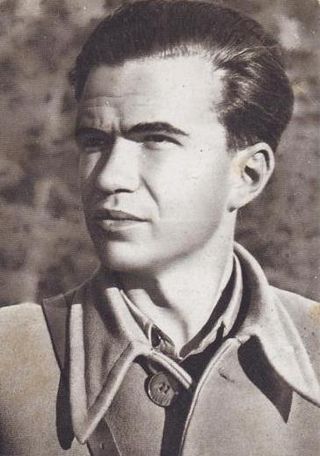 4
Ivan Ribar, known as Ivo Lola or Ivo Lolo, was a Yugoslav communist politician and military leader of Croatian descent. In the 1930s, he became one of the closest associates of Josip Broz Tito, leader of the Yugoslav Communist Party. In 1936, Ribar became secretary of the Central Committee of SKOJ. During World War II in Yugoslavia, Ribar was among the main leaders of the Yugoslav Partisans and was a member of the Partisan Supreme Headquarters. During the war, he founded and ran several leftist youth magazines. In 1942, Ribar was among the founders of the Unified League of Anti-Fascist Youth of Yugoslavia (USAOJ). He was killed by a German bomb in 1943 near Glamoč while boarding an airplane for Cairo, where he was to become the first representative of Communist Yugoslavia to the Middle East Command.
4
Ivan Ribar, known as Ivo Lola or Ivo Lolo, was a Yugoslav communist politician and military leader of Croatian descent. In the 1930s, he became one of the closest associates of Josip Broz Tito, leader of the Yugoslav Communist Party. In 1936, Ribar became secretary of the Central Committee of SKOJ. During World War II in Yugoslavia, Ribar was among the main leaders of the Yugoslav Partisans and was a member of the Partisan Supreme Headquarters. During the war, he founded and ran several leftist youth magazines. In 1942, Ribar was among the founders of the Unified League of Anti-Fascist Youth of Yugoslavia (USAOJ). He was killed by a German bomb in 1943 near Glamoč while boarding an airplane for Cairo, where he was to become the first representative of Communist Yugoslavia to the Middle East Command.
Vladimir Nazor
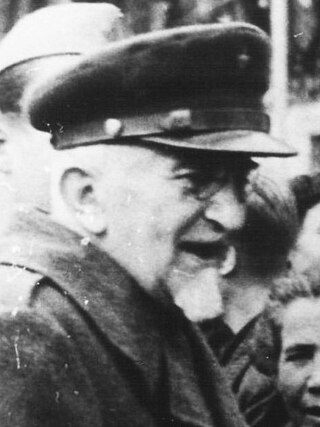 4
Vladimir Nazor was a Croatian poet and politician. During and after World War II in Yugoslavia, he served as the first President of the Presidium of the Croatian Parliament, and first Speaker of the Croatian Parliament.
4
Vladimir Nazor was a Croatian poet and politician. During and after World War II in Yugoslavia, he served as the first President of the Presidium of the Croatian Parliament, and first Speaker of the Croatian Parliament.
Sava Kovačević
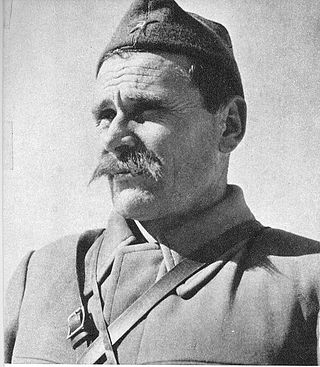 4
Sava Kovačević was a Yugoslav Partisan divisional commander during World War II, and one of the heroes of the communist Partisan movement.
4
Sava Kovačević was a Yugoslav Partisan divisional commander during World War II, and one of the heroes of the communist Partisan movement.
Roger Joseph Boscovich
 4
Roger Joseph Boscovich was a physicist, astronomer, mathematician, philosopher, diplomat, poet, theologian, Jesuit priest, and a polymath from the Republic of Ragusa. He studied and lived in Italy and France where he also published many of his works.
4
Roger Joseph Boscovich was a physicist, astronomer, mathematician, philosopher, diplomat, poet, theologian, Jesuit priest, and a polymath from the Republic of Ragusa. He studied and lived in Italy and France where he also published many of his works.
Vuk Karadžić
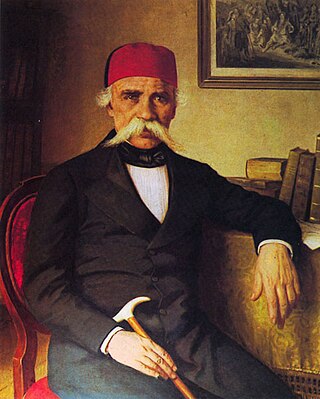 4
Vuk Stefanović Karadžić was a Serbian philologist, anthropologist and linguist. He was one of the most important reformers of the modern Serbian language. For his collection and preservation of Serbian folktales, Encyclopædia Britannica labelled Karadžić "the father of Serbian folk-literature scholarship." He was also the author of the first Serbian dictionary in the new reformed language. In addition, he translated the New Testament into the reformed form of the Serbian spelling and language.
4
Vuk Stefanović Karadžić was a Serbian philologist, anthropologist and linguist. He was one of the most important reformers of the modern Serbian language. For his collection and preservation of Serbian folktales, Encyclopædia Britannica labelled Karadžić "the father of Serbian folk-literature scholarship." He was also the author of the first Serbian dictionary in the new reformed language. In addition, he translated the New Testament into the reformed form of the Serbian spelling and language.
Maximilian Kolbe
 4
Maximilian Maria Kolbe was a Polish Catholic priest and Conventual Franciscan friar who volunteered to die in place of a man named Franciszek Gajowniczek in the German death camp of Auschwitz, located in German-occupied Poland during World War II. He had been active in promoting the veneration of the Immaculate Virgin Mary, founding and supervising the monastery of Niepokalanów near Warsaw, operating an amateur-radio station (SP3RN), and founding or running several other organizations and publications.
4
Maximilian Maria Kolbe was a Polish Catholic priest and Conventual Franciscan friar who volunteered to die in place of a man named Franciszek Gajowniczek in the German death camp of Auschwitz, located in German-occupied Poland during World War II. He had been active in promoting the veneration of the Immaculate Virgin Mary, founding and supervising the monastery of Niepokalanów near Warsaw, operating an amateur-radio station (SP3RN), and founding or running several other organizations and publications.
Genevieve
 4
Genevieve was a consecrated virgin, and is the patron saint of Paris in the Catholic and Orthodox traditions. Her feast day is on 3 January.
4
Genevieve was a consecrated virgin, and is the patron saint of Paris in the Catholic and Orthodox traditions. Her feast day is on 3 January.
Father Damien
 4
Father Damien or Saint Damien of Molokai or Saint Damien De Veuster, born Jozef De Veuster, was a Roman Catholic priest from Belgium and member of the Congregation of the Sacred Hearts of Jesus and Mary, a missionary religious institute. He was recognized for his ministry, which he led from 1873 until his death in 1889, in the Kingdom of Hawaiʻi to people with leprosy, who lived in government-mandated medical quarantine in a settlement on the Kalaupapa Peninsula of Molokaʻi.
4
Father Damien or Saint Damien of Molokai or Saint Damien De Veuster, born Jozef De Veuster, was a Roman Catholic priest from Belgium and member of the Congregation of the Sacred Hearts of Jesus and Mary, a missionary religious institute. He was recognized for his ministry, which he led from 1873 until his death in 1889, in the Kingdom of Hawaiʻi to people with leprosy, who lived in government-mandated medical quarantine in a settlement on the Kalaupapa Peninsula of Molokaʻi.
Ferdinand Foch
 4
Ferdinand Foch was a French general, Marshal of France and member of the Académie Française. He distinguished himself as Supreme Allied Commander on the Western Front during the First World War in 1918.
4
Ferdinand Foch was a French general, Marshal of France and member of the Académie Française. He distinguished himself as Supreme Allied Commander on the Western Front during the First World War in 1918.
Saint Remigius
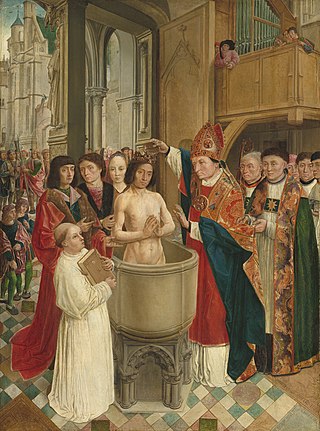 4
Remigius was the Bishop of Reims and "Apostle of the Franks". On 25 December 496, he baptised Clovis I, King of the Franks. The baptism, leading to about 3000 additional converts, was an important event in the Christianization of the Franks. Because of Clovis's efforts, a large number of churches were established in the formerly pagan lands of the Frankish empire, establishing a distinctly Orthodox variety of Christianity for the first time in Germanic lands, most of whom had been converted to Arian Christianity.
4
Remigius was the Bishop of Reims and "Apostle of the Franks". On 25 December 496, he baptised Clovis I, King of the Franks. The baptism, leading to about 3000 additional converts, was an important event in the Christianization of the Franks. Because of Clovis's efforts, a large number of churches were established in the formerly pagan lands of the Frankish empire, establishing a distinctly Orthodox variety of Christianity for the first time in Germanic lands, most of whom had been converted to Arian Christianity.
Saint Eligius
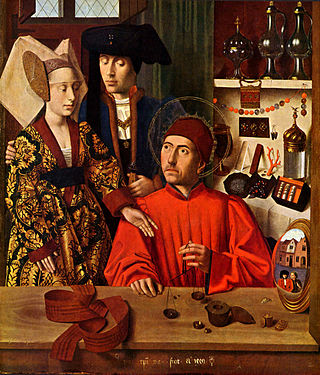 4
Eligius, venerated as Saint Eligius, was a Frankish goldsmith, courtier, and bishop who was chief counsellor to Dagobert I and later Bishop of Noyon–Tournai. His deeds were recorded in Vita Sancti Eligii, written by his friend Audoin of Rouen.
4
Eligius, venerated as Saint Eligius, was a Frankish goldsmith, courtier, and bishop who was chief counsellor to Dagobert I and later Bishop of Noyon–Tournai. His deeds were recorded in Vita Sancti Eligii, written by his friend Audoin of Rouen.
Mikhail Kalinin
 4
Mikhail Ivanovich Kalinin was a Soviet politician and Russian Old Bolshevik revolutionary. He served as head of state of the Russian Soviet Federative Socialist Republic and later of the Soviet Union from 1919 to 1946. From 1926, he was a member of the Politburo of the Communist Party of the Soviet Union.
4
Mikhail Ivanovich Kalinin was a Soviet politician and Russian Old Bolshevik revolutionary. He served as head of state of the Russian Soviet Federative Socialist Republic and later of the Soviet Union from 1919 to 1946. From 1926, he was a member of the Politburo of the Communist Party of the Soviet Union.
Saint Amaro
 4
According to Catholic tradition, Saint Amaro or Amarus the Pilgrim was an abbot and sailor who it was claimed sailed across the Atlantic Ocean to an earthly paradise. There are two historical figures who may have provided the basis for this legend. The first was a French penitent of the same name who went on a pilgrimage to Santiago de Compostela in the thirteenth century. On his return journey, he established himself at Burgos, where he founded a hospital for lepers.
4
According to Catholic tradition, Saint Amaro or Amarus the Pilgrim was an abbot and sailor who it was claimed sailed across the Atlantic Ocean to an earthly paradise. There are two historical figures who may have provided the basis for this legend. The first was a French penitent of the same name who went on a pilgrimage to Santiago de Compostela in the thirteenth century. On his return journey, he established himself at Burgos, where he founded a hospital for lepers.
Felix Mendelssohn
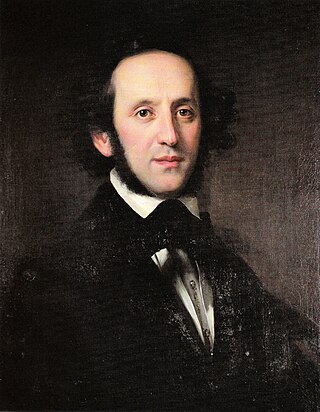 4
Jakob Ludwig Felix Mendelssohn Bartholdy, widely known as Felix Mendelssohn, was a German composer, pianist, organist and conductor of the early Romantic period. Mendelssohn's compositions include symphonies, concertos, piano music, organ music and chamber music. His best-known works include the overture and incidental music for A Midsummer Night's Dream, the Italian Symphony, the Scottish Symphony, the oratorio St. Paul, the oratorio Elijah, the overture The Hebrides, the mature Violin Concerto, the String Octet, and the melody used in the Christmas carol "Hark! The Herald Angels Sing". Mendelssohn's Songs Without Words are his most famous solo piano compositions.
4
Jakob Ludwig Felix Mendelssohn Bartholdy, widely known as Felix Mendelssohn, was a German composer, pianist, organist and conductor of the early Romantic period. Mendelssohn's compositions include symphonies, concertos, piano music, organ music and chamber music. His best-known works include the overture and incidental music for A Midsummer Night's Dream, the Italian Symphony, the Scottish Symphony, the oratorio St. Paul, the oratorio Elijah, the overture The Hebrides, the mature Violin Concerto, the String Octet, and the melody used in the Christmas carol "Hark! The Herald Angels Sing". Mendelssohn's Songs Without Words are his most famous solo piano compositions.
Georg Wilhelm Friedrich Hegel
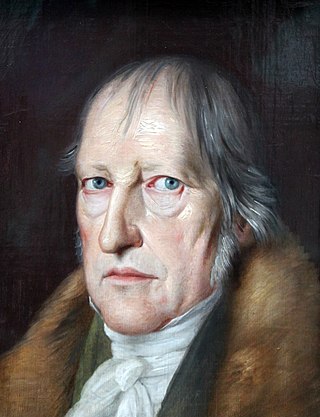 4
Georg Wilhelm Friedrich Hegel was a German philosopher and one of the most influential figures of German idealism and 19th-century philosophy. His influence extends across the entire range of contemporary philosophical topics, from metaphysical issues in epistemology and ontology, to political philosophy, the philosophy of history, philosophy of art, philosophy of religion, and the history of philosophy.
4
Georg Wilhelm Friedrich Hegel was a German philosopher and one of the most influential figures of German idealism and 19th-century philosophy. His influence extends across the entire range of contemporary philosophical topics, from metaphysical issues in epistemology and ontology, to political philosophy, the philosophy of history, philosophy of art, philosophy of religion, and the history of philosophy.
Heinrich Hertz
 4
Heinrich Rudolf Hertz was a German physicist who first conclusively proved the existence of the electromagnetic waves predicted by James Clerk Maxwell's equations of electromagnetism. The unit of frequency, cycle per second, was named the "hertz" in his honor.
4
Heinrich Rudolf Hertz was a German physicist who first conclusively proved the existence of the electromagnetic waves predicted by James Clerk Maxwell's equations of electromagnetism. The unit of frequency, cycle per second, was named the "hertz" in his honor.
Maria Montessori
 4
Maria Tecla Artemisia Montessori was an Italian physician and educator best known for her philosophy of education and her writing on scientific pedagogy. At an early age, Montessori enrolled in classes at an all-boys technical school, with hopes of becoming an engineer. She soon had a change of heart and began medical school at the Sapienza University of Rome, becoming one of the first women to attend medical school in Italy; she graduated with honors in 1896. Her educational method is in use today in many public and private schools globally.
4
Maria Tecla Artemisia Montessori was an Italian physician and educator best known for her philosophy of education and her writing on scientific pedagogy. At an early age, Montessori enrolled in classes at an all-boys technical school, with hopes of becoming an engineer. She soon had a change of heart and began medical school at the Sapienza University of Rome, becoming one of the first women to attend medical school in Italy; she graduated with honors in 1896. Her educational method is in use today in many public and private schools globally.
Alexander von Humboldt
 4
Friedrich Wilhelm Heinrich Alexander von Humboldt was a German polymath, geographer, naturalist, explorer, and proponent of Romantic philosophy and science. He was the younger brother of the Prussian minister, philosopher, and linguist Wilhelm von Humboldt (1767–1835). Humboldt's quantitative work on botanical geography laid the foundation for the field of biogeography, while his advocacy of long-term systematic geophysical measurement pioneered modern geomagnetic and meteorological monitoring.
4
Friedrich Wilhelm Heinrich Alexander von Humboldt was a German polymath, geographer, naturalist, explorer, and proponent of Romantic philosophy and science. He was the younger brother of the Prussian minister, philosopher, and linguist Wilhelm von Humboldt (1767–1835). Humboldt's quantitative work on botanical geography laid the foundation for the field of biogeography, while his advocacy of long-term systematic geophysical measurement pioneered modern geomagnetic and meteorological monitoring.
Werner von Siemens
 4
Ernst Werner Siemens was a German electrical engineer, inventor and industrialist. Siemens's name has been adopted as the SI unit of electrical conductance, the siemens. He founded the electrical and telecommunications conglomerate Siemens and invented the electric tram, trolley bus, electric locomotive and electric elevator.
4
Ernst Werner Siemens was a German electrical engineer, inventor and industrialist. Siemens's name has been adopted as the SI unit of electrical conductance, the siemens. He founded the electrical and telecommunications conglomerate Siemens and invented the electric tram, trolley bus, electric locomotive and electric elevator.
Maria Theresa
 4
Maria Theresa was ruler of the Habsburg dominions from 1740 until her death in 1780, and the only woman to hold the position suo jure. She was the sovereign of Austria, Hungary, Croatia, Bohemia, Transylvania, Mantua, Milan, Galicia and Lodomeria, the Austrian Netherlands, and Parma. By marriage, she was Duchess of Lorraine, Grand Duchess of Tuscany, and Holy Roman Empress.
4
Maria Theresa was ruler of the Habsburg dominions from 1740 until her death in 1780, and the only woman to hold the position suo jure. She was the sovereign of Austria, Hungary, Croatia, Bohemia, Transylvania, Mantua, Milan, Galicia and Lodomeria, the Austrian Netherlands, and Parma. By marriage, she was Duchess of Lorraine, Grand Duchess of Tuscany, and Holy Roman Empress.
Ignaz Semmelweis
 4
Ignaz Philipp Semmelweis was a Hungarian physician and scientist of German descent, who was an early pioneer of antiseptic procedures, and was described as the "saviour of mothers". Postpartum infection, also known as puerperal fever or childbed fever, consists of any bacterial infection of the reproductive tract following birth, and in the 19th century was common and often fatal. Semmelweis discovered that the incidence of infection could be drastically reduced by requiring healthcare workers in obstetrical clinics to disinfect their hands. In 1847, he proposed hand washing with chlorinated lime solutions at Vienna General Hospital's First Obstetrical Clinic, where doctors' wards had three times the mortality of midwives' wards. The maternal mortality rate dropped from 18% to less than 2%, and he published a book of his findings, Etiology, Concept and Prophylaxis of Childbed Fever, in 1861.
4
Ignaz Philipp Semmelweis was a Hungarian physician and scientist of German descent, who was an early pioneer of antiseptic procedures, and was described as the "saviour of mothers". Postpartum infection, also known as puerperal fever or childbed fever, consists of any bacterial infection of the reproductive tract following birth, and in the 19th century was common and often fatal. Semmelweis discovered that the incidence of infection could be drastically reduced by requiring healthcare workers in obstetrical clinics to disinfect their hands. In 1847, he proposed hand washing with chlorinated lime solutions at Vienna General Hospital's First Obstetrical Clinic, where doctors' wards had three times the mortality of midwives' wards. The maternal mortality rate dropped from 18% to less than 2%, and he published a book of his findings, Etiology, Concept and Prophylaxis of Childbed Fever, in 1861.
Franz Lehár
 4
Franz Lehár was an Austro-Hungarian composer. He is mainly known for his operettas, of which the most successful and best known is The Merry Widow.
4
Franz Lehár was an Austro-Hungarian composer. He is mainly known for his operettas, of which the most successful and best known is The Merry Widow.
Johann Strauss II
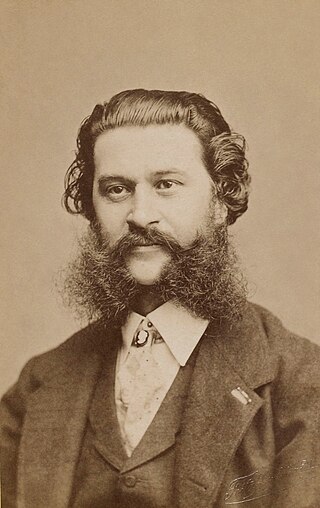 4
Johann Baptist Strauss II, also known as Johann Strauss Jr., the Younger or the Son, was an Austrian composer of light music, particularly dance music and operettas as well as a violinist. He composed over 500 waltzes, polkas, quadrilles, and other types of dance music, as well as several operettas and a ballet. In his lifetime, he was known as "The Waltz King", and was largely responsible for the popularity of the waltz in Vienna during the 19th century. Some of Johann Strauss's most famous works include "The Blue Danube", "Kaiser-Walzer", "Tales from the Vienna Woods", "Frühlingsstimmen", and the "Tritsch-Tratsch-Polka". Among his operettas, Die Fledermaus and Der Zigeunerbaron are the best known.
4
Johann Baptist Strauss II, also known as Johann Strauss Jr., the Younger or the Son, was an Austrian composer of light music, particularly dance music and operettas as well as a violinist. He composed over 500 waltzes, polkas, quadrilles, and other types of dance music, as well as several operettas and a ballet. In his lifetime, he was known as "The Waltz King", and was largely responsible for the popularity of the waltz in Vienna during the 19th century. Some of Johann Strauss's most famous works include "The Blue Danube", "Kaiser-Walzer", "Tales from the Vienna Woods", "Frühlingsstimmen", and the "Tritsch-Tratsch-Polka". Among his operettas, Die Fledermaus and Der Zigeunerbaron are the best known.
Friedrich Schiller
 4
Johann Christoph Friedrich von Schiller was a German polymath and poet, playwright, historian, philosopher, physician, lawyer. Schiller is considered by most Germans to be Germany's most important classical playwright.
4
Johann Christoph Friedrich von Schiller was a German polymath and poet, playwright, historian, philosopher, physician, lawyer. Schiller is considered by most Germans to be Germany's most important classical playwright.
Douglas MacArthur
 4
Douglas MacArthur was an American military leader who served as General of the Army for the United States, as well as a field marshal to the Philippine Army. He served with distinction in World War I, was Chief of Staff of the United States Army during the 1930s and played a prominent role in the Pacific theater during World War II. MacArthur was nominated for the Medal of Honor three times, and received it for his service in the Philippines campaign. This made him along with his father Arthur MacArthur Jr. the first father and son to be awarded the medal. He was one of only five men to rise to the rank of General of the Army in the U.S. Army, and the only one conferred the rank of field marshal in the Philippine Army.
4
Douglas MacArthur was an American military leader who served as General of the Army for the United States, as well as a field marshal to the Philippine Army. He served with distinction in World War I, was Chief of Staff of the United States Army during the 1930s and played a prominent role in the Pacific theater during World War II. MacArthur was nominated for the Medal of Honor three times, and received it for his service in the Philippines campaign. This made him along with his father Arthur MacArthur Jr. the first father and son to be awarded the medal. He was one of only five men to rise to the rank of General of the Army in the U.S. Army, and the only one conferred the rank of field marshal in the Philippine Army.
Arthur Wellesley, 1st Duke of Wellington
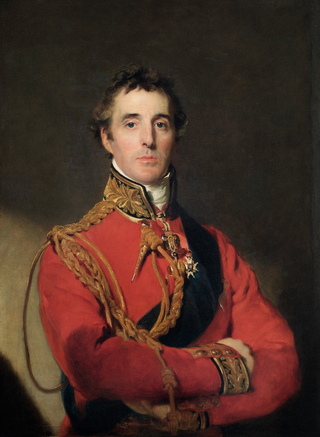 4
Field Marshal Arthur Wellesley, 1st Duke of Wellington, was an Anglo-Irish statesman, soldier, and Tory politician who was one of the leading military and political figures of 19th-century Britain, serving twice as prime minister of the United Kingdom. He is among the commanders who won and ended the Napoleonic Wars when the Seventh Coalition defeated Napoleon at the Battle of Waterloo in 1815.
4
Field Marshal Arthur Wellesley, 1st Duke of Wellington, was an Anglo-Irish statesman, soldier, and Tory politician who was one of the leading military and political figures of 19th-century Britain, serving twice as prime minister of the United Kingdom. He is among the commanders who won and ended the Napoleonic Wars when the Seventh Coalition defeated Napoleon at the Battle of Waterloo in 1815.
Prince Albert of Saxe-Coburg and Gotha
 4
Prince Albert of Saxe-Coburg and Gotha was the husband of Queen Victoria. As such, he was consort of the British monarch from their marriage on 10 February 1840, until his death in 1861. He received the unique title of Prince Consort in 1857 from his wife.
4
Prince Albert of Saxe-Coburg and Gotha was the husband of Queen Victoria. As such, he was consort of the British monarch from their marriage on 10 February 1840, until his death in 1861. He received the unique title of Prince Consort in 1857 from his wife.
Pythagoras
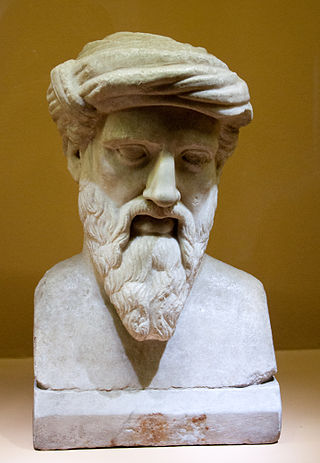 4
Pythagoras of Samos was an ancient Ionian Greek philosopher, polymath and the eponymous founder of Pythagoreanism. His political and religious teachings were well known in Magna Graecia and influenced the philosophies of Plato, Aristotle, and, through them, the West in general. Knowledge of his life is clouded by legend; modern scholars disagree regarding Pythagoras's education and influences, but they do agree that, around 530 BC, he travelled to Croton in southern Italy, where he founded a school in which initiates were sworn to secrecy and lived a communal, ascetic lifestyle. This lifestyle entailed a number of dietary prohibitions, traditionally said to have included aspects of vegetarianism.
4
Pythagoras of Samos was an ancient Ionian Greek philosopher, polymath and the eponymous founder of Pythagoreanism. His political and religious teachings were well known in Magna Graecia and influenced the philosophies of Plato, Aristotle, and, through them, the West in general. Knowledge of his life is clouded by legend; modern scholars disagree regarding Pythagoras's education and influences, but they do agree that, around 530 BC, he travelled to Croton in southern Italy, where he founded a school in which initiates were sworn to secrecy and lived a communal, ascetic lifestyle. This lifestyle entailed a number of dietary prohibitions, traditionally said to have included aspects of vegetarianism.
Jean Jaurès
 4
Auguste Marie Joseph Jean Léon Jaurès, commonly referred to as Jean Jaurès, was a French Socialist leader. Initially a Moderate Republican, he later became one of the first social democrats and the leader of the French Socialist Party, which opposed Jules Guesde's revolutionary Socialist Party of France. The two parties merged in 1905 in the French Section of the Workers' International (SFIO). An antimilitarist, Jaurès was assassinated in 1914 at the outbreak of World War I, but remains one of the main historical figures of the French Left. As a heterodox Marxist, Jaurès rejected the concept of the dictatorship of the proletariat and tried to conciliate idealism and materialism, individualism and collectivism, democracy and class struggle, patriotism and internationalism.
4
Auguste Marie Joseph Jean Léon Jaurès, commonly referred to as Jean Jaurès, was a French Socialist leader. Initially a Moderate Republican, he later became one of the first social democrats and the leader of the French Socialist Party, which opposed Jules Guesde's revolutionary Socialist Party of France. The two parties merged in 1905 in the French Section of the Workers' International (SFIO). An antimilitarist, Jaurès was assassinated in 1914 at the outbreak of World War I, but remains one of the main historical figures of the French Left. As a heterodox Marxist, Jaurès rejected the concept of the dictatorship of the proletariat and tried to conciliate idealism and materialism, individualism and collectivism, democracy and class struggle, patriotism and internationalism.
Marcellin Champagnat
 4
Marcellin Joseph Benedict Champagnat, FMS was a French Catholic religious born in Le Rosey, village of Marlhes, near St. Etienne (Loire), France. He was the founder of the Marist Brothers, a religious congregation of brothers in the Catholic Church devoted to Mary and dedicated to education. His feast day is 6 June, his death anniversary.
4
Marcellin Joseph Benedict Champagnat, FMS was a French Catholic religious born in Le Rosey, village of Marlhes, near St. Etienne (Loire), France. He was the founder of the Marist Brothers, a religious congregation of brothers in the Catholic Church devoted to Mary and dedicated to education. His feast day is 6 June, his death anniversary.
Thérèse of Lisieux
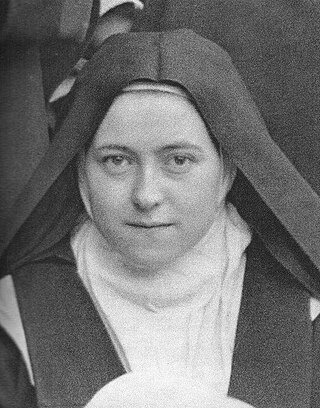 4
Therese of Lisieux, also known as Saint Therese of the Child Jesus and the Holy Face, was a French Discalced Carmelite who is widely venerated in modern times. She is popularly known in English as the Little Flower of Jesus, or simply the Little Flower, and in French as la petite Thérèse.
4
Therese of Lisieux, also known as Saint Therese of the Child Jesus and the Holy Face, was a French Discalced Carmelite who is widely venerated in modern times. She is popularly known in English as the Little Flower of Jesus, or simply the Little Flower, and in French as la petite Thérèse.
Juan Sebastián Elcano
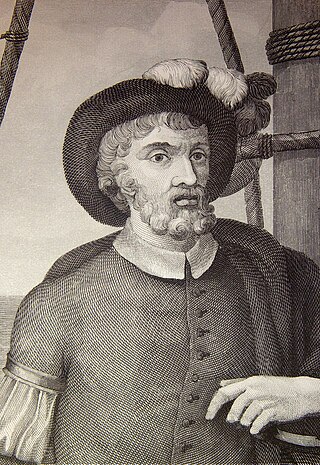 4
Juan Sebastián Elcano was a Spanish navigator, ship-owner and explorer of Basque origin from Getaria, part of the Crown of Castile when he was born, best known for having completed the first circumnavigation of the Earth in the Spanish ship Victoria on the Magellan expedition to the Spice Islands. He received recognition for his achievement by Charles I of Spain with a coat of arms bearing a globe and the Latin motto Primus circumdedisti me.
4
Juan Sebastián Elcano was a Spanish navigator, ship-owner and explorer of Basque origin from Getaria, part of the Crown of Castile when he was born, best known for having completed the first circumnavigation of the Earth in the Spanish ship Victoria on the Magellan expedition to the Spice Islands. He received recognition for his achievement by Charles I of Spain with a coat of arms bearing a globe and the Latin motto Primus circumdedisti me.
Saint Cajetan
 4
Gaetano dei Conti di Thiene, known as Saint Cajetan, was an Italian Catholic priest and religious reformer, co-founder of the Theatines. He is recognised as a saint in the Catholic Church, and his feast day is 7 August.
4
Gaetano dei Conti di Thiene, known as Saint Cajetan, was an Italian Catholic priest and religious reformer, co-founder of the Theatines. He is recognised as a saint in the Catholic Church, and his feast day is 7 August.
José Gervasio Artigas
 4
José Gervasio Artigas Arnal was a soldier and statesman who is regarded as a national hero in Uruguay and the father of Uruguayan nationhood.
4
José Gervasio Artigas Arnal was a soldier and statesman who is regarded as a national hero in Uruguay and the father of Uruguayan nationhood.
Carlos Pellegrini
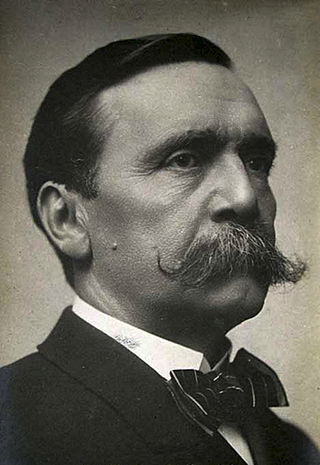 4
Carlos Enrique José Pellegrini Bevans was Vice President of Argentina and became President of Argentina from August 6, 1890 to October 12, 1892, upon Miguel Ángel Juárez Celman's resignation.
4
Carlos Enrique José Pellegrini Bevans was Vice President of Argentina and became President of Argentina from August 6, 1890 to October 12, 1892, upon Miguel Ángel Juárez Celman's resignation.
Alexander the Great
 4
Alexander III of Macedon, most commonly known as Alexander the Great, was a king of the ancient Greek kingdom of Macedon. He succeeded his father Philip II to the throne in 336 BC at the age of 20 and spent most of his ruling years conducting a lengthy military campaign throughout Western Asia, Central Asia, parts of South Asia, and Egypt. By the age of 30, he had created one of the largest empires in history, stretching from Greece to northwestern India. He was undefeated in battle and is widely considered to be one of history's greatest and most successful military commanders.
4
Alexander III of Macedon, most commonly known as Alexander the Great, was a king of the ancient Greek kingdom of Macedon. He succeeded his father Philip II to the throne in 336 BC at the age of 20 and spent most of his ruling years conducting a lengthy military campaign throughout Western Asia, Central Asia, parts of South Asia, and Egypt. By the age of 30, he had created one of the largest empires in history, stretching from Greece to northwestern India. He was undefeated in battle and is widely considered to be one of history's greatest and most successful military commanders.
Joan of Arc
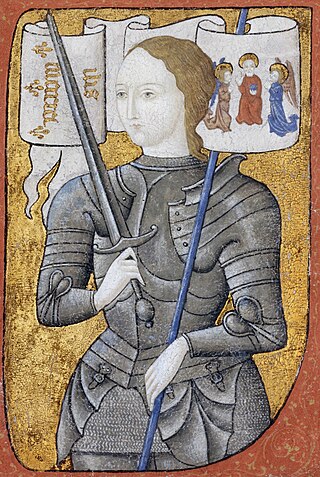 4
Joan of Arc is a patron saint of France, honored as a defender of the French nation for her role in the siege of Orléans and her insistence on the coronation of Charles VII of France during the Hundred Years' War. Claiming to be acting under divine guidance, she became a military leader who transcended gender roles and gained recognition as a savior of France.
4
Joan of Arc is a patron saint of France, honored as a defender of the French nation for her role in the siege of Orléans and her insistence on the coronation of Charles VII of France during the Hundred Years' War. Claiming to be acting under divine guidance, she became a military leader who transcended gender roles and gained recognition as a savior of France.
Habib Bourguiba
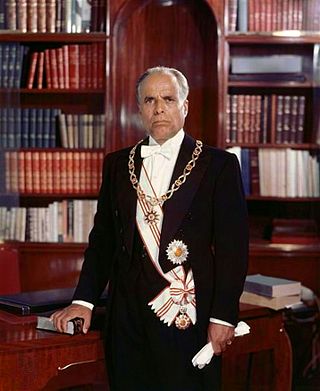 3
Habib Bourguiba was a Tunisian lawyer, nationalist leader and statesman who led the country from 1956 to 1957 as the prime minister of the Kingdom of Tunisia (1956–1957) then as the first president of Tunisia (1957–1987). Prior to his presidency, he led the nation to independence from France, ending the 75-year-old protectorate and earning the title of "Supreme Combatant".
3
Habib Bourguiba was a Tunisian lawyer, nationalist leader and statesman who led the country from 1956 to 1957 as the prime minister of the Kingdom of Tunisia (1956–1957) then as the first president of Tunisia (1957–1987). Prior to his presidency, he led the nation to independence from France, ending the 75-year-old protectorate and earning the title of "Supreme Combatant".
Elizabeth of Portugal
 3
Elizabeth of Aragon, more commonly known as Elizabeth of Portugal, was queen consort of Portugal who is venerated as a saint in the Roman Catholic Church.
3
Elizabeth of Aragon, more commonly known as Elizabeth of Portugal, was queen consort of Portugal who is venerated as a saint in the Roman Catholic Church.
Wilhelmina of the Netherlands
 3
Wilhelmina was Queen of the Netherlands from 1890 until her abdication in 1948. She reigned for nearly 58 years, making her the longest-reigning monarch in Dutch history, as well as the longest-reigning female monarch outside the United Kingdom. Her reign saw World War I, the Dutch economic crisis of 1933 and World War II.
3
Wilhelmina was Queen of the Netherlands from 1890 until her abdication in 1948. She reigned for nearly 58 years, making her the longest-reigning monarch in Dutch history, as well as the longest-reigning female monarch outside the United Kingdom. Her reign saw World War I, the Dutch economic crisis of 1933 and World War II.
Fyodor Tolbukhin
 3
Fyodor Ivanovich Tolbukhin was a Soviet military commander and Marshal of the Soviet Union. He is regarded as one of the finest Soviet generals of World War II.
3
Fyodor Ivanovich Tolbukhin was a Soviet military commander and Marshal of the Soviet Union. He is regarded as one of the finest Soviet generals of World War II.
Bohdan Khmelnytsky
 3
Bohdan Zynoviy Mykhailovych Khmelnytsky was a Ruthenian nobleman and military commander of Ukrainian Cossacks as Hetman of the Zaporozhian Host, which was then under the suzerainty of the Polish–Lithuanian Commonwealth. He led an uprising against the Commonwealth and its magnates (1648–1654) that resulted in the creation of an independent Cossack state in Ukraine. In 1654, he concluded the Treaty of Pereiaslav with the Russian Tsar and allied the Cossack Hetmanate with Tsardom of Russia, thus placing central Ukraine under Russian protection. During the uprising the Cossacks led a massacre of thousands of Poles and Jews during 1648–1649 as one of the most traumatic events in the history of the Jews in Ukraine and Ukrainian nationalism.
3
Bohdan Zynoviy Mykhailovych Khmelnytsky was a Ruthenian nobleman and military commander of Ukrainian Cossacks as Hetman of the Zaporozhian Host, which was then under the suzerainty of the Polish–Lithuanian Commonwealth. He led an uprising against the Commonwealth and its magnates (1648–1654) that resulted in the creation of an independent Cossack state in Ukraine. In 1654, he concluded the Treaty of Pereiaslav with the Russian Tsar and allied the Cossack Hetmanate with Tsardom of Russia, thus placing central Ukraine under Russian protection. During the uprising the Cossacks led a massacre of thousands of Poles and Jews during 1648–1649 as one of the most traumatic events in the history of the Jews in Ukraine and Ukrainian nationalism.
Zoya Kosmodemyanskaya
 3
Zoya Anatolyevna Kosmodemyanskaya was a Soviet partisan. She was executed after acts of sabotage against the invading armies of Nazi Germany; after stories emerged of her defiance towards her captors, she was posthumously declared a Hero of the Soviet Union. She became one of the most revered heroines of the Soviet Union.
3
Zoya Anatolyevna Kosmodemyanskaya was a Soviet partisan. She was executed after acts of sabotage against the invading armies of Nazi Germany; after stories emerged of her defiance towards her captors, she was posthumously declared a Hero of the Soviet Union. She became one of the most revered heroines of the Soviet Union.
Pavlik Morozov
 3
Pavel Trofimovich Morozov, better known by the diminutive Pavlik, was a Soviet youth praised by the Soviet press as a martyr. Evidence has emerged since the dissolution of the Soviet Union of the fabrication of the Pavlik Morozov legend, as well as what Soviet officials thought of him. His story, dated to 1932, is that of a 13-year-old boy who denounced his father to the authorities and was in turn killed by his family. His story was a subject of reading, songs, plays, a symphonic poem, a full-length opera, and six biographies. His politicized and mythologized story was used to encourage Soviet Bloc children to also inform on their parents.
3
Pavel Trofimovich Morozov, better known by the diminutive Pavlik, was a Soviet youth praised by the Soviet press as a martyr. Evidence has emerged since the dissolution of the Soviet Union of the fabrication of the Pavlik Morozov legend, as well as what Soviet officials thought of him. His story, dated to 1932, is that of a 13-year-old boy who denounced his father to the authorities and was in turn killed by his family. His story was a subject of reading, songs, plays, a symphonic poem, a full-length opera, and six biographies. His politicized and mythologized story was used to encourage Soviet Bloc children to also inform on their parents.
Vladimir Komarov
 3
Vladimir Mikhaylovich Komarov was a Soviet test pilot, aerospace engineer, and cosmonaut. In October 1964, he commanded Voskhod 1, the first spaceflight to carry more than one crew member. He became the first Soviet cosmonaut to fly in space twice when he was selected as the solo pilot of Soyuz 1, its first crewed test flight. A parachute failure caused his Soyuz capsule to crash into the ground after re-entry on 24 April 1967, making him the first human to die in a space flight.
3
Vladimir Mikhaylovich Komarov was a Soviet test pilot, aerospace engineer, and cosmonaut. In October 1964, he commanded Voskhod 1, the first spaceflight to carry more than one crew member. He became the first Soviet cosmonaut to fly in space twice when he was selected as the solo pilot of Soyuz 1, its first crewed test flight. A parachute failure caused his Soyuz capsule to crash into the ground after re-entry on 24 April 1967, making him the first human to die in a space flight.
Yakov Sverdlov
 3
Yakov Mikhailovich Sverdlov was a Bolshevik Party administrator and chairman of the All-Russian Central Executive Committee from 1917 to 1919. He is sometimes regarded as the first head of state of the Soviet Union, although it was not established until 1922, three years after his death.
3
Yakov Mikhailovich Sverdlov was a Bolshevik Party administrator and chairman of the All-Russian Central Executive Committee from 1917 to 1919. He is sometimes regarded as the first head of state of the Soviet Union, although it was not established until 1922, three years after his death.
Veljko Vlahović
 3
Veljko Vlahović was a Montenegrin politician and career army officer. He was one of the more prominent members of the Montenegrin branch of the Yugoslav Communist Party from 1935 which established the SFR Yugoslavia following World War II. He studied in Belgrade, Prague, and the Sorbonne, and finished his postgraduate studies in Moscow. He fought in the Spanish Civil War and was active in organizing the Communist Youth League of Yugoslavia (SKOJ).
3
Veljko Vlahović was a Montenegrin politician and career army officer. He was one of the more prominent members of the Montenegrin branch of the Yugoslav Communist Party from 1935 which established the SFR Yugoslavia following World War II. He studied in Belgrade, Prague, and the Sorbonne, and finished his postgraduate studies in Moscow. He fought in the Spanish Civil War and was active in organizing the Communist Youth League of Yugoslavia (SKOJ).
Dmitri Mendeleev
 3
Dmitri Ivanovich Mendeleev was a Russian chemist and inventor. He is best known for formulating the Periodic Law and creating a version of the periodic table of elements. He used the Periodic Law not only to correct the then-accepted properties of some known elements, such as the valence and atomic weight of uranium, but also to predict the properties of three elements that were yet to be discovered.
3
Dmitri Ivanovich Mendeleev was a Russian chemist and inventor. He is best known for formulating the Periodic Law and creating a version of the periodic table of elements. He used the Periodic Law not only to correct the then-accepted properties of some known elements, such as the valence and atomic weight of uranium, but also to predict the properties of three elements that were yet to be discovered.
Vasily Chapayev
 3
Vasily Ivanovich Chapayev or Chapaev was a Russian soldier and Red Army commander during the Russian Civil War.
3
Vasily Ivanovich Chapayev or Chapaev was a Russian soldier and Red Army commander during the Russian Civil War.
Al-Farabi
 3
Abu Nasr Muhammad al-Farabi, known in the Latin West as Alpharabius, was an early Islamic philosopher and music theorist. He has been designated as "Father of Islamic Neoplatonism", and the "Founder of Islamic Political Philosophy".
3
Abu Nasr Muhammad al-Farabi, known in the Latin West as Alpharabius, was an early Islamic philosopher and music theorist. He has been designated as "Father of Islamic Neoplatonism", and the "Founder of Islamic Political Philosophy".
Saint Rosalia
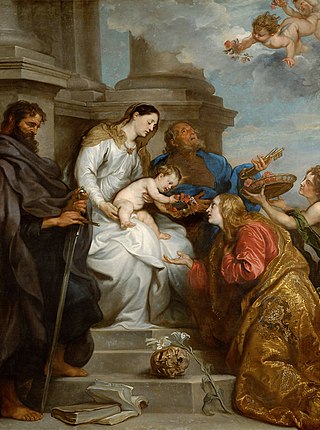 3
Rosalia, nicknamed la Santuzza, is the patron saint of Palermo in Italy, Camargo in Chihuahua, and three towns in Venezuela: El Hatillo, Zuata, and El Playón. She is especially important internationally as a saint invoked in times of plague. From 2020 onwards she has been invoked by some citizens of Palermo to protect the city from COVID-19.
3
Rosalia, nicknamed la Santuzza, is the patron saint of Palermo in Italy, Camargo in Chihuahua, and three towns in Venezuela: El Hatillo, Zuata, and El Playón. She is especially important internationally as a saint invoked in times of plague. From 2020 onwards she has been invoked by some citizens of Palermo to protect the city from COVID-19.
Cicero
 3
Marcus Tullius Cicero was a Roman statesman, lawyer, scholar, philosopher, writer and Academic skeptic, who tried to uphold optimate principles during the political crises that led to the establishment of the Roman Empire. His extensive writings include treatises on rhetoric, philosophy and politics. He is considered one of Rome's greatest orators and prose stylists and the innovator of what became known as "Ciceronian rhetoric". Cicero was educated in Rome and in Greece. He came from a wealthy municipal family of the Roman equestrian order, and served as consul in 63 BC.
3
Marcus Tullius Cicero was a Roman statesman, lawyer, scholar, philosopher, writer and Academic skeptic, who tried to uphold optimate principles during the political crises that led to the establishment of the Roman Empire. His extensive writings include treatises on rhetoric, philosophy and politics. He is considered one of Rome's greatest orators and prose stylists and the innovator of what became known as "Ciceronian rhetoric". Cicero was educated in Rome and in Greece. He came from a wealthy municipal family of the Roman equestrian order, and served as consul in 63 BC.
Bernardino of Siena
 3
Bernardino of Siena, OFM, was an Italian Catholic priest and Franciscan missionary preacher in Italy. He was a systematizer of scholastic economics.
3
Bernardino of Siena, OFM, was an Italian Catholic priest and Franciscan missionary preacher in Italy. He was a systematizer of scholastic economics.
Titian
 3
Tiziano Vecelli or Vecellio, Latinized as Titianus, hence known in English as Titian, was an Italian (Venetian) Renaissance painter of Lombard origin, considered the most important member of the 16th-century Venetian school. He was born in Pieve di Cadore, near Belluno. During his lifetime he was often called da Cadore, 'from Cadore', taken from his native region.
3
Tiziano Vecelli or Vecellio, Latinized as Titianus, hence known in English as Titian, was an Italian (Venetian) Renaissance painter of Lombard origin, considered the most important member of the 16th-century Venetian school. He was born in Pieve di Cadore, near Belluno. During his lifetime he was often called da Cadore, 'from Cadore', taken from his native region.
Luigi Galvani
 3
Luigi Galvani was an Italian physician, physicist, biologist and philosopher, who studied animal electricity. In 1780, he discovered that the muscles of dead frogs' legs twitched when struck by an electrical spark. This was an early study of bioelectricity, following experiments by John Walsh and Hugh Williamson.
3
Luigi Galvani was an Italian physician, physicist, biologist and philosopher, who studied animal electricity. In 1780, he discovered that the muscles of dead frogs' legs twitched when struck by an electrical spark. This was an early study of bioelectricity, following experiments by John Walsh and Hugh Williamson.
David Ben-Gurion
 3
David Ben-Gurion was the primary national founder of the State of Israel as well as its first prime minister. As head of the Jewish Agency from 1935, and later president of the Jewish Agency Executive, he was the de facto leader of the Jewish community in Palestine, and largely led the movement for an independent Jewish state in Mandatory Palestine.
3
David Ben-Gurion was the primary national founder of the State of Israel as well as its first prime minister. As head of the Jewish Agency from 1935, and later president of the Jewish Agency Executive, he was the de facto leader of the Jewish community in Palestine, and largely led the movement for an independent Jewish state in Mandatory Palestine.
Stephen Báthory
 3
Stephen Báthory was Voivode of Transylvania (1571–1576), Prince of Transylvania (1576–1586), King of Poland and Grand Duke of Lithuania (1576–1586).
3
Stephen Báthory was Voivode of Transylvania (1571–1576), Prince of Transylvania (1576–1586), King of Poland and Grand Duke of Lithuania (1576–1586).
Imre Madách
 3
Imre Madách de Sztregova et Kelecsény was a Hungarian aristocrat, writer, poet, lawyer and politician. His major work is The Tragedy of Man. It is a dramatic poem approximately 4000 lines long, which elaborates on ideas comparable to Goethe's Faust and Milton's Paradise Lost. The author was encouraged and advised by János Arany, one of the most famous of the 19th-century Hungarian poets.
3
Imre Madách de Sztregova et Kelecsény was a Hungarian aristocrat, writer, poet, lawyer and politician. His major work is The Tragedy of Man. It is a dramatic poem approximately 4000 lines long, which elaborates on ideas comparable to Goethe's Faust and Milton's Paradise Lost. The author was encouraged and advised by János Arany, one of the most famous of the 19th-century Hungarian poets.
Stephen I of Hungary
 3
Stephen I, also known as King Saint Stephen, was the last Grand Prince of the Hungarians between 997 and 1000 or 1001, and the first King of Hungary from 1000 or 1001, until his death in 1038. The year of his birth is uncertain, but many details of his life suggest that he was born in, or after, 975, in Esztergom. He was given the pagan name Vajk at birth, but the date of his baptism is unknown. He was the only son of Grand Prince Géza and his wife, Sarolt, who was descended from a prominent family of gyulas. Although both of his parents were baptized, Stephen was the first member of his family to become a devout Christian. He married Gisela of Bavaria, a scion of the imperial Ottonian dynasty.
3
Stephen I, also known as King Saint Stephen, was the last Grand Prince of the Hungarians between 997 and 1000 or 1001, and the first King of Hungary from 1000 or 1001, until his death in 1038. The year of his birth is uncertain, but many details of his life suggest that he was born in, or after, 975, in Esztergom. He was given the pagan name Vajk at birth, but the date of his baptism is unknown. He was the only son of Grand Prince Géza and his wife, Sarolt, who was descended from a prominent family of gyulas. Although both of his parents were baptized, Stephen was the first member of his family to become a devout Christian. He married Gisela of Bavaria, a scion of the imperial Ottonian dynasty.
Mór Jókai
 3
Móricz Jókay of Ásva, known as Mór Jókai, was a Hungarian novelist, dramatist and revolutionary. Outside of Hungary, he was also known as Maurice Jókai or Maurus Jokai or Mauritius Jókai. He was a leader of the outbreak of the Hungarian Revolution of 1848 in Pest. His romantic novels became widely popular among the elite of Victorian England, where he was often compared to Charles Dickens by the press. One of his most famous admirers was Queen Victoria herself.
3
Móricz Jókay of Ásva, known as Mór Jókai, was a Hungarian novelist, dramatist and revolutionary. Outside of Hungary, he was also known as Maurice Jókai or Maurus Jokai or Mauritius Jókai. He was a leader of the outbreak of the Hungarian Revolution of 1848 in Pest. His romantic novels became widely popular among the elite of Victorian England, where he was often compared to Charles Dickens by the press. One of his most famous admirers was Queen Victoria herself.
Attila József
 3
Attila József was one of the most famous Hungarian poets of the 20th century. Generally not recognized during his lifetime, József was hailed during the communist era of the 1950s as Hungary's great "proletarian poet" and he has become the best known of the modern Hungarian poets internationally.
3
Attila József was one of the most famous Hungarian poets of the 20th century. Generally not recognized during his lifetime, József was hailed during the communist era of the 1950s as Hungary's great "proletarian poet" and he has become the best known of the modern Hungarian poets internationally.
István Széchenyi
 3
Count István Széchenyi de Sárvár-Felsővidék was a Hungarian politician, political theorist, and writer. Widely considered one of the greatest statesmen in his nation's history, within Hungary he is still known to many as "the Greatest Hungarian".
3
Count István Széchenyi de Sárvár-Felsővidék was a Hungarian politician, political theorist, and writer. Widely considered one of the greatest statesmen in his nation's history, within Hungary he is still known to many as "the Greatest Hungarian".
Endre Ady
 3
Endre Ady was a turn-of-the-century Hungarian poet and journalist. Regarded by many as the greatest Hungarian poet of the 20th century, he was noted for his steadfast belief in social progress and development and for his poetry's exploration of fundamental questions of the modern European experience: love, temporality, faith, individuality, and patriotism.
3
Endre Ady was a turn-of-the-century Hungarian poet and journalist. Regarded by many as the greatest Hungarian poet of the 20th century, he was noted for his steadfast belief in social progress and development and for his poetry's exploration of fundamental questions of the modern European experience: love, temporality, faith, individuality, and patriotism.
György Dózsa
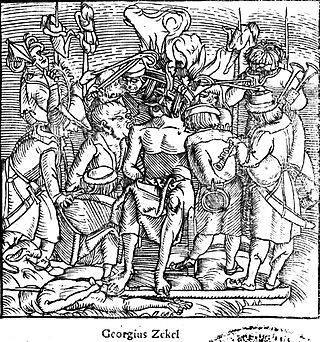 3
György Dózsa was a Székely man-at-arms from Transylvania, Kingdom of Hungary who led a peasants' revolt against the kingdom's landed nobility during the reign of King Vladislaus II of Hungary. The rebellion was suppressed, and Dózsa captured, tortured, and executed by being seated on a throne, crowned with red-hot iron, devoured alive by his followers under duress, then quartered.
3
György Dózsa was a Székely man-at-arms from Transylvania, Kingdom of Hungary who led a peasants' revolt against the kingdom's landed nobility during the reign of King Vladislaus II of Hungary. The rebellion was suppressed, and Dózsa captured, tortured, and executed by being seated on a throne, crowned with red-hot iron, devoured alive by his followers under duress, then quartered.
Hector
 3
In Greek mythology, Hector is a Trojan prince, and one of four sons to the King of Troy, he was a hero and the greatest warrior for Troy during the Trojan War. He is a major character in Homer's Iliad, where he leads the Trojans and their allies in the defense of Troy, killing countless Greek warriors and the occasional Hero. However he is ultimately killed in single combat by the Greek Hero Achilles, who later drags his dead body around the city of Troy behind his chariot.
3
In Greek mythology, Hector is a Trojan prince, and one of four sons to the King of Troy, he was a hero and the greatest warrior for Troy during the Trojan War. He is a major character in Homer's Iliad, where he leads the Trojans and their allies in the defense of Troy, killing countless Greek warriors and the occasional Hero. However he is ultimately killed in single combat by the Greek Hero Achilles, who later drags his dead body around the city of Troy behind his chariot.
Ptolemy
 3
Claudius Ptolemy was an Alexandrian mathematician, astronomer, astrologer, geographer, and music theorist who wrote about a dozen scientific treatises, three of which were important to later Byzantine, Islamic, and Western European science. The first was his astronomical treatise now known as the Almagest, originally entitled Mathematical Treatise. The second is the Geography, which is a thorough discussion on maps and the geographic knowledge of the Greco-Roman world. The third is the astrological treatise in which he attempted to adapt horoscopic astrology to the Aristotelian natural philosophy of his day. This is sometimes known as the Apotelesmatika but more commonly known as the Tetrábiblos, from the Koine Greek meaning "Four Books", or by its Latin equivalent Quadripartite.
3
Claudius Ptolemy was an Alexandrian mathematician, astronomer, astrologer, geographer, and music theorist who wrote about a dozen scientific treatises, three of which were important to later Byzantine, Islamic, and Western European science. The first was his astronomical treatise now known as the Almagest, originally entitled Mathematical Treatise. The second is the Geography, which is a thorough discussion on maps and the geographic knowledge of the Greco-Roman world. The third is the astrological treatise in which he attempted to adapt horoscopic astrology to the Aristotelian natural philosophy of his day. This is sometimes known as the Apotelesmatika but more commonly known as the Tetrábiblos, from the Koine Greek meaning "Four Books", or by its Latin equivalent Quadripartite.
Herodotus
 3
Herodotus was a Greek historian and geographer from the Greek city of Halicarnassus, part of the Persian Empire and a later citizen of Thurii in modern Calabria, Italy. He is known for having written the Histories – a detailed account of the Greco-Persian Wars. Herodotus was the first writer to perform systematic investigation of historical events. He has been described as "The Father of History", a title conferred on him by the ancient Roman orator Cicero.
3
Herodotus was a Greek historian and geographer from the Greek city of Halicarnassus, part of the Persian Empire and a later citizen of Thurii in modern Calabria, Italy. He is known for having written the Histories – a detailed account of the Greco-Persian Wars. Herodotus was the first writer to perform systematic investigation of historical events. He has been described as "The Father of History", a title conferred on him by the ancient Roman orator Cicero.
Justinian I
 3
Justinian I, also known as Justinian the Great, was the Eastern Roman emperor from 527 to 565.
3
Justinian I, also known as Justinian the Great, was the Eastern Roman emperor from 527 to 565.
Socrates
 3
Socrates was a Greek philosopher from Athens who is credited as the founder of Western philosophy and among the first moral philosophers of the ethical tradition of thought. An enigmatic figure, Socrates authored no texts and is known mainly through the posthumous accounts of classical writers, particularly his students Plato and Xenophon. These accounts are written as dialogues, in which Socrates and his interlocutors examine a subject in the style of question and answer; they gave rise to the Socratic dialogue literary genre. Contradictory accounts of Socrates make a reconstruction of his philosophy nearly impossible, a situation known as the Socratic problem. Socrates was a polarizing figure in Athenian society. In 399 BC, he was accused of impiety and corrupting the youth. After a trial that lasted a day, he was sentenced to death. He spent his last day in prison, refusing offers to help him escape.
3
Socrates was a Greek philosopher from Athens who is credited as the founder of Western philosophy and among the first moral philosophers of the ethical tradition of thought. An enigmatic figure, Socrates authored no texts and is known mainly through the posthumous accounts of classical writers, particularly his students Plato and Xenophon. These accounts are written as dialogues, in which Socrates and his interlocutors examine a subject in the style of question and answer; they gave rise to the Socratic dialogue literary genre. Contradictory accounts of Socrates make a reconstruction of his philosophy nearly impossible, a situation known as the Socratic problem. Socrates was a polarizing figure in Athenian society. In 399 BC, he was accused of impiety and corrupting the youth. After a trial that lasted a day, he was sentenced to death. He spent his last day in prison, refusing offers to help him escape.
Olaf II of Norway
 3
Olaf II Haraldsson, also Olav Haraldsson, later known as Saint Olaf and Olaf the Holy, was King of Norway from 1015 to 1028. Son of Harald Grenske, a petty king in Vestfold, Norway, he was posthumously given the title Rex Perpetuus Norvegiae and canonised at Nidaros (Trondheim) by Bishop Grimketel, one year after his death in the Battle of Stiklestad on 29 July 1030. His remains were enshrined in Nidaros Cathedral, built over his burial site. His sainthood encouraged the widespread adoption of Christianity by Scandinavia's Vikings/Norsemen.
3
Olaf II Haraldsson, also Olav Haraldsson, later known as Saint Olaf and Olaf the Holy, was King of Norway from 1015 to 1028. Son of Harald Grenske, a petty king in Vestfold, Norway, he was posthumously given the title Rex Perpetuus Norvegiae and canonised at Nidaros (Trondheim) by Bishop Grimketel, one year after his death in the Battle of Stiklestad on 29 July 1030. His remains were enshrined in Nidaros Cathedral, built over his burial site. His sainthood encouraged the widespread adoption of Christianity by Scandinavia's Vikings/Norsemen.
Barnabas
 3
Barnabas, born Joseph (Ἰωσήφ) or Joses (Ἰωσής), was according to tradition an early Christian, one of the prominent Christian disciples in Jerusalem. According to Acts 4:36, Barnabas was a Cypriot Jew. Named an apostle in Acts 14:14, he and Paul the Apostle undertook missionary journeys together and defended Gentile converts against the Judaizers. They traveled together making more converts, and participated in the Council of Jerusalem. Barnabas and Paul successfully evangelized among the "God-fearing" Gentiles who attended synagogues in various Hellenized cities of Anatolia.
3
Barnabas, born Joseph (Ἰωσήφ) or Joses (Ἰωσής), was according to tradition an early Christian, one of the prominent Christian disciples in Jerusalem. According to Acts 4:36, Barnabas was a Cypriot Jew. Named an apostle in Acts 14:14, he and Paul the Apostle undertook missionary journeys together and defended Gentile converts against the Judaizers. They traveled together making more converts, and participated in the Council of Jerusalem. Barnabas and Paul successfully evangelized among the "God-fearing" Gentiles who attended synagogues in various Hellenized cities of Anatolia.
Adam Smith
 3
Adam Smith was a Scottish economist and philosopher who was a pioneer in the thinking of political economy and key figure during the Scottish Enlightenment. Seen by some as "The Father of Economics" or "The Father of Capitalism", he wrote two classic works, The Theory of Moral Sentiments (1759) and An Inquiry into the Nature and Causes of the Wealth of Nations (1776). The latter, often abbreviated as The Wealth of Nations, is considered his magnum opus and the first modern work that treats economics as a comprehensive system and as an academic discipline. Smith refuses to explain the distribution of wealth and power in terms of God's will and instead appeals to natural, political, social, economic, legal, environmental and technological factors and the interactions among them. Among other economic theories, the work introduced Smith's idea of absolute advantage.
3
Adam Smith was a Scottish economist and philosopher who was a pioneer in the thinking of political economy and key figure during the Scottish Enlightenment. Seen by some as "The Father of Economics" or "The Father of Capitalism", he wrote two classic works, The Theory of Moral Sentiments (1759) and An Inquiry into the Nature and Causes of the Wealth of Nations (1776). The latter, often abbreviated as The Wealth of Nations, is considered his magnum opus and the first modern work that treats economics as a comprehensive system and as an academic discipline. Smith refuses to explain the distribution of wealth and power in terms of God's will and instead appeals to natural, political, social, economic, legal, environmental and technological factors and the interactions among them. Among other economic theories, the work introduced Smith's idea of absolute advantage.
Elvis Presley
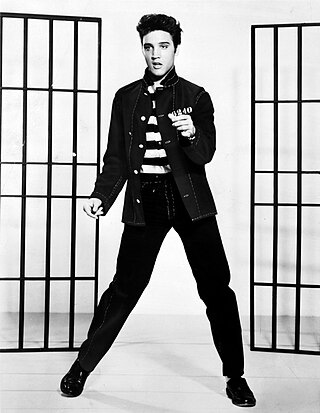 3
Elvis Aaron Presley, also known mononymously as Elvis, was an American singer and actor. Known as the "King of Rock and Roll", he is regarded as one of the most significant cultural figures of the 20th century. Presley's energized interpretations of songs and sexually provocative performance style, combined with a singularly potent mix of influences across color lines during a transformative era in race relations, brought both great success and initial controversy.
3
Elvis Aaron Presley, also known mononymously as Elvis, was an American singer and actor. Known as the "King of Rock and Roll", he is regarded as one of the most significant cultural figures of the 20th century. Presley's energized interpretations of songs and sexually provocative performance style, combined with a singularly potent mix of influences across color lines during a transformative era in race relations, brought both great success and initial controversy.
Ada Lovelace
 3
Augusta Ada King, Countess of Lovelace was an English mathematician and writer, chiefly known for her work on Charles Babbage's proposed mechanical general-purpose computer, the Analytical Engine. She was the first to recognise that the machine had applications beyond pure calculation.
3
Augusta Ada King, Countess of Lovelace was an English mathematician and writer, chiefly known for her work on Charles Babbage's proposed mechanical general-purpose computer, the Analytical Engine. She was the first to recognise that the machine had applications beyond pure calculation.
Thomas Aquinas
 3
Thomas Aquinas was an Italian Dominican friar and priest, an influential philosopher and theologian, and a jurist in the tradition of scholasticism from the county of Aquino in the Kingdom of Sicily.
3
Thomas Aquinas was an Italian Dominican friar and priest, an influential philosopher and theologian, and a jurist in the tradition of scholasticism from the county of Aquino in the Kingdom of Sicily.
Wright brothers
 3
The Wright brothers, Orville Wright and Wilbur Wright, were American aviation pioneers generally credited with inventing, building, and flying the world's first successful airplane. They made the first controlled, sustained flight of an engine-powered, heavier-than-air aircraft with the Wright Flyer on December 17, 1903, four miles (6 km) south of Kitty Hawk, North Carolina, at what is now known as Kill Devil Hills. In 1904 the Wright brothers developed the Wright Flyer II, which made longer-duration flights including the first circle, followed in 1905 by the first truly practical fixed-wing aircraft, the Wright Flyer III.
3
The Wright brothers, Orville Wright and Wilbur Wright, were American aviation pioneers generally credited with inventing, building, and flying the world's first successful airplane. They made the first controlled, sustained flight of an engine-powered, heavier-than-air aircraft with the Wright Flyer on December 17, 1903, four miles (6 km) south of Kitty Hawk, North Carolina, at what is now known as Kill Devil Hills. In 1904 the Wright brothers developed the Wright Flyer II, which made longer-duration flights including the first circle, followed in 1905 by the first truly practical fixed-wing aircraft, the Wright Flyer III.
Pliny the Elder
 3
Gaius Plinius Secundus, called Pliny the Elder, was a Roman author, naturalist, natural philosopher, naval and army commander of the early Roman Empire, and a friend of the emperor Vespasian. He wrote the encyclopedic Naturalis Historia, which became an editorial model for encyclopedias. He spent most of his spare time studying, writing, and investigating natural and geographic phenomena in the field.
3
Gaius Plinius Secundus, called Pliny the Elder, was a Roman author, naturalist, natural philosopher, naval and army commander of the early Roman Empire, and a friend of the emperor Vespasian. He wrote the encyclopedic Naturalis Historia, which became an editorial model for encyclopedias. He spent most of his spare time studying, writing, and investigating natural and geographic phenomena in the field.
Baruch Spinoza
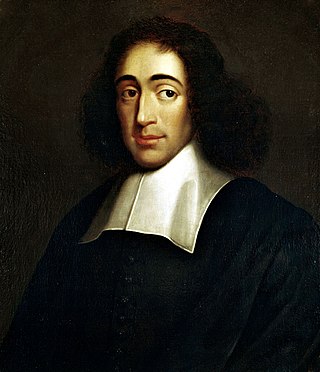 3
Baruch (de) Spinoza, also known under his Latinized pen name Benedictus de Spinoza, was a philosopher of Portuguese-Jewish origin. As a forerunner of the Age of Reason, Spinoza significantly influenced modern biblical criticism, 17th-century Rationalism, and contemporary conceptions of the self and the universe, establishing himself as one of the most important and radical philosophers of the early modern period. He was influenced by Stoicism, Maimonides, Niccolò Machiavelli, René Descartes, Thomas Hobbes, and a variety of heterodox Christian thinkers of his day.
3
Baruch (de) Spinoza, also known under his Latinized pen name Benedictus de Spinoza, was a philosopher of Portuguese-Jewish origin. As a forerunner of the Age of Reason, Spinoza significantly influenced modern biblical criticism, 17th-century Rationalism, and contemporary conceptions of the self and the universe, establishing himself as one of the most important and radical philosophers of the early modern period. He was influenced by Stoicism, Maimonides, Niccolò Machiavelli, René Descartes, Thomas Hobbes, and a variety of heterodox Christian thinkers of his day.
Dag Hammarskjöld
 3
Dag Hjalmar Agne Carl Hammarskjöld was a Swedish economist and diplomat who served as the second Secretary-General of the United Nations from April 1953 until his death in a plane crash in September 1961. As of 2023, he remains the youngest person to have held the post, having been only 47 years old when he was appointed. He was a son of Hjalmar Hammarskjöld, who served as Prime Minister of Sweden from 1914 to 1917.
3
Dag Hjalmar Agne Carl Hammarskjöld was a Swedish economist and diplomat who served as the second Secretary-General of the United Nations from April 1953 until his death in a plane crash in September 1961. As of 2023, he remains the youngest person to have held the post, having been only 47 years old when he was appointed. He was a son of Hjalmar Hammarskjöld, who served as Prime Minister of Sweden from 1914 to 1917.
Thomas More
 3
Sir Thomas More, venerated in the Catholic Church as Saint Thomas More, was an English lawyer, judge, social philosopher, author, statesman, amateur theologian, and noted Renaissance humanist. He also served Henry VIII as Lord High Chancellor of England from October 1529 to May 1532. He wrote Utopia, published in 1516, which describes the political system of an imaginary island state.
3
Sir Thomas More, venerated in the Catholic Church as Saint Thomas More, was an English lawyer, judge, social philosopher, author, statesman, amateur theologian, and noted Renaissance humanist. He also served Henry VIII as Lord High Chancellor of England from October 1529 to May 1532. He wrote Utopia, published in 1516, which describes the political system of an imaginary island state.
Anders Celsius
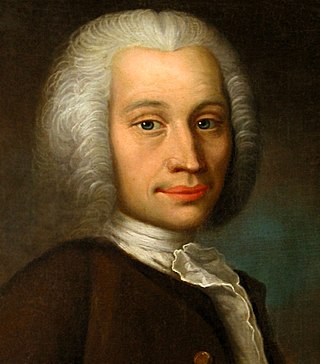 3
Anders Celsius was a Swedish astronomer, physicist and mathematician. He was professor of astronomy at Uppsala University from 1730 to 1744, but traveled from 1732 to 1735 visiting notable observatories in Germany, Italy and France. He founded the Uppsala Astronomical Observatory in 1741, and in 1742 proposed the Centigrade temperature scale which was later renamed Celsius in his honour.
3
Anders Celsius was a Swedish astronomer, physicist and mathematician. He was professor of astronomy at Uppsala University from 1730 to 1744, but traveled from 1732 to 1735 visiting notable observatories in Germany, Italy and France. He founded the Uppsala Astronomical Observatory in 1741, and in 1742 proposed the Centigrade temperature scale which was later renamed Celsius in his honour.
Pope Urban I
 3
Pope Urban I, also known as Saint Urban (175?–230), was the bishop of Rome from 222 to 23 May 230. He was born in Rome and succeeded Callixtus I, who had been martyred. It was believed for centuries that Urban I was also martyred. However, recent historical discoveries now lead scholars to believe that he died of natural causes.
3
Pope Urban I, also known as Saint Urban (175?–230), was the bishop of Rome from 222 to 23 May 230. He was born in Rome and succeeded Callixtus I, who had been martyred. It was believed for centuries that Urban I was also martyred. However, recent historical discoveries now lead scholars to believe that he died of natural causes.
Saint Vitus
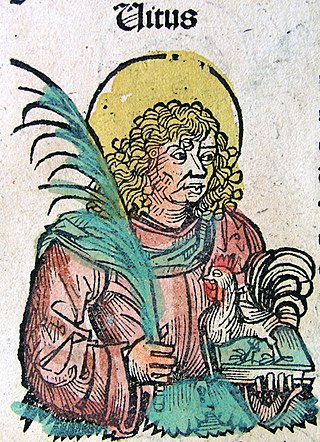 3
Vitus, whose name is sometimes rendered Guy or Guido, was a Christian martyr from Sicily. His surviving hagiography is pure legend. The dates of his actual life are unknown. He has for long been tied to the Sicilian martyrs Modestus and Crescentia but in the earliest sources it is clear that these were originally different traditions that later became combined. The figures of Modestus and Crescentia are probably fictitious.
3
Vitus, whose name is sometimes rendered Guy or Guido, was a Christian martyr from Sicily. His surviving hagiography is pure legend. The dates of his actual life are unknown. He has for long been tied to the Sicilian martyrs Modestus and Crescentia but in the earliest sources it is clear that these were originally different traditions that later became combined. The figures of Modestus and Crescentia are probably fictitious.
Ambrose
 3
Ambrose of Milan, venerated as Saint Ambrose, was a theologian and statesman who served as Bishop of Milan from 374 to 397. He expressed himself prominently as a public figure, fiercely promoting Roman Christianity against Arianism and paganism. He left a substantial collection of writings, of which the best known include the ethical commentary De officiis ministrorum (377–391), and the exegetical Exameron (386–390). His preachings, his actions and his literary works, in addition to his innovative musical hymnography, made him one of the most influential ecclesiastical figures of the 4th century.
3
Ambrose of Milan, venerated as Saint Ambrose, was a theologian and statesman who served as Bishop of Milan from 374 to 397. He expressed himself prominently as a public figure, fiercely promoting Roman Christianity against Arianism and paganism. He left a substantial collection of writings, of which the best known include the ethical commentary De officiis ministrorum (377–391), and the exegetical Exameron (386–390). His preachings, his actions and his literary works, in addition to his innovative musical hymnography, made him one of the most influential ecclesiastical figures of the 4th century.
Konrad Adenauer
 3
Konrad Hermann Joseph Adenauer was a German statesman who served as the first chancellor of the Federal Republic of Germany from 1949 to 1963. From 1946 to 1966, he was the first leader of the Christian Democratic Union (CDU), a new founded Christian-democratic party, which became the dominant force in the country under his leadership.
3
Konrad Hermann Joseph Adenauer was a German statesman who served as the first chancellor of the Federal Republic of Germany from 1949 to 1963. From 1946 to 1966, he was the first leader of the Christian Democratic Union (CDU), a new founded Christian-democratic party, which became the dominant force in the country under his leadership.
Saint Quentin
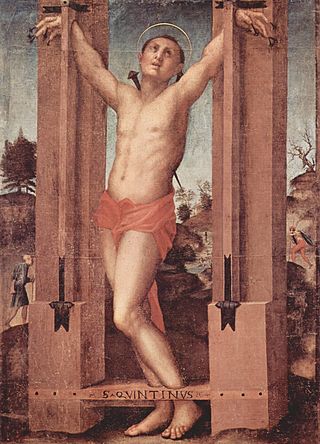 3
Quentin also known as Quentin of Amiens, was an early Christian saint.
3
Quentin also known as Quentin of Amiens, was an early Christian saint.
Henri Barbusse
 3
Henri Barbusse was a French novelist, short story writer, journalist, poet and political activist. He began his literary career in the 1890s as a Symbolist poet and continued as a neo-Naturalist novelist; in 1916, he published Under Fire, a novel about World War I based on his experience which is described as one of the earliest works of the Lost Generation movement or as the work which started it; the novel had a major impact on the later writers of the movement, namely on Ernest Hemingway and Erich Maria Remarque.
Barbusse is considered as one of the important French writers of 1910–1939 who mingled the war memories with moral and political meditations.
3
Henri Barbusse was a French novelist, short story writer, journalist, poet and political activist. He began his literary career in the 1890s as a Symbolist poet and continued as a neo-Naturalist novelist; in 1916, he published Under Fire, a novel about World War I based on his experience which is described as one of the earliest works of the Lost Generation movement or as the work which started it; the novel had a major impact on the later writers of the movement, namely on Ernest Hemingway and Erich Maria Remarque.
Barbusse is considered as one of the important French writers of 1910–1939 who mingled the war memories with moral and political meditations.
Umar
 3
Umar ibn al-Khattab was the second caliph, ruling from August 634 until his assassination in November 644. A prominent companion and father-in-law of the Islamic prophet Muhammad, Umar succeeded Abu Bakr as the second caliph.
3
Umar ibn al-Khattab was the second caliph, ruling from August 634 until his assassination in November 644. A prominent companion and father-in-law of the Islamic prophet Muhammad, Umar succeeded Abu Bakr as the second caliph.
Khalid ibn al-Walid
 3
Khalid ibn al-Walid ibn al-Mughira al-Makhzumi was a 7th-century Arab military commander. He initially headed campaigns against Muhammad on behalf of the Quraysh. He later became a Muslim and spent the remainder of his career in service to Muhammad and the first two Rashidun caliphs: Abu Bakr and Umar. Khalid played the leading command roles in the Ridda Wars against rebel tribes in Arabia in 632–633, the initial campaigns in Sasanian Iraq in 633–634, and the conquest of Byzantine Syria in 634–638.
3
Khalid ibn al-Walid ibn al-Mughira al-Makhzumi was a 7th-century Arab military commander. He initially headed campaigns against Muhammad on behalf of the Quraysh. He later became a Muslim and spent the remainder of his career in service to Muhammad and the first two Rashidun caliphs: Abu Bakr and Umar. Khalid played the leading command roles in the Ridda Wars against rebel tribes in Arabia in 632–633, the initial campaigns in Sasanian Iraq in 633–634, and the conquest of Byzantine Syria in 634–638.
Niels Bohr
 3
Niels Henrik David Bohr was a Danish physicist who made foundational contributions to understanding atomic structure and quantum theory, for which he received the Nobel Prize in Physics in 1922. Bohr was also a philosopher and a promoter of scientific research.
3
Niels Henrik David Bohr was a Danish physicist who made foundational contributions to understanding atomic structure and quantum theory, for which he received the Nobel Prize in Physics in 1922. Bohr was also a philosopher and a promoter of scientific research.
August Bebel
 3
Ferdinand August Bebel was a German socialist politician, writer, and orator. He is best remembered as one of the founders of the Social Democratic Workers' Party of Germany (SDAP) in 1869, which in 1875 merged with the General German Workers' Association into the Socialist Workers' Party of Germany (SAPD). During the repression under the terms of the Anti-Socialist Laws, Bebel became the leading figure of the social democratic movement in Germany and from 1892 until his death served as chairman of the Social Democratic Party of Germany.
3
Ferdinand August Bebel was a German socialist politician, writer, and orator. He is best remembered as one of the founders of the Social Democratic Workers' Party of Germany (SDAP) in 1869, which in 1875 merged with the General German Workers' Association into the Socialist Workers' Party of Germany (SAPD). During the repression under the terms of the Anti-Socialist Laws, Bebel became the leading figure of the social democratic movement in Germany and from 1892 until his death served as chairman of the Social Democratic Party of Germany.
Fyodor Dostoevsky
 3
Fyodor Mikhailovich Dostoevsky, sometimes transliterated as Dostoyevsky, was a Russian novelist, short story writer, essayist and journalist. Numerous literary critics regard him as one of the greatest novelists in all of world literature, as many of his works are considered highly influential masterpieces.
3
Fyodor Mikhailovich Dostoevsky, sometimes transliterated as Dostoyevsky, was a Russian novelist, short story writer, essayist and journalist. Numerous literary critics regard him as one of the greatest novelists in all of world literature, as many of his works are considered highly influential masterpieces.
Jan Palach
Tomáš Masaryk
 3
Tomáš Garrigue Masaryk was a Czechoslovak statesman, progressive political activist and philosopher who served as the first president of Czechoslovakia from 1918 to 1935. He is regarded as the founding father of Czechoslovakia.
3
Tomáš Garrigue Masaryk was a Czechoslovak statesman, progressive political activist and philosopher who served as the first president of Czechoslovakia from 1918 to 1935. He is regarded as the founding father of Czechoslovakia.
Saint Pantaleon
 3
Saint Pantaleon, counted in Western Christianity as among the Fourteen Holy Helpers of the Late Middle Ages, and in Eastern Christianity as one of the Holy Unmercenary Healers, was a martyr of Nicomedia in Bithynia during the Diocletianic Persecution of 305 AD.
3
Saint Pantaleon, counted in Western Christianity as among the Fourteen Holy Helpers of the Late Middle Ages, and in Eastern Christianity as one of the Holy Unmercenary Healers, was a martyr of Nicomedia in Bithynia during the Diocletianic Persecution of 305 AD.
Lázaro Cárdenas
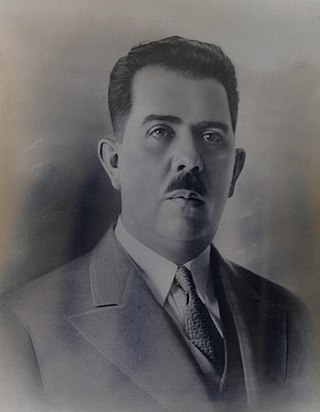 3
Lázaro Cárdenas del Río was a Mexican army officer and politician who served as president of Mexico from 1934 to 1940. Previously, he served as a general in the Constitutional Army during the Mexican Revolution and as Governor of Michoacán and President of the Institutional Revolutionary Party. He later served as the Secretary of National Defence. During his presidency, which is considered the end of the Maximato, he implemented massive land reform programs, led the expropriation of the country's oil industry, and implemented many left-leaning reforms.
3
Lázaro Cárdenas del Río was a Mexican army officer and politician who served as president of Mexico from 1934 to 1940. Previously, he served as a general in the Constitutional Army during the Mexican Revolution and as Governor of Michoacán and President of the Institutional Revolutionary Party. He later served as the Secretary of National Defence. During his presidency, which is considered the end of the Maximato, he implemented massive land reform programs, led the expropriation of the country's oil industry, and implemented many left-leaning reforms.
Matija Gubec
 3
Matija Gubec, also known as Ambroz Gubec, was a Croatian revolutionary, and a leader of the Croatian–Slovene Peasant Revolt of 1573. He was part of the court of three people that governed the rebels.
3
Matija Gubec, also known as Ambroz Gubec, was a Croatian revolutionary, and a leader of the Croatian–Slovene Peasant Revolt of 1573. He was part of the court of three people that governed the rebels.
Moctezuma II
 3
Motecuhzoma Xocoyotzin, referred to retroactively in European sources as Moctezuma II, was the ninth Emperor of the Aztec Empire, reigning from 1502 or 1503 to 1520. Through his marriage with Queen Tlapalizquixochtzin of Ecatepec, one of his two wives, he was also king consort of that altepetl.
3
Motecuhzoma Xocoyotzin, referred to retroactively in European sources as Moctezuma II, was the ninth Emperor of the Aztec Empire, reigning from 1502 or 1503 to 1520. Through his marriage with Queen Tlapalizquixochtzin of Ecatepec, one of his two wives, he was also king consort of that altepetl.
Hernán Cortés
 3
Hernán Cortés de Monroy y Pizarro Altamirano, 1st Marquess of the Valley of Oaxaca was a Spanish conquistador who led an expedition that caused the fall of the Aztec Empire and brought large portions of what is now mainland Mexico under the rule of the king of Castile in the early 16th century. Cortés was part of the generation of Spanish explorers and conquistadors who began the first phase of the Spanish colonization of the Americas.
3
Hernán Cortés de Monroy y Pizarro Altamirano, 1st Marquess of the Valley of Oaxaca was a Spanish conquistador who led an expedition that caused the fall of the Aztec Empire and brought large portions of what is now mainland Mexico under the rule of the king of Castile in the early 16th century. Cortés was part of the generation of Spanish explorers and conquistadors who began the first phase of the Spanish colonization of the Americas.
Atahualpa
 3
Atahualpa, also Atawallpa (Quechua), Atabalica, Atahuallpa, Atabalipa, was the last effective Inca emperor before his capture and execution during the Spanish conquest.
3
Atahualpa, also Atawallpa (Quechua), Atabalica, Atahuallpa, Atabalipa, was the last effective Inca emperor before his capture and execution during the Spanish conquest.
Felix of Nola
 3
Felix of Nola was a Christian presbyter at Nola near Naples in Italy. He sold off his possessions to give to the poor, but was arrested and tortured for his Christian faith during the persecution of Roman Emperor Decius. He was believed to have died a martyr's death during the persecution of Decius or Valerian but is now listed in the General Roman Calendar as a confessor of the faith, who survived his tortures.
3
Felix of Nola was a Christian presbyter at Nola near Naples in Italy. He sold off his possessions to give to the poor, but was arrested and tortured for his Christian faith during the persecution of Roman Emperor Decius. He was believed to have died a martyr's death during the persecution of Decius or Valerian but is now listed in the General Roman Calendar as a confessor of the faith, who survived his tortures.
Miguel de Unamuno
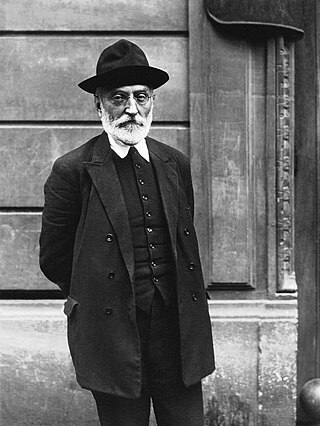 3
Miguel de Unamuno y Jugo was a Spanish essayist, novelist, poet, playwright, philosopher, professor of Greek and Classics, and later rector at the University of Salamanca.
3
Miguel de Unamuno y Jugo was a Spanish essayist, novelist, poet, playwright, philosopher, professor of Greek and Classics, and later rector at the University of Salamanca.
Charles V, Holy Roman Emperor
 3
Charles V was Holy Roman Emperor and Archduke of Austria from 1519 to 1556, King of Spain from 1516 to 1556, and Lord of the Netherlands as titular Duke of Burgundy from 1506 to 1555. He was heir to and then head of the rising House of Habsburg. His dominions in Europe included the Holy Roman Empire, extending from Germany to northern Italy with rule over the Austrian hereditary lands and Burgundian Low Countries, and Spain with its possessions of the southern Italian kingdoms of Naples, Sicily and Sardinia. In the Americas, he oversaw the continuation of Spanish colonization and a short-lived German colonization. The personal union of the European and American territories he ruled was the first collection of realms labelled "the empire on which the sun never sets".
3
Charles V was Holy Roman Emperor and Archduke of Austria from 1519 to 1556, King of Spain from 1516 to 1556, and Lord of the Netherlands as titular Duke of Burgundy from 1506 to 1555. He was heir to and then head of the rising House of Habsburg. His dominions in Europe included the Holy Roman Empire, extending from Germany to northern Italy with rule over the Austrian hereditary lands and Burgundian Low Countries, and Spain with its possessions of the southern Italian kingdoms of Naples, Sicily and Sardinia. In the Americas, he oversaw the continuation of Spanish colonization and a short-lived German colonization. The personal union of the European and American territories he ruled was the first collection of realms labelled "the empire on which the sun never sets".
Pierre Curie
 3
Pierre Curie was a French physicist, a pioneer in crystallography, magnetism, piezoelectricity, and radioactivity. In 1903, he received the Nobel Prize in Physics with his wife, Marie Skłodowska–Curie, and Henri Becquerel, "in recognition of the extraordinary services they have rendered by their joint researches on the radiation phenomena discovered by Professor Henri Becquerel". With their win, the Curies became the first ever married couple to win the Nobel Prize, launching the Curie family legacy of five Nobel Prizes.
3
Pierre Curie was a French physicist, a pioneer in crystallography, magnetism, piezoelectricity, and radioactivity. In 1903, he received the Nobel Prize in Physics with his wife, Marie Skłodowska–Curie, and Henri Becquerel, "in recognition of the extraordinary services they have rendered by their joint researches on the radiation phenomena discovered by Professor Henri Becquerel". With their win, the Curies became the first ever married couple to win the Nobel Prize, launching the Curie family legacy of five Nobel Prizes.
Pierre Corneille
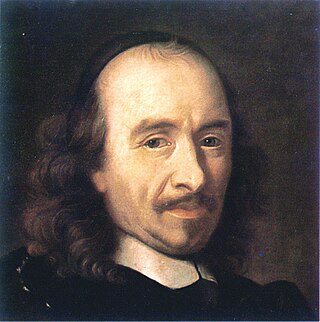 3
Pierre Corneille was a French tragedian. He is generally considered one of the three great seventeenth-century French dramatists, along with Molière and Racine.
3
Pierre Corneille was a French tragedian. He is generally considered one of the three great seventeenth-century French dramatists, along with Molière and Racine.
George V
 3
George V was King of the United Kingdom and the British Dominions, and Emperor of India, from 6 May 1910 until his death in 1936.
3
George V was King of the United Kingdom and the British Dominions, and Emperor of India, from 6 May 1910 until his death in 1936.
Tristan
 3
Tristan, also known as Tristram, Tristyn or Tristain and similar names, is the hero of the legend of Tristan and Iseult. In the legend, he is tasked with escorting the Irish princess Iseult to wed Tristan's uncle, King Mark of Cornwall. Tristan and Iseult accidentally drink a love potion during the journey and fall in love, beginning an adulterous relationship that eventually leads to Tristan's banishment and death. The character's first recorded appearance is in retellings of British mythology from the 12th century by Thomas of Britain and Gottfried von Strassburg, and later in the Prose Tristan. He is featured in Arthurian legends, including the seminal text Le Morte d'Arthur, as a skilled knight and a friend of Lancelot.
3
Tristan, also known as Tristram, Tristyn or Tristain and similar names, is the hero of the legend of Tristan and Iseult. In the legend, he is tasked with escorting the Irish princess Iseult to wed Tristan's uncle, King Mark of Cornwall. Tristan and Iseult accidentally drink a love potion during the journey and fall in love, beginning an adulterous relationship that eventually leads to Tristan's banishment and death. The character's first recorded appearance is in retellings of British mythology from the 12th century by Thomas of Britain and Gottfried von Strassburg, and later in the Prose Tristan. He is featured in Arthurian legends, including the seminal text Le Morte d'Arthur, as a skilled knight and a friend of Lancelot.
Arthur Rimbaud
 3
Jean Nicolas Arthur Rimbaud was a French poet known for his transgressive and surreal themes and for his influence on modern literature and arts, prefiguring surrealism. Born in Charleville, he started writing at a very young age and excelled as a student, but abandoned his formal education in his teenage years to run away to Paris amidst the Franco-Prussian War. During his late adolescence and early adulthood, he produced the bulk of his literary output. Rimbaud completely stopped writing literature at age 20 after assembling his last major work, Illuminations.
3
Jean Nicolas Arthur Rimbaud was a French poet known for his transgressive and surreal themes and for his influence on modern literature and arts, prefiguring surrealism. Born in Charleville, he started writing at a very young age and excelled as a student, but abandoned his formal education in his teenage years to run away to Paris amidst the Franco-Prussian War. During his late adolescence and early adulthood, he produced the bulk of his literary output. Rimbaud completely stopped writing literature at age 20 after assembling his last major work, Illuminations.
Robert H. Goddard
 3
Robert Hutchings Goddard was an American engineer, professor, physicist, and inventor who is credited with creating and building the world's first liquid-fueled rocket, which was successfully launched on March 16, 1926. By 1915 his pioneering work had dramatically improved the efficiency of the solid-fueled rocket, signaling the era of the modern rocket and innovation. He and his team launched 34 rockets between 1926 and 1941, achieving altitudes as high as 2.6 km (1.6 mi) and speeds as fast as 885 km/h (550 mph).
3
Robert Hutchings Goddard was an American engineer, professor, physicist, and inventor who is credited with creating and building the world's first liquid-fueled rocket, which was successfully launched on March 16, 1926. By 1915 his pioneering work had dramatically improved the efficiency of the solid-fueled rocket, signaling the era of the modern rocket and innovation. He and his team launched 34 rockets between 1926 and 1941, achieving altitudes as high as 2.6 km (1.6 mi) and speeds as fast as 885 km/h (550 mph).
Margaret Thatcher
 3
Margaret Hilda Thatcher, Baroness Thatcher, was a British stateswoman and Conservative politician who served as Prime Minister of the United Kingdom from 1979 to 1990 and Leader of the Conservative Party from 1975 to 1990. She was the longest-serving British prime minister of the 20th century and the first woman to hold the position. As prime minister, she implemented economic policies known as Thatcherism. A Soviet journalist dubbed her the "Iron Lady", a nickname that became associated with her uncompromising politics and leadership style.
3
Margaret Hilda Thatcher, Baroness Thatcher, was a British stateswoman and Conservative politician who served as Prime Minister of the United Kingdom from 1979 to 1990 and Leader of the Conservative Party from 1975 to 1990. She was the longest-serving British prime minister of the 20th century and the first woman to hold the position. As prime minister, she implemented economic policies known as Thatcherism. A Soviet journalist dubbed her the "Iron Lady", a nickname that became associated with her uncompromising politics and leadership style.
Pope Pius X
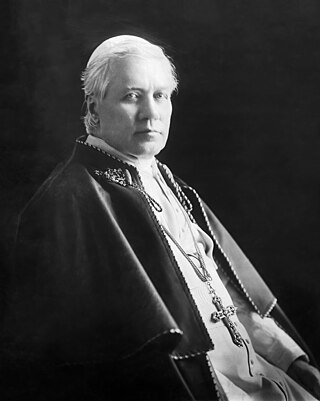 3
Pope Pius X was head of the Catholic Church from 4 August 1903 to his death in August 1914. Pius X is known for vigorously opposing modernist interpretations of Catholic doctrine, and for promoting liturgical reforms and scholastic theology. He initiated the preparation of the 1917 Code of Canon Law, the first comprehensive and systemic work of its kind. He is venerated as a saint in the Catholic Church. The Society of Saint Pius X, a traditionalist Catholic fraternity formed decades after his death, is named after him.
3
Pope Pius X was head of the Catholic Church from 4 August 1903 to his death in August 1914. Pius X is known for vigorously opposing modernist interpretations of Catholic doctrine, and for promoting liturgical reforms and scholastic theology. He initiated the preparation of the 1917 Code of Canon Law, the first comprehensive and systemic work of its kind. He is venerated as a saint in the Catholic Church. The Society of Saint Pius X, a traditionalist Catholic fraternity formed decades after his death, is named after him.
Ernest Hemingway
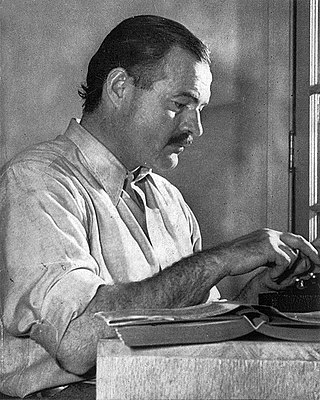 3
Ernest Miller Hemingway was an American novelist, short-story writer and journalist. Best known for an economical, understated style that significantly influenced later 20th-century writers, he is often romanticized for his adventurous lifestyle, and outspoken and blunt public image. Most of Hemingway's works were published between the mid-1920s and mid-1950s, including seven novels, six short-story collections and two non-fiction works. His writings have become classics of American literature; he was awarded the 1954 Nobel Prize in Literature, while three of his novels, four short-story collections and three nonfiction works were published posthumously.
3
Ernest Miller Hemingway was an American novelist, short-story writer and journalist. Best known for an economical, understated style that significantly influenced later 20th-century writers, he is often romanticized for his adventurous lifestyle, and outspoken and blunt public image. Most of Hemingway's works were published between the mid-1920s and mid-1950s, including seven novels, six short-story collections and two non-fiction works. His writings have become classics of American literature; he was awarded the 1954 Nobel Prize in Literature, while three of his novels, four short-story collections and three nonfiction works were published posthumously.
Honoré de Balzac
 3
Honoré de Balzac was a French novelist and playwright. The novel sequence La Comédie humaine, which presents a panorama of post-Napoleonic French life, is generally viewed as his magnum opus.
3
Honoré de Balzac was a French novelist and playwright. The novel sequence La Comédie humaine, which presents a panorama of post-Napoleonic French life, is generally viewed as his magnum opus.
Cyricus and Julitta
Sophia of Rome
 3
Saint Sophia of Rome is venerated as a Christian martyr.
She is identified in hagiographical tradition with the figure of Sophia of Milan, the mother of Saints Faith, Hope and Charity, whose veneration is attested for the sixth century.
3
Saint Sophia of Rome is venerated as a Christian martyr.
She is identified in hagiographical tradition with the figure of Sophia of Milan, the mother of Saints Faith, Hope and Charity, whose veneration is attested for the sixth century.
Jean de La Fontaine
 3
Jean de La Fontaine was a French fabulist and one of the most widely read French poets of the 17th century. He is known above all for his Fables, which provided a model for subsequent fabulists across Europe and numerous alternative versions in France, as well as in French regional languages.
3
Jean de La Fontaine was a French fabulist and one of the most widely read French poets of the 17th century. He is known above all for his Fables, which provided a model for subsequent fabulists across Europe and numerous alternative versions in France, as well as in French regional languages.
Thomas Gainsborough
 3
Thomas Gainsborough was an English portrait and landscape painter, draughtsman, and printmaker. Along with his rival Sir Joshua Reynolds, he is considered one of the most important British artists of the second half of the 18th century. He painted quickly, and the works of his maturity are characterised by a light palette and easy strokes. Despite being a prolific portrait painter, Gainsborough gained greater satisfaction from his landscapes. He is credited as the originator of the 18th-century British landscape school. Gainsborough was a founding member of the Royal Academy.
3
Thomas Gainsborough was an English portrait and landscape painter, draughtsman, and printmaker. Along with his rival Sir Joshua Reynolds, he is considered one of the most important British artists of the second half of the 18th century. He painted quickly, and the works of his maturity are characterised by a light palette and easy strokes. Despite being a prolific portrait painter, Gainsborough gained greater satisfaction from his landscapes. He is credited as the originator of the 18th-century British landscape school. Gainsborough was a founding member of the Royal Academy.
Paul Verlaine
 3
Paul-Marie Verlaine was a French poet associated with the Symbolist movement and the Decadent movement. He is considered one of the greatest representatives of the fin de siècle in international and French poetry.
3
Paul-Marie Verlaine was a French poet associated with the Symbolist movement and the Decadent movement. He is considered one of the greatest representatives of the fin de siècle in international and French poetry.
Richard Nixon
 3
Richard Milhous Nixon was the 37th president of the United States, serving from 1969 to 1974. A member of the Republican Party, he previously served as a representative and senator from California and as the 36th vice president from 1953 to 1961 under President Dwight D. Eisenhower. His presidency saw the reduction of U.S. involvement in the Vietnam War, détente with the Soviet Union and China, the Apollo 11 Moon landing, and the establishment of the Environmental Protection Agency and Occupational Safety and Health Administration. Nixon's second term ended early when he became the only U.S. president to resign from office, as a result of the Watergate scandal.
3
Richard Milhous Nixon was the 37th president of the United States, serving from 1969 to 1974. A member of the Republican Party, he previously served as a representative and senator from California and as the 36th vice president from 1953 to 1961 under President Dwight D. Eisenhower. His presidency saw the reduction of U.S. involvement in the Vietnam War, détente with the Soviet Union and China, the Apollo 11 Moon landing, and the establishment of the Environmental Protection Agency and Occupational Safety and Health Administration. Nixon's second term ended early when he became the only U.S. president to resign from office, as a result of the Watergate scandal.
Jacques Cartier
 3
Jacques Cartier was a French-Breton maritime explorer for France. Jacques Cartier was the first European to describe and map the Gulf of Saint Lawrence and the shores of the Saint Lawrence River, which he named "The Country of Canadas" after the Iroquoian names for the two big settlements he saw at Stadacona and at Hochelaga.
3
Jacques Cartier was a French-Breton maritime explorer for France. Jacques Cartier was the first European to describe and map the Gulf of Saint Lawrence and the shores of the Saint Lawrence River, which he named "The Country of Canadas" after the Iroquoian names for the two big settlements he saw at Stadacona and at Hochelaga.
Orpheus
 3
In Greek mythology, Orpheus was a Thracian bard, legendary musician and prophet. He was also a renowned poet and, according to the legend, travelled with Jason and the Argonauts in search of the Golden Fleece, and even descended into the underworld of Hades, to recover his lost wife Eurydice.
3
In Greek mythology, Orpheus was a Thracian bard, legendary musician and prophet. He was also a renowned poet and, according to the legend, travelled with Jason and the Argonauts in search of the Golden Fleece, and even descended into the underworld of Hades, to recover his lost wife Eurydice.
Georgi Dimitrov
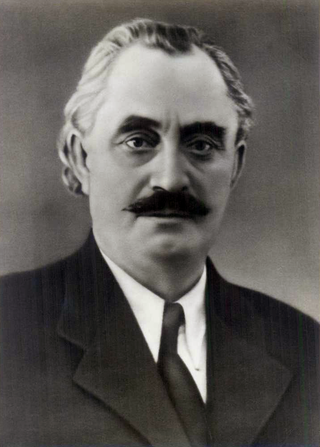 3
Georgi Dimitrov Mihaylov also known as Georgiy Mihaylovich Dimitrov, was a Bulgarian communist politician who served as General Secretary of the Bulgarian Communist Party from 1946 to 1949. From 1935 to 1943, he was the General Secretary of the Communist International.
3
Georgi Dimitrov Mihaylov also known as Georgiy Mihaylovich Dimitrov, was a Bulgarian communist politician who served as General Secretary of the Bulgarian Communist Party from 1946 to 1949. From 1935 to 1943, he was the General Secretary of the Communist International.
Hristo Botev
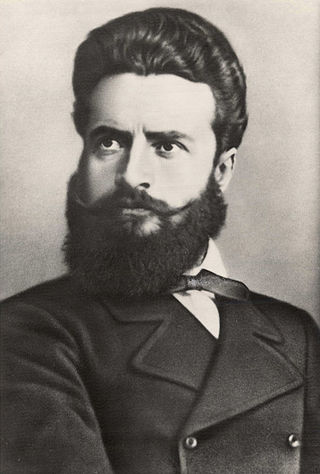 3
Hristo Botev, born Hristo Botyov Petkov, was a Bulgarian revolutionary and poet. Botev is considered by Bulgarians to be a symbolic historical figure and national hero. His poetry is a prime example of the literature of the Bulgarian National Revival, though he is considered to be ahead of his contemporaries in his political, philosophical, and aesthetic views.
3
Hristo Botev, born Hristo Botyov Petkov, was a Bulgarian revolutionary and poet. Botev is considered by Bulgarians to be a symbolic historical figure and national hero. His poetry is a prime example of the literature of the Bulgarian National Revival, though he is considered to be ahead of his contemporaries in his political, philosophical, and aesthetic views.
Alphonsus Liguori
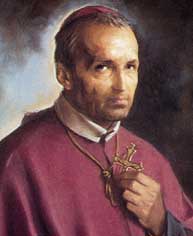 3
Alphonsus Liguori, CSsR, sometimes called Alphonsus Maria de Liguori or Saint Alphonsus Liguori, was an Italian Catholic bishop, spiritual writer, composer, musician, artist, poet, lawyer, scholastic philosopher, and theologian. He founded the Congregation of the Most Holy Redeemer, known as the Redemptorists, in November 1732.
3
Alphonsus Liguori, CSsR, sometimes called Alphonsus Maria de Liguori or Saint Alphonsus Liguori, was an Italian Catholic bishop, spiritual writer, composer, musician, artist, poet, lawyer, scholastic philosopher, and theologian. He founded the Congregation of the Most Holy Redeemer, known as the Redemptorists, in November 1732.
Quiteria
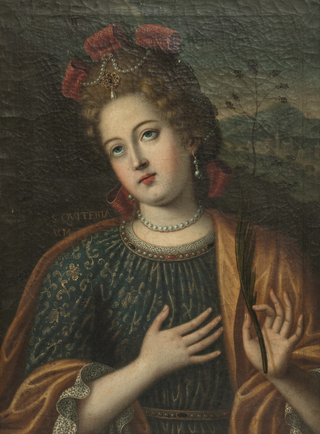 3
Quiteria was a second-century virgin martyr and saint about whom nothing is certain except her name and her cult. She appears in the Roman Martyrology, but not in any other ancient calendars.
3
Quiteria was a second-century virgin martyr and saint about whom nothing is certain except her name and her cult. She appears in the Roman Martyrology, but not in any other ancient calendars.
Melvin Jones (Lions Club)
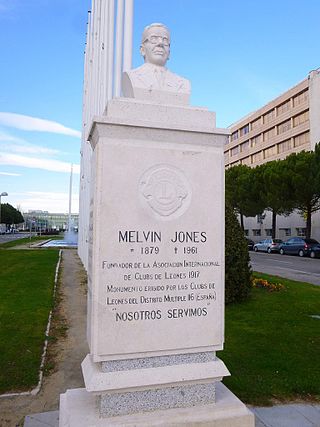 3
Melvin Jones was the founder and secretary-treasurer of Lions Clubs International.
3
Melvin Jones was the founder and secretary-treasurer of Lions Clubs International.
Elizabeth (biblical figure)
 3
Elizabeth was the mother of John the Baptist, the wife of Zechariah, and maternal aunt of Mary, mother of Jesus, according to the Gospel of Luke and in Islamic tradition. She was past normal child-bearing age when she conceived and gave birth to John.
3
Elizabeth was the mother of John the Baptist, the wife of Zechariah, and maternal aunt of Mary, mother of Jesus, according to the Gospel of Luke and in Islamic tradition. She was past normal child-bearing age when she conceived and gave birth to John.
Our Lady of Fátima
 3
Our Lady of Fátima is a Catholic title of Mary, mother of Jesus, based on the Marian apparitions reported in 1917 by three shepherd children at the Cova da Iria in Fátima, Portugal. The three children were Lúcia dos Santos and her cousins Francisco and Jacinta Marto. José Alves Correia da Silva, Bishop of Leiria, declared the events worthy of belief on 13 October 1930.
3
Our Lady of Fátima is a Catholic title of Mary, mother of Jesus, based on the Marian apparitions reported in 1917 by three shepherd children at the Cova da Iria in Fátima, Portugal. The three children were Lúcia dos Santos and her cousins Francisco and Jacinta Marto. José Alves Correia da Silva, Bishop of Leiria, declared the events worthy of belief on 13 October 1930.
Miloš Obrenović, Prince of Serbia
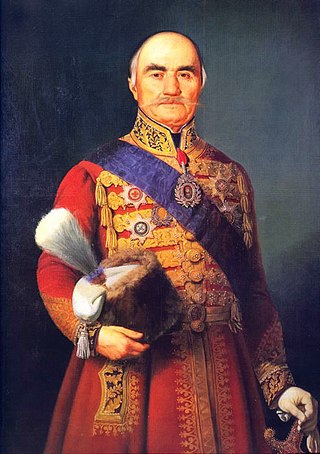 3
Miloš Obrenović born Miloš Teodorović, also known as Miloš the Great was the Prince of Serbia twice, from 1815 to 1839, and from 1858 to 1860. He was an eminent figure of the First Serbian uprising, the leader of the Second Serbian uprising, and the founder of the House of Obrenović. Under his rule, Serbia became an autonomous principality within the Ottoman Empire. Prince Miloš was an autocrat, consistently refusing to decentralize power, which gave rise to a strong internal opposition. Despite his humble background, he eventually became the most affluent man in Serbia and one of the wealthiest in the Balkan peninsula, possessing estates in Vienna, Serbia and Wallachia. During his rule, Miloš bought a certain number of estates and ships from the Ottomans and was also a prominent trader.
3
Miloš Obrenović born Miloš Teodorović, also known as Miloš the Great was the Prince of Serbia twice, from 1815 to 1839, and from 1858 to 1860. He was an eminent figure of the First Serbian uprising, the leader of the Second Serbian uprising, and the founder of the House of Obrenović. Under his rule, Serbia became an autonomous principality within the Ottoman Empire. Prince Miloš was an autocrat, consistently refusing to decentralize power, which gave rise to a strong internal opposition. Despite his humble background, he eventually became the most affluent man in Serbia and one of the wealthiest in the Balkan peninsula, possessing estates in Vienna, Serbia and Wallachia. During his rule, Miloš bought a certain number of estates and ships from the Ottomans and was also a prominent trader.
Prince Marko
 3
Marko Mrnjavčević was the de jure Serbian king from 1371 to 1395, while he was the de facto ruler of territory in western Macedonia centered on the town of Prilep. He is known as Prince Marko and King Marko in South Slavic oral tradition, in which he has become a major character during the period of Ottoman rule over the Balkans. Marko's father, King Vukašin, was co-ruler with Serbian Tsar Stefan Uroš V, whose reign was characterised by weakening central authority and the gradual disintegration of the Serbian Empire. Vukašin's holdings included lands in north-western Macedonia and Kosovo. In 1370 or 1371, he crowned Marko "young king"; this title included the possibility that Marko would succeed the childless Uroš on the Serbian throne.
3
Marko Mrnjavčević was the de jure Serbian king from 1371 to 1395, while he was the de facto ruler of territory in western Macedonia centered on the town of Prilep. He is known as Prince Marko and King Marko in South Slavic oral tradition, in which he has become a major character during the period of Ottoman rule over the Balkans. Marko's father, King Vukašin, was co-ruler with Serbian Tsar Stefan Uroš V, whose reign was characterised by weakening central authority and the gradual disintegration of the Serbian Empire. Vukašin's holdings included lands in north-western Macedonia and Kosovo. In 1370 or 1371, he crowned Marko "young king"; this title included the possibility that Marko would succeed the childless Uroš on the Serbian throne.
Ivan Goran Kovačić
 3
Ivan Goran Kovačić was a Croatian poet and writer.
3
Ivan Goran Kovačić was a Croatian poet and writer.
Miroslav Krleža
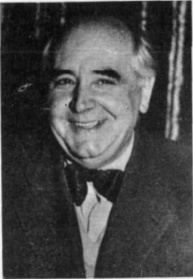 3
Miroslav Krleža was a Yugoslav and Croatian writer who is widely considered to be the greatest Croatian writer of the 20th century. He wrote notable works in all the literary genres, including poetry, theater, short stories, novels, and an intimate diary. His works often include themes of bourgeois hypocrisy and conformism in Austria-Hungary and the Kingdom of Yugoslavia. Krleža wrote numerous essays on problems of art, history, politics, literature, philosophy, and military strategy, and was known as one of the great polemicists of the century. His style combines visionary poetic language and sarcasm.
3
Miroslav Krleža was a Yugoslav and Croatian writer who is widely considered to be the greatest Croatian writer of the 20th century. He wrote notable works in all the literary genres, including poetry, theater, short stories, novels, and an intimate diary. His works often include themes of bourgeois hypocrisy and conformism in Austria-Hungary and the Kingdom of Yugoslavia. Krleža wrote numerous essays on problems of art, history, politics, literature, philosophy, and military strategy, and was known as one of the great polemicists of the century. His style combines visionary poetic language and sarcasm.
Mihajlo Pupin
 3
Mihajlo Idvorski Pupin, also known as Michael Pupin, was a Serbian physicist, physical chemist and philanthropist based in the United States.
3
Mihajlo Idvorski Pupin, also known as Michael Pupin, was a Serbian physicist, physical chemist and philanthropist based in the United States.
Peter I of Serbia
 3
Peter I was King of Serbia from 15 June 1903 to 1 December 1918. On 1 December 1918, he became King of the Serbs, Croats and Slovenes, and he held that title until his death three years later. Since he was the king of Serbia during a period of great Serbian military success, he was remembered by Serbians as King Peter the Liberator and also as the Old King.
3
Peter I was King of Serbia from 15 June 1903 to 1 December 1918. On 1 December 1918, he became King of the Serbs, Croats and Slovenes, and he held that title until his death three years later. Since he was the king of Serbia during a period of great Serbian military success, he was remembered by Serbians as King Peter the Liberator and also as the Old King.
Branko Radičević
 3
Aleksije "Branko" Radičević was a Serbian poet who wrote in the period of Romanticism.
3
Aleksije "Branko" Radičević was a Serbian poet who wrote in the period of Romanticism.
Aleksa Šantić
Starina Novak
 3
Starina Novak was a Serb hajduk who distinguished himself in many battles against the Ottoman Empire. He is considered a national hero by both the Serbs and the Romanians.
3
Starina Novak was a Serb hajduk who distinguished himself in many battles against the Ottoman Empire. He is considered a national hero by both the Serbs and the Romanians.
Ivo Andrić
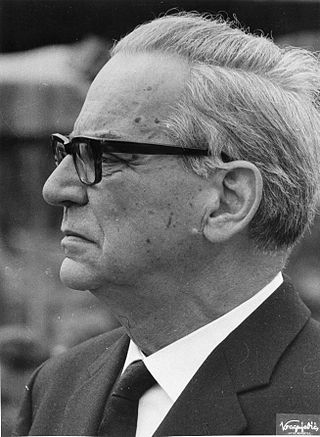 3
Ivo Andrić was a Yugoslav novelist, poet and short story writer who won the Nobel Prize in Literature in 1961. His writings dealt mainly with life in his native Bosnia under Ottoman rule.
3
Ivo Andrić was a Yugoslav novelist, poet and short story writer who won the Nobel Prize in Literature in 1961. His writings dealt mainly with life in his native Bosnia under Ottoman rule.
Hyacinth of Caesarea
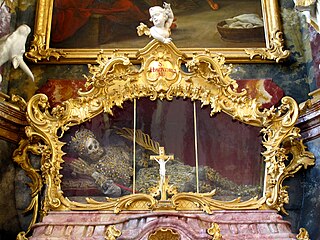 3
Hyacinth was a young Christian living at the start of the second century, who is honored as a martyr and a saint by both the Eastern Orthodox Church and the Roman Catholic Church. Hyacinth is sometimes called by his Latin name Hyacinthus.
3
Hyacinth was a young Christian living at the start of the second century, who is honored as a martyr and a saint by both the Eastern Orthodox Church and the Roman Catholic Church. Hyacinth is sometimes called by his Latin name Hyacinthus.
Andrés Bello
 3
Andrés de Jesús María y José Bello López was a Venezuelan humanist, diplomat, poet, legislator, philosopher, educator and philologist, whose political and literary works constitute an important part of Spanish American culture. Bello is featured on the old 2,000 Venezuelan bolívar and the 20,000 Chilean peso notes.
3
Andrés de Jesús María y José Bello López was a Venezuelan humanist, diplomat, poet, legislator, philosopher, educator and philologist, whose political and literary works constitute an important part of Spanish American culture. Bello is featured on the old 2,000 Venezuelan bolívar and the 20,000 Chilean peso notes.
Saint Lawrence
 3
Saint Lawrence or Laurence was one of the seven deacons of the city of Rome under Pope Sixtus II who were martyred in the persecution of the Christians that the Roman Emperor Valerian ordered in 258.
3
Saint Lawrence or Laurence was one of the seven deacons of the city of Rome under Pope Sixtus II who were martyred in the persecution of the Christians that the Roman Emperor Valerian ordered in 258.
Frans Hals
 3
Frans Hals the Elder was a Dutch Golden Age painter, chiefly of individual and group portraits and of tronies, who lived and worked in Haarlem.
3
Frans Hals the Elder was a Dutch Golden Age painter, chiefly of individual and group portraits and of tronies, who lived and worked in Haarlem.
Antoine de Saint-Exupéry
 3
Antoine Marie Jean-Baptiste Roger, comte de Saint-Exupéry, known simply as Antoine de Saint-Exupéry, was a French writer, poet, journalist and aviator. He received several prestigious literary awards for his novella The Little Prince and for his lyrical aviation writings, including Wind, Sand and Stars and Night Flight. His works have been translated into many languages.
3
Antoine Marie Jean-Baptiste Roger, comte de Saint-Exupéry, known simply as Antoine de Saint-Exupéry, was a French writer, poet, journalist and aviator. He received several prestigious literary awards for his novella The Little Prince and for his lyrical aviation writings, including Wind, Sand and Stars and Night Flight. His works have been translated into many languages.
Jean Mermoz
 3
Jean Mermoz was a French aviator, viewed as a hero by other pilots such as Saint-Exupéry, and in his native France, where many schools bear his name. In Brazil, he also is recognized as a pioneer aviator.
3
Jean Mermoz was a French aviator, viewed as a hero by other pilots such as Saint-Exupéry, and in his native France, where many schools bear his name. In Brazil, he also is recognized as a pioneer aviator.
César Franck
 3
César-Auguste-Jean-Guillaume-Hubert Franck was a French Romantic composer, pianist, organist, and music teacher born in present-day Belgium.
3
César-Auguste-Jean-Guillaume-Hubert Franck was a French Romantic composer, pianist, organist, and music teacher born in present-day Belgium.
Francisco Ferrer
 3
Francesc Ferrer i Guàrdia, widely known as Francisco Ferrer, was a Spanish radical freethinker, anarchist, and educationist behind a network of secular, private, libertarian schools in and around Barcelona. His execution, following a revolt in Barcelona, propelled Ferrer into martyrdom and grew an international movement of radicals and libertarians, who established schools in his model and promoted his schooling approach.
3
Francesc Ferrer i Guàrdia, widely known as Francisco Ferrer, was a Spanish radical freethinker, anarchist, and educationist behind a network of secular, private, libertarian schools in and around Barcelona. His execution, following a revolt in Barcelona, propelled Ferrer into martyrdom and grew an international movement of radicals and libertarians, who established schools in his model and promoted his schooling approach.
Lambert of Maastricht
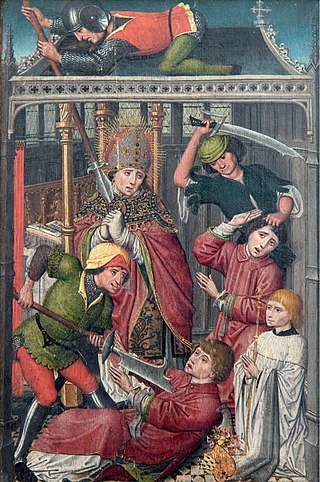 3
Lambert of Maastricht, commonly referred to as Saint Lambert, was the bishop of Maastricht-Liège (Tongeren) from about 670 until his death. Lambert denounced Pepin's liaison with his mistress or bigamous wife Alpaida, the mother of Charles Martel. The bishop was murdered during the political turmoil that developed when various families fought for influence as the Merovingian dynasty gave way to the Carolingians. He is considered a martyr for his defence of marriage. His feast day is September 17.
3
Lambert of Maastricht, commonly referred to as Saint Lambert, was the bishop of Maastricht-Liège (Tongeren) from about 670 until his death. Lambert denounced Pepin's liaison with his mistress or bigamous wife Alpaida, the mother of Charles Martel. The bishop was murdered during the political turmoil that developed when various families fought for influence as the Merovingian dynasty gave way to the Carolingians. He is considered a martyr for his defence of marriage. His feast day is September 17.
Ivan Turgenev
 3
Ivan Sergeyevich Turgenev was a Russian novelist, short story writer, poet, playwright, translator and popularizer of Russian literature in the West.
3
Ivan Sergeyevich Turgenev was a Russian novelist, short story writer, poet, playwright, translator and popularizer of Russian literature in the West.
Oleg Koshevoy
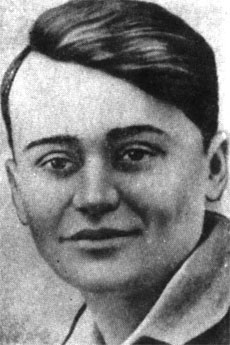 3
Oleg Vasilyevich Koshevoy was a Soviet partisan and one of the founders of the clandestine organization Young Guard, which fought the Nazi forces in Krasnodon during World War II between 1941 and 1945.
3
Oleg Vasilyevich Koshevoy was a Soviet partisan and one of the founders of the clandestine organization Young Guard, which fought the Nazi forces in Krasnodon during World War II between 1941 and 1945.
Gago Coutinho
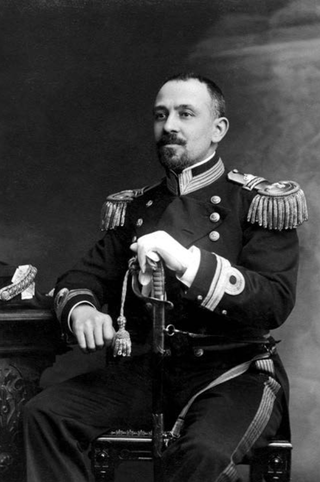 3
Carlos Viegas Gago Coutinho, GCTE, GCC, generally known simply as Gago Coutinho, was a Portuguese geographer, cartographer, naval officer, historian and aviator. An aviation pioneer, Gago Coutinho and Sacadura Cabral were the first to cross the South Atlantic Ocean by air, in a journey from March to June 1922, started in Lisbon, Portugal, and finished in Rio de Janeiro, Brazil, using a seaplane variant of the British reconnaissance biplane Fairey III.
3
Carlos Viegas Gago Coutinho, GCTE, GCC, generally known simply as Gago Coutinho, was a Portuguese geographer, cartographer, naval officer, historian and aviator. An aviation pioneer, Gago Coutinho and Sacadura Cabral were the first to cross the South Atlantic Ocean by air, in a journey from March to June 1922, started in Lisbon, Portugal, and finished in Rio de Janeiro, Brazil, using a seaplane variant of the British reconnaissance biplane Fairey III.
Almeida Garrett
 3
João Baptista da Silva Leitão de Almeida Garrett, 1st Viscount of Almeida Garrett was a Portuguese poet, orator, playwright, novelist, journalist, politician, and a peer of the realm. A major promoter of theater in Portugal he is considered the greatest figure of Portuguese Romanticism and a true revolutionary and humanist. He proposed the construction of the D. Maria II National Theatre and the creation of the Conservatory of Dramatic Art.
3
João Baptista da Silva Leitão de Almeida Garrett, 1st Viscount of Almeida Garrett was a Portuguese poet, orator, playwright, novelist, journalist, politician, and a peer of the realm. A major promoter of theater in Portugal he is considered the greatest figure of Portuguese Romanticism and a true revolutionary and humanist. He proposed the construction of the D. Maria II National Theatre and the creation of the Conservatory of Dramatic Art.
Ali-Shir Nava'i
 3
'Ali-Shir Nava'i, also known as Nizām-al-Din ʿAli-Shir Herawī was a Timurid poet, writer, statesman, linguist, Hanafi Maturidi mystic and painter who was the greatest representative of Chagatai literature.
3
'Ali-Shir Nava'i, also known as Nizām-al-Din ʿAli-Shir Herawī was a Timurid poet, writer, statesman, linguist, Hanafi Maturidi mystic and painter who was the greatest representative of Chagatai literature.
Ulrich of Augsburg
 3
Ulrich of Augsburg, sometimes spelled Uodalric or Odalrici, was Prince-Bishop of Augsburg in the Holy Roman Empire. He was the first saint to be canonized not by a local authority but by the pope.
3
Ulrich of Augsburg, sometimes spelled Uodalric or Odalrici, was Prince-Bishop of Augsburg in the Holy Roman Empire. He was the first saint to be canonized not by a local authority but by the pope.
Arthur Schopenhauer
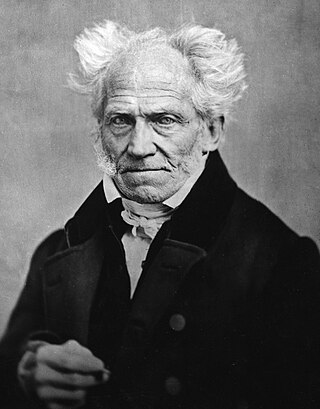 3
Arthur Schopenhauer was a German philosopher. He is known for his 1818 work The World as Will and Representation, which characterizes the phenomenal world as the manifestation of a blind and irrational noumenal will. Building on the transcendental idealism of Immanuel Kant (1724–1804), Schopenhauer developed an atheistic metaphysical and ethical system that rejected the contemporaneous ideas of German idealism.
3
Arthur Schopenhauer was a German philosopher. He is known for his 1818 work The World as Will and Representation, which characterizes the phenomenal world as the manifestation of a blind and irrational noumenal will. Building on the transcendental idealism of Immanuel Kant (1724–1804), Schopenhauer developed an atheistic metaphysical and ethical system that rejected the contemporaneous ideas of German idealism.
Gerhart Hauptmann
 3
Gerhart Johann Robert Hauptmann was a German dramatist and novelist. He is counted among the most important promoters of literary naturalism, though he integrated other styles into his work as well. He received the Nobel Prize in Literature in 1912.
3
Gerhart Johann Robert Hauptmann was a German dramatist and novelist. He is counted among the most important promoters of literary naturalism, though he integrated other styles into his work as well. He received the Nobel Prize in Literature in 1912.
George Frideric Handel
 3
George Frideric Handel was a German-British Baroque composer well known for his operas, oratorios, anthems, concerti grossi, and organ concertos. Handel received his training in Halle and worked as a composer in Hamburg and Italy before settling in London in 1712, where he spent the bulk of his career and became a naturalised British subject in 1727. He was strongly influenced both by the middle-German polyphonic choral tradition and by composers of the Italian Baroque. In turn, Handel's music forms one of the peaks of the "high baroque" style, bringing Italian opera to its highest development, creating the genres of English oratorio and organ concerto, and introducing a new style into English church music. He is consistently recognized as one of the greatest composers of his age.
3
George Frideric Handel was a German-British Baroque composer well known for his operas, oratorios, anthems, concerti grossi, and organ concertos. Handel received his training in Halle and worked as a composer in Hamburg and Italy before settling in London in 1712, where he spent the bulk of his career and became a naturalised British subject in 1727. He was strongly influenced both by the middle-German polyphonic choral tradition and by composers of the Italian Baroque. In turn, Handel's music forms one of the peaks of the "high baroque" style, bringing Italian opera to its highest development, creating the genres of English oratorio and organ concerto, and introducing a new style into English church music. He is consistently recognized as one of the greatest composers of his age.
Robert Bosch
 3
Robert Bosch was a German industrialist, engineer and inventor, founder of Robert Bosch GmbH.
3
Robert Bosch was a German industrialist, engineer and inventor, founder of Robert Bosch GmbH.
Sigmund Freud
 3
Sigmund Freud was an Austrian neurologist and the founder of psychoanalysis, a clinical method for evaluating and treating pathologies seen as originating from conflicts in the psyche, through dialogue between patient and psychoanalyst, and the distinctive theory of mind and human agency derived from it.
3
Sigmund Freud was an Austrian neurologist and the founder of psychoanalysis, a clinical method for evaluating and treating pathologies seen as originating from conflicts in the psyche, through dialogue between patient and psychoanalyst, and the distinctive theory of mind and human agency derived from it.
Caesar von Hofacker
 3
Caesar von Hofacker was a German Luftwaffe Lieutenant Colonel and member of the 20 July plot against Adolf Hitler.
3
Caesar von Hofacker was a German Luftwaffe Lieutenant Colonel and member of the 20 July plot against Adolf Hitler.
Gustav Mahler
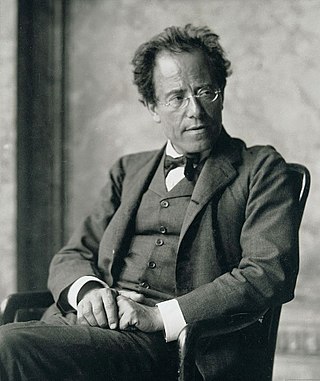 3
Gustav Mahler was an Austro-Bohemian Romantic composer, and one of the leading conductors of his generation. As a composer he acted as a bridge between the 19th-century Austro-German tradition and the modernism of the early 20th century. While in his lifetime his status as a conductor was established beyond question, his own music gained wide popularity only after periods of relative neglect, which included a ban on its performance in much of Europe during the Nazi era. After 1945 his compositions were rediscovered by a new generation of listeners; Mahler then became one of the most frequently performed and recorded of all composers, a position he has sustained into the 21st century.
3
Gustav Mahler was an Austro-Bohemian Romantic composer, and one of the leading conductors of his generation. As a composer he acted as a bridge between the 19th-century Austro-German tradition and the modernism of the early 20th century. While in his lifetime his status as a conductor was established beyond question, his own music gained wide popularity only after periods of relative neglect, which included a ban on its performance in much of Europe during the Nazi era. After 1945 his compositions were rediscovered by a new generation of listeners; Mahler then became one of the most frequently performed and recorded of all composers, a position he has sustained into the 21st century.
Rudolf Steiner
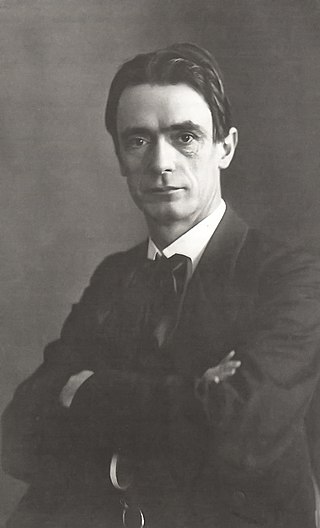 3
Rudolf Joseph Lorenz Steiner was an Austrian occultist, social reformer, architect, esotericist, and claimed clairvoyant. Steiner gained initial recognition at the end of the nineteenth century as a literary critic and published works including The Philosophy of Freedom. At the beginning of the twentieth century he founded an esoteric spiritual movement, anthroposophy, with roots in German idealist philosophy and theosophy. His teachings are influenced by Christian Gnosticism. Many of his ideas are pseudoscientific. He was also prone to pseudohistory.
3
Rudolf Joseph Lorenz Steiner was an Austrian occultist, social reformer, architect, esotericist, and claimed clairvoyant. Steiner gained initial recognition at the end of the nineteenth century as a literary critic and published works including The Philosophy of Freedom. At the beginning of the twentieth century he founded an esoteric spiritual movement, anthroposophy, with roots in German idealist philosophy and theosophy. His teachings are influenced by Christian Gnosticism. Many of his ideas are pseudoscientific. He was also prone to pseudohistory.
Ferdinand Porsche
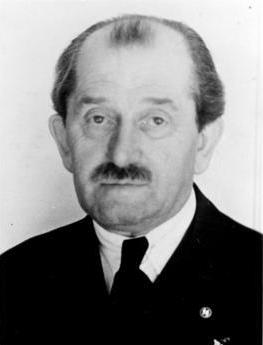 3
Ferdinand Porsche was a German-Bohemian automotive engineer and founder of the Porsche AG. He is best known for creating the first gasoline–electric hybrid vehicle (Lohner–Porsche), the Volkswagen Beetle, the Auto Union racing cars, the Mercedes-Benz SS/SSK, and several other important developments and Porsche automobiles.
3
Ferdinand Porsche was a German-Bohemian automotive engineer and founder of the Porsche AG. He is best known for creating the first gasoline–electric hybrid vehicle (Lohner–Porsche), the Volkswagen Beetle, the Auto Union racing cars, the Mercedes-Benz SS/SSK, and several other important developments and Porsche automobiles.
Bertha von Suttner
 3
Bertha Sophie Felicitas Freifrau von Suttner was an Austro-Bohemian noblewoman, pacifist and novelist. In 1905, she became the second female Nobel laureate, the first woman to be awarded the Nobel Peace Prize, and the first Austrian and Czech laureate.
3
Bertha Sophie Felicitas Freifrau von Suttner was an Austro-Bohemian noblewoman, pacifist and novelist. In 1905, she became the second female Nobel laureate, the first woman to be awarded the Nobel Peace Prize, and the first Austrian and Czech laureate.
Robert Stolz
 3
Robert Elisabeth Stolz was an Austrian songwriter and conductor as well as a composer of operettas and film music.
3
Robert Elisabeth Stolz was an Austrian songwriter and conductor as well as a composer of operettas and film music.
Nikolaus Lenau
 3
Nikolaus Lenau was the pen name of Nikolaus Franz Niembsch Edler von Strehlenau, a German-language Austrian poet.
3
Nikolaus Lenau was the pen name of Nikolaus Franz Niembsch Edler von Strehlenau, a German-language Austrian poet.
Friedrich Wilhelm Raiffeisen
 3
Friedrich Wilhelm Raiffeisen was a German mayor and cooperative pioneer. Several credit union systems and cooperative banks have been named after Raiffeisen, who pioneered rural credit unions.
3
Friedrich Wilhelm Raiffeisen was a German mayor and cooperative pioneer. Several credit union systems and cooperative banks have been named after Raiffeisen, who pioneered rural credit unions.
William IV
 3
William IV was King of the United Kingdom of Great Britain and Ireland and King of Hanover from 26 June 1830 until his death in 1837. The third son of George III, William succeeded his elder brother George IV, becoming the last king and penultimate monarch of Britain's House of Hanover.
3
William IV was King of the United Kingdom of Great Britain and Ireland and King of Hanover from 26 June 1830 until his death in 1837. The third son of George III, William succeeded his elder brother George IV, becoming the last king and penultimate monarch of Britain's House of Hanover.
Benito Pérez Galdós
 3
Benito Pérez Galdós was a Spanish realist novelist. He was a leading literary figure in 19th-century Spain, and some scholars consider him second only to Miguel de Cervantes in stature as a Spanish novelist.
3
Benito Pérez Galdós was a Spanish realist novelist. He was a leading literary figure in 19th-century Spain, and some scholars consider him second only to Miguel de Cervantes in stature as a Spanish novelist.
Manuel de Falla
Lope de Vega
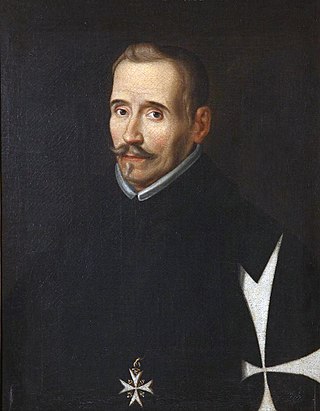 3
Félix Lope de Vega y Carpio was a Spanish playwright, poet, and novelist who was a key figure in the Spanish Golden Age (1492–1659) of Baroque literature. In the literature of Spain, Lope de Vega is second to Miguel de Cervantes. Cervantes said that Lope de Vega was “The Phoenix of Wits” and “Monster of Nature”.
3
Félix Lope de Vega y Carpio was a Spanish playwright, poet, and novelist who was a key figure in the Spanish Golden Age (1492–1659) of Baroque literature. In the literature of Spain, Lope de Vega is second to Miguel de Cervantes. Cervantes said that Lope de Vega was “The Phoenix of Wits” and “Monster of Nature”.
Máximo Gómez
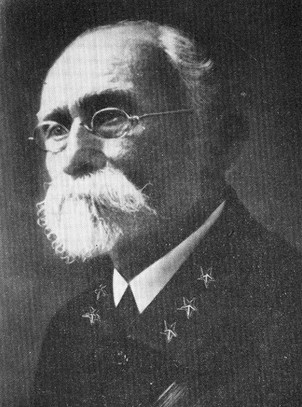 3
Máximo Gómez y Báez was a Dominican Generalissimo in Cuba's War of Independence (1895–1898). He was known for his controversial scorched-earth policy, which entailed dynamiting passenger trains and torching the Spanish loyalists' property and sugar plantations—including many owned by Americans. He greatly increased the efficacy of the attacks by torturing and killing not only Spanish soldiers, but also Spanish sympathizers and especially Cubans loyal to Spain. By the time the Spanish–American War broke out in April 1898, the rebellion was virtually defeated in most of Western Cuba, with only a few operating pockets in the center and the east. He refused to join forces with the Spanish in fighting off the United States, and he retired to the Quinta de los Molinos, a luxury villa outside of Havana after the war's end formerly used by captains generals as summer residence.
3
Máximo Gómez y Báez was a Dominican Generalissimo in Cuba's War of Independence (1895–1898). He was known for his controversial scorched-earth policy, which entailed dynamiting passenger trains and torching the Spanish loyalists' property and sugar plantations—including many owned by Americans. He greatly increased the efficacy of the attacks by torturing and killing not only Spanish soldiers, but also Spanish sympathizers and especially Cubans loyal to Spain. By the time the Spanish–American War broke out in April 1898, the rebellion was virtually defeated in most of Western Cuba, with only a few operating pockets in the center and the east. He refused to join forces with the Spanish in fighting off the United States, and he retired to the Quinta de los Molinos, a luxury villa outside of Havana after the war's end formerly used by captains generals as summer residence.
Che Guevara
 3
Ernesto "Che" Guevara was an Argentine Marxist revolutionary, physician, author, guerrilla leader, diplomat, and military theorist. A major figure of the Cuban Revolution, his stylized visage has become a ubiquitous countercultural symbol of rebellion and global insignia in popular culture.
3
Ernesto "Che" Guevara was an Argentine Marxist revolutionary, physician, author, guerrilla leader, diplomat, and military theorist. A major figure of the Cuban Revolution, his stylized visage has become a ubiquitous countercultural symbol of rebellion and global insignia in popular culture.
Anatole France
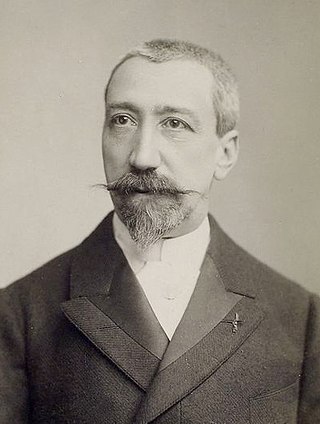 3
Anatole France was a French poet, journalist, and novelist with several best-sellers. Ironic and skeptical, he was considered in his day the ideal French man of letters. He was a member of the Académie Française, and won the 1921 Nobel Prize in Literature "in recognition of his brilliant literary achievements, characterized as they are by a nobility of style, a profound human sympathy, grace, and a true Gallic temperament".
3
Anatole France was a French poet, journalist, and novelist with several best-sellers. Ironic and skeptical, he was considered in his day the ideal French man of letters. He was a member of the Académie Française, and won the 1921 Nobel Prize in Literature "in recognition of his brilliant literary achievements, characterized as they are by a nobility of style, a profound human sympathy, grace, and a true Gallic temperament".
Andrés Guazurary
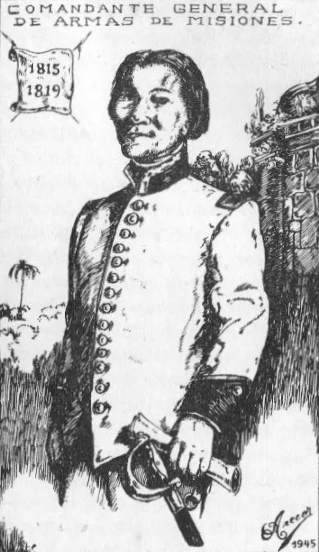 3
Andrés Guaçurary or Andrés Guazurarí, popularly known as Andresito was a caudillo of the province of Misiones, present-day Argentina, being governor of said province between 1811 and 1822. He was one of the first federal caudillos of the United Provinces of the Río de la Plata and the only one of fully indigenous origin.
3
Andrés Guaçurary or Andrés Guazurarí, popularly known as Andresito was a caudillo of the province of Misiones, present-day Argentina, being governor of said province between 1811 and 1822. He was one of the first federal caudillos of the United Provinces of the Río de la Plata and the only one of fully indigenous origin.
Horacio Quiroga
 3
Horacio Silvestre Quiroga Forteza was a Uruguayan playwright, poet, and short story writer.
3
Horacio Silvestre Quiroga Forteza was a Uruguayan playwright, poet, and short story writer.
Bernardo O'Higgins
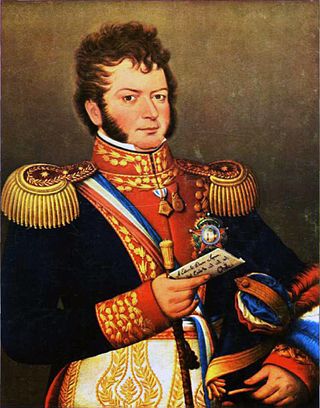 3
Bernardo O'Higgins Riquelme was a Chilean independence leader who freed Chile from Spanish rule in the Chilean War of Independence. He was a wealthy landowner of Basque-Spanish and Irish ancestry. Although he was the second Supreme Director of Chile (1817–1823), he is considered one of Chile's founding fathers, as he was the first holder of this title to head a fully independent Chilean state.
3
Bernardo O'Higgins Riquelme was a Chilean independence leader who freed Chile from Spanish rule in the Chilean War of Independence. He was a wealthy landowner of Basque-Spanish and Irish ancestry. Although he was the second Supreme Director of Chile (1817–1823), he is considered one of Chile's founding fathers, as he was the first holder of this title to head a fully independent Chilean state.
Juan Bautista Cabral
 3
Juan Bautista Cabral was an Argentine soldier, of Zambo origin, of the Regiment of Mounted Grenadiers who died in the Battle of San Lorenzo, while he was aiding then Colonel Don José de San Martín, whose horse had fallen to enemy fire. The action of Cabral in this first military confrontation of the Argentine War of Independence gave him lasting fame and a prominent place among Argentine patriots.
3
Juan Bautista Cabral was an Argentine soldier, of Zambo origin, of the Regiment of Mounted Grenadiers who died in the Battle of San Lorenzo, while he was aiding then Colonel Don José de San Martín, whose horse had fallen to enemy fire. The action of Cabral in this first military confrontation of the Argentine War of Independence gave him lasting fame and a prominent place among Argentine patriots.
Roque Sáenz Peña
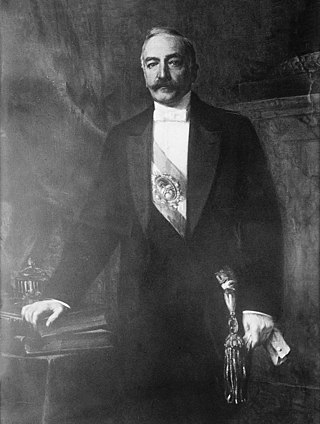 3
Roque José Antonio del Sagrado Corazón de Jesús Sáenz Peña Lahitte was an Argentine politician and lawyer who served as President of Argentina from 12 October 1910 to his death in office on 9 August 1914. He was the son of former president Luis Sáenz Peña. He was a candidate for an internal, modernist line within the National Autonomist Party.
3
Roque José Antonio del Sagrado Corazón de Jesús Sáenz Peña Lahitte was an Argentine politician and lawyer who served as President of Argentina from 12 October 1910 to his death in office on 9 August 1914. He was the son of former president Luis Sáenz Peña. He was a candidate for an internal, modernist line within the National Autonomist Party.
William Brown (admiral)
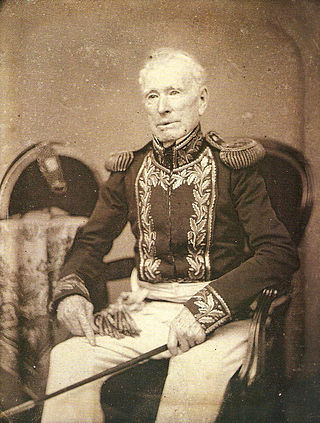 3
William Brown was an Irish sailor, merchant, and naval commander who served in the Argentine Navy during the wars of the early 19th century. Brown's successes in the Argentine War of Independence, the Cisplatine War and the Anglo-French blockade of the Río de la Plata earned the respect and appreciation of the Argentine people, and he is regarded as one of Argentina's national heroes. Creator and first admiral of the country's maritime forces, he is commonly known as the "father of the Argentine Navy".
3
William Brown was an Irish sailor, merchant, and naval commander who served in the Argentine Navy during the wars of the early 19th century. Brown's successes in the Argentine War of Independence, the Cisplatine War and the Anglo-French blockade of the Río de la Plata earned the respect and appreciation of the Argentine people, and he is regarded as one of Argentina's national heroes. Creator and first admiral of the country's maritime forces, he is commonly known as the "father of the Argentine Navy".
Domingo Faustino Sarmiento
 3
Domingo Faustino Sarmiento was an Argentine activist, intellectual, writer, statesman and President of Argentina. His writing spanned a wide range of genres and topics, from journalism to autobiography, to political philosophy and history. He was a member of a group of intellectuals, known as the Generation of 1837, who had a great influence on 19th-century Argentina. He was particularly concerned with educational issues and was also an important influence on the region's literature.
3
Domingo Faustino Sarmiento was an Argentine activist, intellectual, writer, statesman and President of Argentina. His writing spanned a wide range of genres and topics, from journalism to autobiography, to political philosophy and history. He was a member of a group of intellectuals, known as the Generation of 1837, who had a great influence on 19th-century Argentina. He was particularly concerned with educational issues and was also an important influence on the region's literature.
Steve Biko
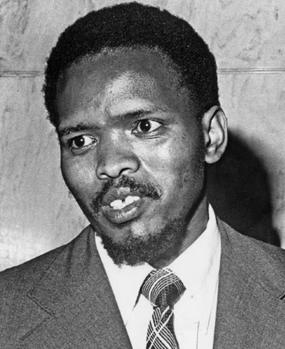 3
Bantu Stephen Biko OMSG was a South African anti-apartheid activist. Ideologically an African nationalist and African socialist, he was at the forefront of a grassroots anti-apartheid campaign known as the Black Consciousness Movement during the late 1960s and 1970s. His ideas were articulated in a series of articles published under the pseudonym Frank Talk.
3
Bantu Stephen Biko OMSG was a South African anti-apartheid activist. Ideologically an African nationalist and African socialist, he was at the forefront of a grassroots anti-apartheid campaign known as the Black Consciousness Movement during the late 1960s and 1970s. His ideas were articulated in a series of articles published under the pseudonym Frank Talk.
Samora Machel
 3
Samora Moisés Machel was a Mozambican military commander and political leader. A socialist in the tradition of Marxism–Leninism, he served as the first President of Mozambique from the country's independence in 1975.
3
Samora Moisés Machel was a Mozambican military commander and political leader. A socialist in the tradition of Marxism–Leninism, he served as the first President of Mozambique from the country's independence in 1975.
Agostinho Neto
 3
António Agostinho Neto was an Angolan communist politician and poet. He served as the first president of Angola from 1975 to 1979, having led the Popular Movement for the Liberation of Angola (MPLA) in the war for independence (1961–1974). Until his death, he led the MPLA in the civil war (1975–2002). Known also for his literary activities, he is considered Angola's preeminent poet. His birthday is celebrated as National Heroes' Day, a public holiday in Angola.
3
António Agostinho Neto was an Angolan communist politician and poet. He served as the first president of Angola from 1975 to 1979, having led the Popular Movement for the Liberation of Angola (MPLA) in the war for independence (1961–1974). Until his death, he led the MPLA in the civil war (1975–2002). Known also for his literary activities, he is considered Angola's preeminent poet. His birthday is celebrated as National Heroes' Day, a public holiday in Angola.
Mohammed V of Morocco
 3
Mohammed al-Khamis bin Yusef bin Hassan al-Alawi, better known simply Mohammed V, was the last Sultan of Morocco from 1927 to 1953 and from 1955 to 1957, and first King of Morocco from 1957 to 1961. A member of the 'Alawi dynasty, he played an instrumental role in securing the independence of Morocco from France and Spain.
3
Mohammed al-Khamis bin Yusef bin Hassan al-Alawi, better known simply Mohammed V, was the last Sultan of Morocco from 1927 to 1953 and from 1955 to 1957, and first King of Morocco from 1957 to 1961. A member of the 'Alawi dynasty, he played an instrumental role in securing the independence of Morocco from France and Spain.
464 unique persons spotted on 3004 streets